




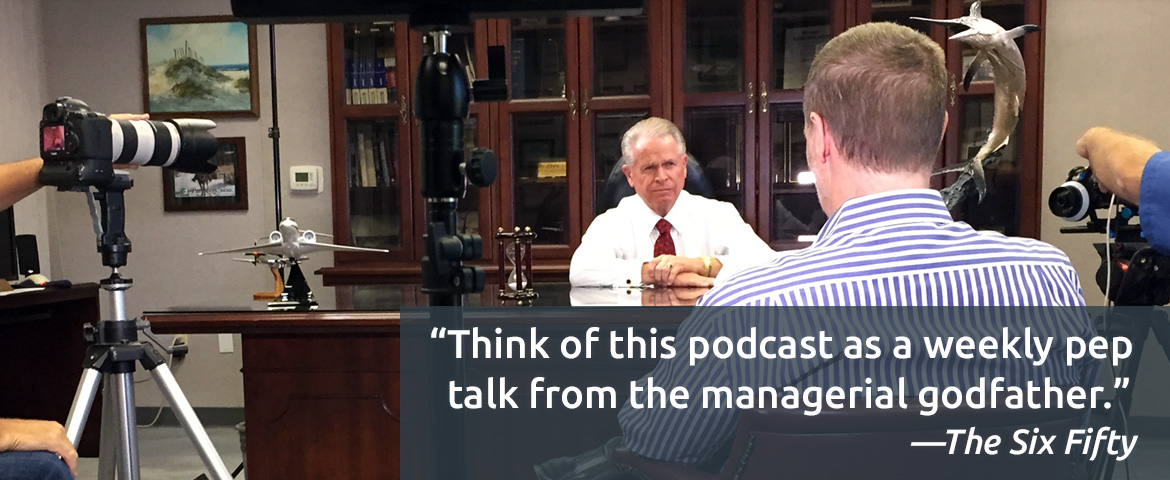
Tough Things First Podcast
The Tough Things First podcast is where you receive short bursts of Ray Zinn’s leadership, executive and entrepreneur’s wisdom. Tough Things First podcasts are typically five minutes long, giving you one important concept to ponder for the rest of the day.

Subscribe to the podcast via:
iTunes | Spotify | Google Podcasts | Stitcher | Pocket Casts | TuneIn | RSS
- May0120190

Zinn’s Law
Read moreIt’s hard to put life into simpler terms, but Zinn’s Law establishes a paradigm that’s hard to oppose.
In this edition of the Tough Things First podcast, Ray Zinn details this idea and explains why it may be helpful at any stage in life.
Rob Artigo: I’m Rob Artigo, your guest host for another edition of the Tough Things First podcast with Ray Zinn. I’m a writer and entrepreneur in California being invited back. Ray, it’s always a pleasure.
Ray Zinn: Thanks Rob for joining us today.
Rob Artigo: Well, I’ve heard you talk about Zen’s Law. For our listeners of course, what is Zen’s Law?
Ray Zinn: Well, over the years I’ve developed an understanding about there’s a time and a season for all of us. In other words, there’s a time and a place. Time to get married, a time to have children, a time to start your own company or whatever, so the time and the season is what Zen’s Law is all about.
When it relates to your earning power, when it relates to your ability to provide for your family, there’re some characteristics you need to understand.
In the first leg of your life, getting an education should take up until you’re about age 25, whether you get an undergraduate or a masters or whatever. By the time you’re 25 you’re getting educated. In other words, you’re forming the basis of your career. (more…)
- Apr242019

Setbacks
Read moreSince the day we learned to walk it seems we’ve faced setbacks and challenges. If dealt with properly, these moments helped catapult us toward success.
In this edition of the Tough Things First podcast, Ray Zinn talks discusses his own setbacks and how perseverance turned the tide.
Rob Artigo: Rob Artigo here once again, your guest host for this edition of The Tough Things First podcast. I’m a writer and investigator in California. Being invited back, always a great pleasure. Ray, hi.
Ray Zinn: How you doing, Rob? Good to be with you today.
Rob Artigo: We all know the natural order of life is that we experience ups and downs. You’ve had a remarkably successful life. We know from this podcast that you’ve been fired from jobs and you had other setbacks, failures, and disappointments, pretty much like everybody else, every normal person in the world. Let’s talk about your setbacks and how you dealt with them. Do you have a setback that stands out to you that led you to an unexpected place?
Ray Zinn: Well, you know we talk about failure as a great educator. Now we don’t want to fail just for the sake of failing. Now because we make mistakes and because we are, as they say human, we are prone to error. And rather than use, get grumpier, get upset because we have these setbacks, we should look at them as learning processes. So yes, absolutely there have been times when I’ve stumbled and had to pick myself up again. As you pointed out, I’ve probably been fired five times. Tom Peter says if you’re not getting fired, you’re not trying hard enough. So, I can say I tried awfully hard because I was fired a lot of times. (more…)
- Apr172019

Advice
Read moreMost people can relate to the idea that advice is everywhere, it’s what you do with that information that matters most.
In this Tough Things First podcast, Ray Zinn explores the advice he values most and where you’re likely to find the best advice.
Rob Artigo: I’m Rob Artigo, your guest host for this edition of the Tough Things First Podcast. Hi Ray. Good to be back.
Ray Zinn: Thanks Rob. Good to be with you today.
Rob Artigo: Well, we’ve heard on this podcast you talking about growing up early because you lost your father at a young age and we’ve talked at length about the work you’ve done on the ranch. You ever once told a story about how you at age four your mother, sent you on a task to go to the store and get eggs and milk and whatnot. Age four? Let’s talk about some of the advice that you’ve received. Any recollections stand out to you for the advice you most valued when you were growing up?
Ray Zinn: As you pointed out, I lost my dad when I was 26. I had already graduated and got married. He left nine children at home at the time when he passed away. And I had to pick up the slack there, helping my mother with the children even though they lived not around me, close wise. I had to help financially to some degree. And then mentoring my siblings. So I became actually their surrogate father. But some of the advice that I can remember that really panned out was my neighbor who was a very well educated civil engineer and very successful, told me to go into engineering. (more…)
- Apr102019

Asia and competition – from Japan to China
Read moreHas much changed with Asia and international competition? Is China in the 21st century what Japan was in the 20th?
Professor Robert Wood of San Jose State University joins Ray Zinn in a conversation about trade with Asia, then and now.
Robert Wood: Hello podcast listeners this Robert Chapman Wood. I’m professor of Strategic Management at San Jose State University in Silicone Valley, and I’m today’s guest interviewer on the “Tough Things First” podcast.
We’re building on Ray Zinn’s book, “Tough Things First” and we’re going to talk about one really tough thing today, and that’s US-China business relations.
There seems to be a real battle going on for economic supremacy between the US and China, and that actual recalls the battle I personally experienced about 30 years ago when I was a journalist in Japan. I think Ray experienced the US-Japan battle very differently, so I want to start by saying, “Ray, can you talk about how your company experienced the US-Japan battle of the 20th Century?”
Ray Zinn: Sure, and thanks a lot, Robert, for joining us on this podcast it’s a real honor to have you and your expertise to talk about this important subject.
So as I think about, of course, I hate to give away my age, but I was born during the depression era, and at the beginning of the Second World War. So I’m very familiar with what happened after the war and what Douglas McAurther wanted to do to help Japan. And of course, he got Japan economically on its feet. The way, of course, that any economics work there’s a, what they call the first law of economics, which is: Individual A benefits from Individual B as long as Individual B’s loss is less than Individual A’s gain, is considered a good economic principle. The thinking was, Japan’s going to benefit from the US helping get Japan on its feet and then because it’s a small cost to the US, but a big gain to Japan. (more…)
- Apr032019
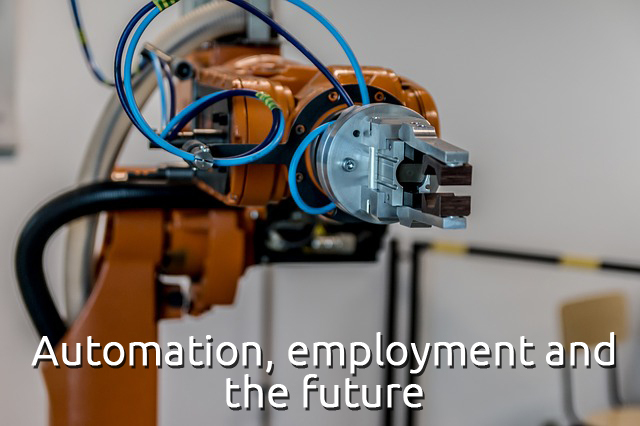
Automation and Work
Read moreAutomation isn’t going away. As the use of AI technology and robotics seize ground once firmly occupied by the working class, is there a point of diminishing returns? In this edition of the Tough Things First podcast, Ray Zinn answers questions about what the future holds.
Rob Artigo: Rob Artigo here again. Your guest host for this edition of the Tough Things First podcast. I’m a writer and investigator in California. Being invited back is always a pleasure, Ray.
Ray Zinn: Well good to be with you again, Rob. It’s always fun to have you on the program.
Rob Artigo: We appear to be transitioning from a mass employed service sector economy to a thinner employed service sector economy which is more dominated by artificial intelligence and robotics. Is that a … At least that’s the way I see it. Is that a fair assessment of what’s going on? The trends you’re seeing?
Ray Zinn: Well it’s gonna be that way. It’s been that way ever since the industrial revolution. So we’re not talking about something that’s happened the last 20 years, we’re talking about something that’s been going on for over 100 years.
Rob Artigo: Is it speeding up? Are we seeing a quickening in that area?
Ray Zinn: Well I don’t know if it’s speeding up, per se. It’s certainly continued to accelerate. If I just look at my lifetime and what has come about, we’re having to deal with more and more things and then to do that we innovate and create things to help us do it, like the computer, for example. Personal computer, actually, has given us much more capability and allowed us to be more productive than we were in the past. So I mean, people worked longer hours as a farmer, my parents were in agriculture, they work long hours because there was so much they had to get done in a day, whether it be milking the cows or feeding the cows or raising the feed for them, all that had to be done in a timely way. And you couldn’t just say, “Well I just can’t do that.” And say I’ll just shorten my day so I can have more time to go off and have fun or be with the family. So, you know, the 18 hour days were not unusual in that time period. The farmers used to get up at like 4:00 in the morning and they didn’t retire until 8:00 or 9:00 or 10:00 at night. So I mean, they barely got in six or eight hours of sleep and there was no time, as you would, for doing the fun things like going to ball games or just enjoying an evening with your family.
I think the average worker today probably (more…)
- Mar272019

Minting Entrepreneurs
Read moreEntrepreneurs develop over time through a variety of paths, but is there something different about a successful entrepreneur?
In this edition of the Tough Things First podcast, Ray Zinn and guest host Rob Arigo break down what makes a successful entrepreneur.
Rob Artigo: I’m Rob Artigo, your guest host for this edition of the Tough Things First podcast. Hi, Ray. It’s good to be back with you.
Ray Zinn: Well, Rob, you’re here again. So, good to be with you.
Rob Artigo: Time for another great conversation. We know there is a myriad of ways to get a business education; the experience and training, but is any of that, or even all of that put together, guaranteed to produce a genuine entrepreneur?
Ray Zinn: Let’s first of all talk about what is an entrepreneur. An entrepreneur is a creator, innovator, and negotiator. So if you look at it in those terms, any one of us, you included, myself included, are entrepreneurs. What differentiates an entrepreneur who runs a company and just an entrepreneur that maybe has a little backyard service, as you would, or garage service, is passion. So what differentiates entrepreneurs that are willing to make that big leap is their passion. How passionate are they about what it is they want o do? And so, that doesn’t mean they’re gonna be successful, just because they have passion. But we’ll talk about that in a minute, about what’s the difference between a passionate entrepreneur and being a successful entrepreneur. (more…)
- Mar202019

Negotiations
Read moreThe give and take required for successful negotiation stymies the stubborn.
In this Tough Things First podcast, Ray Zinn and guest host Rob Artigo discuss fundamentals of negotiating and how to be successful even when you aren’t getting everything you want.
Rob Artigo: Welcome back everyone to another edition of the Tough Things First podcast. I’m your guest host, Rob Artigo, I’m a writer and entrepreneur in California. Hi Ray.
Ray Zinn: Hey Rob. So good to be with you this morning.
Rob Artigo: I have a good question here and I think lots of people will be able to relate to it because we’ve been hearing a lot about the idea of negotiating on a national level. Donald Trump, as you know, penned a famous book called The Art of the Deal and it has been discussed a lot frequently because of the context of the negotiations with Congress to get border wall funding. Some have said that there are failures built into this that show that Donald Trump isn’t such a great negotiator after all, so as an outside observer Ray, would you agree with that? I mean just based on what you’ve seen?
Ray Zinn: I think negotiations are really a tough subject and it depends again what we’re negotiating on and how important it is to a particular individual. If for example you’re negotiating with your spouse about where you are gonna go to eat and you don’t care, then it’s not a very difficult task but if where you go to eat is extremely important and depending upon the setting and depending upon the cost, depending upon the kind of cuisine, it can be kinda heated and debated. It’s not something as simple. When we talk about negotiating, we don’t necessarily put it all in one bucket. It all depends again upon the motivation of the individuals.
In the case of President Trump and negotiating with regard to whether we do a government shutdown or whether they fund his border wall is a matter of principle and so if the one side says, “We don’t want him to have that little feather in his cap that says that he got that border wall built,” then they’re gonna resist and they’re willing to throw the baby into the fire to prove their point. Then of course President Trump on the other hand is gonna stand rigid and say, “Hey, you want to put all these people out of work? You guys go right ahead.” It depends upon what each side feels they have to lose.
Rob Artigo: Ray, isn’t it like the idea of the stakes are different, and I love this idea of talking about Congress and the president negotiating over the wall because metaphorically you could really place this on top of other issues, whether it’s business or personal like you said, even just deciding with your wife what place you’re gonna go eat, but the idea of stakes and what struck me there, what you were just saying is that in the context of this negotiation, you may find one side, the stakes aren’t the wall for both sides. The stake for Congress appears to be whether or not Donald Trump gets a “victory” and gets what he wants so if they’re trying to avoid that, if they’re trying to avoid Donald Trump getting a “victory” here, then that’s different than Donald Trump’s intent. His goal, the stakes for him is he wants to get the border wall done.
Ray Zinn: I mean, it’s a matter of victory again. He’s promised his constituents that he would build a wall during his administration. It’s a victory for him and it’s a victory for the other side if they can prevent him from doing it because they’re showing their power. Let’s see who’s really got the power and so it’s all about fighting. A negotiation is somewhat of a fight. If there’s no contest, then there’s no fight. If there’s a point to be made, then all hands on deck, they’re gonna try to make their point. Let’s be factual about this, the Congress does not love the president at all, at least the current Congress does not love president, and the president really doesn’t care for them either. He wants to drain the swamp, calling them swamp monsters is not going to sit well with them. When you go into negotiation, if both sides hate each other, negotiations aren’t gonna go very well.
The first thing that we have to think about when we’re negotiating is what kind of … Where do we stand with regard to the individuals we’re negotiating with? Whether it be a teacher strike or whether it be a particular direction we want to head the company, if there’s a team effort, in other words, if we’re trying to negotiate the best outcome and the team basically like each other, then negotiations go relatively smooth. There’s compromises that will have to be made, but it will be a rather smooth transition whereas if there’s animosity and if there’s hard feelings, negotiating is not gonna go well, period. The best way if there is animosity, if there is hard feelings between two parties or multiple parties, then what we have to do is figure out what kind of compromise can be made where both parties walk away smiling. In other words, there’s give and take.
I think we saw a little bit of this recently when the bill was put before the president to sign that Congress passed, Congress and the Senate passed for overcoming the government shutdown and then they gave him 1.4 billion for the wall. They didn’t give him much for the wall, but they avoided a government shutdown, another government shutdown. That was a compromise, so if you remember, the Democrats or Nancy Pelosi said we’re not gonna even give him a dollar. They gave him more than a dollar, they gave him 1.4 billion dollars. He got something, he just didn’t get what he wanted so they declared the victory, the Congress says, “Okay, we were victorious because he didn’t get what he wanted, he didn’t get five point whatever billion for his wall,” and we also avoided a government shutdown. Trump says, “Well, they gave me more than a dollar,” and so he declared victory and avoided a government shutdown.
That’s kind of the way compromises are done. Both parties take a victory lap and smile. They may not get exactly what they want but in any negotiation, I don’t know if anybody gets exactly what they want, whether you’re buying a car or whether you’re buying a home or you’re sitting on negotiating a price and both sides are trying to get the best deal for them. You’re never going to get everything you want. When you go into negotiation, the first thing you must ask yourself is where do I draw the line? In other words, how far am I willing to go and we all do that. We all say I’m not gonna pay any more than this or I’m not gonna accept any more than that and so they’ve already set their bottom line and then they try to work towards something where both of them end up not having to cross their bottom line.
That’s the key to negotiating. You go in with the idea of a resolution. If you’re going into a negotiation [inaudible 00:08:59] we don’t want a resolution, then just walk away. Just don’t even go any further. If a resolution is being sought, a true resolution is being sought, and your bottom line, you’ve accepted, in the instance here of President Trump, he said, “I’m gonna get more than a dollar.” That’s kinda what he told himself. “If I can’t get more than a dollar, we’re gonna shut the government down.” The other side says, “Well, as long as we don’t fund anything anybody could say was an appreciable amount of what Donald Trump is asking for, then we can take a victory lap because we avoided a government shutdown and at least he didn’t get all of his money to do what he wants.” They changed the name from wall to fence and some other ridiculous things, and that’s how stupid negotiations actually get sometimes. They actually get that way, where people act stupid and silly. That’s unfortunately the way compromise works sometimes is that you make silly compromises.
Rob Artigo: I guess from what I’m hearing you say and then the example of Congress and the president is that it was important, it was more important to break the logjam or the impasse that they were facing than to get the perfect deal on either side.
Ray Zinn: They were avoiding a government shutdown is what they were avoiding. They said, “Okay, what can we do to avoid a government shutdown? Well, we gotta give Donald Trump more than a dollar,” and Donald Trump says, “I’ve gotta get enough to say that I can at least build something of a wall, 58 miles,” and so that’s what they did. In the back of his pocket, he’s been saying this for some time, that he’s just gonna invoke a presidential … Make a presidential decision and declare an emergency. He always had in the back of his pocket and he knew he wasn’t gonna get five plus billion because the other side would have lost. In other words, they would not have been able to take a victory lap. He’s been gearing up to do this emergency declaration. That’s kinda what’s happened and that’s what we do in negotiating. We make compromises and move forward.
Rob Artigo: As always, you can reach out to Ray Zinn with your questions at ToughThingsFirst.com. Continue your education in this conversation with all the podcasts, Ray’s blogs, links to the information about the book Tough Things First and Ray’s new book, The Zen of Zinn, a collection of writings on interrelated topics of entrepreneurship, leadership, management, discipline, determination, society, people, and life, that’s The Zen of Zinn. Thanks again Ray.
Ray Zinn: Hey thanks Rob. It’s always fun to talk with you.
- Mar132019

Managing Multiple Generations
Read moreManagers today might lead teams with Baby Boomers and Generation-Z members. How does a good manager lead such a diverse set of employees?
Guy Smith: Hello and welcome again to another episode of the Tough Things First podcast, a weekly dive into management leadership and a bit of Silicon Valley as well. I’m your host this week, Guy Smith, and I’m going to dive into a topic here that I personally find fascinating. This may not have happened before in our society, but we’re at a point where we have four different generations active in the workforce right now, the Baby Boomers, Generation X, the Millennials, and Generation Z is just now entering the workforce.
In Silicon Valley, we’ve got an eclectic mix of young turks and gray beards, so Silicon Valley is a good place to kind of think about how you lead such radically different people, and who better than to ask than the longest-serving CEO in Silicon Valley. That’s of course Mr. Ray Zinn, and how are you today, Ray?
Ray Zinn: Well good, Guy. I’m trying to get over a cold, but we’re managing our way through it. This is an interesting topic that you’ve got today. So let’s kind of dive right into it.
Guy Smith: Yeah, I’m really fascinated by this because from a leadership standpoint, from an organizational policy standpoint, there are a lot of different parts of the fabric that are tugging against each other. So let’s start with the extremes. The Baby Boomers are on end and we’ll stop with the Millennials at the other end for the time being. For me, contrast the motivational differences you see between Boomers and Millennials. What is it that they respond to differently in an organizational setting?
Ray Zinn: Well one advantage that I have of course is that I’ve been able to span at least three of those generations. I don’t know if you consider me a Baby Boomers but I did come out of the second world war where I was just a youth. And my grandparents, which would be in the pre-first world war, they had a different environment they were in. Horse and buggy was still the fare, as you would. Cars were just coming into being. The way people traveled, the way they moved together as families, was entirely different than it was for me when I grew up. I grew up, basically our families were all kind of together and we didn’t move anywhere. I mean, we stayed in the same spot. So our cultural differences were minimal and there wasn’t the huge immigration issue that we face today, with a more diverse society. (more…)
- Mar062019

Say NO to NO
Read moreSelf help gurus may entice you to learn to say no, but is that going to really get you anywhere in business?
In this Tough Things First Podcast, Ray Zinn says YES to answering the question.
Rob Artigo: I’m Rob Artigo your guest host for this edition of Tough Things First, the podcast with Ray Zinn, the longest serving CEO in Silicon Valley. Hello, again, Ray.
Ray Zinn: Well, good to have you again with us, Rob. You’re always a delight to talk to and have you on these podcasts.
Rob Artigo: Thank you, Ray. This idea of learning to say no has a lot of supporters. It’s out there. I’ve seen it in several forms. I know that somebody’s famous for having written whole books about it. These supporters of you’ve got to learn to say no, say we should learn to say no. Many of us, apparently, don’t have that skill, so we need to learn it. Do you buy that idea?
Ray Zinn: On the surface, no. Some of the people that I know that have written on this subject really never have run a company before. I think this whole notion that you should just say no is just a cop-out and I don’t buy into it. It’s, I think, somebody just trying to sell some books or just trying to sell a notion because it tingles in their ear. So if you’re a person who would like to say no, you’re going to say no anyway, you don’t need somebody to tell you just to learn to say no. It just made you feel better for somebody to say, “Just say, no.”
And so, to me, it’s really the people that buy into it are the ones who believe in that concept, and I’m not sure we’re going to change anybody’s mind when we talk about the concept of just say no, but for those of you who also adopt out feeling on the subject, that just saying no is not a good thing because you don’t know how it’s going to impact the other person. No one likes to hear no, no one. This notion that somewhere there’s a new paradigm out there for everybody learning to say no, I think is a harmful thing. (more…)
- Feb272019
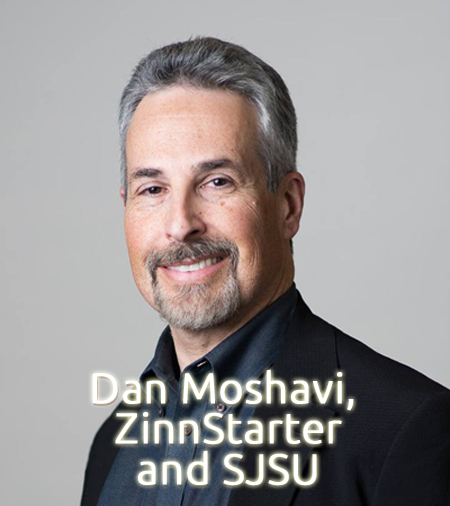
Education for Entrepreneurs
Read moreDan Moshavi, the Dean of the Lucas College and Graduate School of Business at San Jose State University, chats with Ray Zinn, the longest serving CEO in Silicon Valley, about entrepreneurship education, what classes are important for entrepreneurs, why passion is critical for them, what are the key lessons of entrepreneurship they should embrace, and the mission of Ray’s ZinnStarter program.
Ray Zinn: Welcome again to one of our great podcasts, Tough Things First. Visiting with me today is Dan Moshavi, who’s a dean of the Lucas College of Business at San Jose State University. So Dan, thank you for, again, joining us. I’m sure we’re gonna talk about education one more time.
Dan Moshavi: Absolutely, Ray. It’s my pleasure to be here, and thank you for inviting me into this mix and for sharing your wisdom with not only our students, but around general business education issues. As you know, San Jose State’s one of the largest business schools in California. We’ve got 5,000 students on campus. We have a robust and growing entrepreneurship program. And, as the only public university in Silicon Valley, we really are a key player in powering this valley. We have tens of thousands of alumni working here. They build successful careers here, including … We have 800 alumni members of our chief financial officer network who are current or former CFOs in Silicon Valley. And, many of our alumni have also been successful entrepreneurs. And, I know that entrepreneurship is near and dear to your heart, Ray, and your ZinnStarter Program is certainly a testament to that. So, I’d like to get your thoughts on entrepreneurship education today, if I can.
Ray Zinn: No problem. In fact, my last CEO … CFO, I’m sorry. My last CFO at Micrel, Bob [DeBarr 00:01:59], he’s since passed away, God rest his soul, was a San Jose State graduate, got his master’s at San Jose State. So, that was my last CFO before we sold the company.
Dan Moshavi: That’s great. Thanks for sharing that. Let’s dive into entrepreneurship education a little bit. So in your view, what are the most important courses a student interested in entrepreneurship should take?
Ray Zinn: Oh, this is one of the most favorite questions I get asked. And, it’s so important because they’re classes with principles. The first one is economics. Economics is a very broad field, but understanding and learning economics, and how the various components of economics apply to business, are very important. Second, is accounting. As a CEO or an entrepreneur, you can’t run your business unless you understand accounting. And, accounting is just a very complicated, but, yet, very worthwhile field for them to learn and understand. Transactions, learning general ledger, understanding how the cash flow statement’s put together, balance sheet, income statement … They’re so important. You can’t even be a board of directors in California anymore, maybe across the country, unless you understand accounting. (more…)
- Feb202019

Setting Expectations
Read moreHow does, and how should, a business leader set expectations for employees?
In this episode of the Tough Things First podcast, Silicon valley’s longest serving CEO discusses the public and private motivations employees have, and what a leader needs to consider.
Guy Smith: Hello again, and welcome to another episode of the Tough Things First podcast. I’m your guest host today, Guy Smith and it’s like always a pleasure to be back here with my buddy Ray Zinn. Good morning Ray. How are you doing today?
Ray Zinn: I’m doing just fine Guy, so good to be with you again this morning.
Guy Smith: Well, fantastic. And now we’re on opposite sides of the country I can only imagine what weather over your way is. Out here in North Carolina it’s about as beautiful as beautiful gets.
Ray Zinn: It’s beautiful here too, but probably a difference in temperature maybe.
Guy Smith: Well the leaves are turning here, so everything is looking very very wonderful.
Hey listen, what I wanted to talk to you today about is setting expectations among employees, communicating with employees about the ever shifting goals and objectives that are likely with inside of teams, because you know businesses are in dynamic environments, everything’s constantly in a state of change, and employees have, you know certain expectations that come and go over time. And that’s what I really wanted to dive into because I’ve got to imagine that that’s one of the more personal but also possibly intricate and tedious tasks that a leader has to deal with managing the expectations of a team.
You know, so for our budding entrepreneurs who make up a large part of your audience, what are the kind of employee expectations that they really need to be managing? What are the ones that, you know are going to be most important in keeping teams happy, motivated, innovating, and doing the right job?
Ray Zinn: There’s two components to it. One is reality, in other words what is the way things are, the business climate. For example, just in the last week or two, the stock market has really been going down, down, down, so the expectation is that the market will continue to go up, and up, and up, and up, and up but that’s unrealistic. What comes up must also come down. (more…)
- Feb132019

Automation and Customers
Read moreAutomation could be a good thing for a company, but transparent cost cutting that frustrates your customers may backfire.
Ray Zinn explores the value and risks of automation in this edition of the Tough Things First podcast.
Rob Artigo: Rob Artigo here once again, your guest host for another edition of the Tough Things First podcast. I’m a writer and a researcher, an investigator in California. Being invited back always a pleasure. Ray, how are you doing?
Ray Zinn: Good, Rob, it’s always good to have you on. You’ve got a good way of leading these podcasts, and so you’ve got a real talent for it. Appreciate having you back on the program again.
Rob Artigo: Thanks a lot, Ray, and obviously it’s great to be able to pick your brain on a lot of these matters. I find it fascinating, and when I listen to the other podcasts that are done by the guest hosts, I always learn something, so I appreciate it.
Ray, you’re not only known as a well-respected very successful entrepreneur, but you’re also an inventor and innovator. You came up with the wafer stepper, which changed Silicon manufacturing. Let’s talk about those kinds of advances in the context of businesses choosing new automation platforms, and maybe doing away with older methods. And I hate to say going from a buggy whip to automobile or something like that, but every new year, and it’s about that time to start thinking about it, every new year seems to bring advances in automation technology. So, what does it mean for businesses to consider automation when you have a lot of options but it can be costly?
Ray Zinn: Automation does two things. Number one, it increases product quality, or should increase product quality and consistency. And it also, of course, allows us to go beyond where we were before. I know that when I invented the Waver Stepper it allowed us to go to really deep geometries. Very, very small chip sizes, as well as features. So, it really improved performance dramatically and continues to do so.
So, sometimes automation is done just to reduce cost. Now, that’s the more difficult one, because people’s jobs and lives are impacted when we have automation to reduce cost. Now, sometimes we reduce cost and that’s at the expense of quality. Sometimes what we try to do is get more output and automation increases the output but also reduces the quality.
So, there’s all kinds of automation. There’s what they call AI automation, which is artificial intelligence, which allows cars to be self-driven without having a passenger or a person behind the wheel manipulating the controls. And so there’s the issue about, well, what’s that going to do to safety? Maybe a person is more alert and can see things that maybe not all the little sensors in the car will know. And in fact we’ve known that there’s some people that have been killed when they went to these self-driving cars.
So, there’s that aspect of it. The better the automation is in the way of not only improving safety, but improving quality and reliability, is good. But if it’s just there to cut costs, that’s not always a good thing.
Rob Artigo: And the cutting the costs is one of the reasons why some businesses have chosen to go with almost an automated customer service. And you mentioned artificial intelligence, and one of the aspects of artificial intelligence, or the early stages of it, is you have a video screen or something with an automated person on there, automated image of a person on there. And then you’re interacting or talking to that, and then punching in numbers. And you’re not really interacting, engaging, with a real person.
I suppose that when you deal with the type of business that it has always been traditionally a human interaction between your business and the customer, that an overstep in automation could push you into a zone where you really end up losing that relationship that you’ve always wanted to have with your customers.
Ray Zinn: Like you, I’m probably bombarded with 50 to 60% of my phone calls are all automated, meaning they’re just dialing my number and then it does a pause while they then connect me with a person, or it’s just a recording. Those are very irritating, and so to me, I won’t deal with companies that use that sort of contact, when it’s fully automated. And you know how irritating it is by the way when you call a service and you’ve got to punch five different numbers in before you get a real person to talk to you.
If it’s regarding a delivery, press one. If it’s regarding this and another, press two. If it’s another, press three. I hate that. And so some forms of automation to me have actually reduced my belief that that company has a quality operation.
Rob Artigo: I had a recent experience, as you were just saying there, I have a couple of power poles on my property. And I had to call the local municipal utility to tell them that a guy wire that was holding one of the poles up had snapped off out of the ground. And I don’t think there was any immediate danger, there were other guy wires holding the pole. But obviously they want to know structurally if the system is sound and everything is working on. And I had to call and tell them that there was a broken guy wire, and navigating the voice system to get to the right person ultimately was, I said, “Problem with a power pole,” and they sent me to emergency line because it was a down wire thing. And I had to say, “Well no … it’s not.”
If they had listened to my suggestion, it would’ve been, “Take me to somebody who can schedule a person to come out here and look at this in their appropriate time.” But it wasn’t an emergency. Ultimately, my relationship with that municipal utility is unaffected, because I need them. They’re going to be here no matter what, I don’t have a choice with the utility.
But, I also have a negative opinion now of having to deal with them, because it was so impossible to deal with navigating their phone. Their voice phone interactions, and that’s one of the examples that when you have a business that deals with the public, and you force them to go through all the automation, you stand the risk of really losing your reputation as being a customer service-oriented organization.
It must be a tough decision for a business operator to decide when to make that move.
Ray Zinn: Yes, and you know, they primarily do it because of cost. In other words, they’re just trying to reduce head count, and so they’ll use as much automation as you can to cut the cost. I remember recently with an internet problem, it took me forever and I was on hold forever before I could talk to a person. And I said, “What’s the problem here with your service?” And they said, “Well, I’m one person, and I’m now the only human interface for the entire company.” And this is a company that has tens of thousands of customers.
So, their quality of service dropped, but they’re trying to cut costs. It depends again what the automation does. In the case of the Wafer Stepper that I invented many years ago, this has helped industry, it’s been a positive. And so if automation is a positive, then I think it’s a good thing. If automation is a negative, then obviously it’s a bad thing. And we’ve been talking mostly about automation that’s negative as opposed to automation that’s positive.
Most of the car manufacturers now, a whole lot of it is done automatically, there’s not a person that interfaces with that car, except maybe in the final inspection. Maybe even then, it’s done by automation. So, there are areas where automation has basically taken over the entire manufacturing of a product. But it’s the automation where it’s interfaced with customer service, is where I think we have the most difficult, because we know the company is just trying to cut costs, and they’re really not here to help service their customers.
Rob Artigo: Well, thank you again, Ray, appreciate it.
Ray Zinn: Appreciate being with you, Rob.
Rob Artigo: You can join the conversation at thoughthingsfirst.com. You can ask your questions, you can put your comments in there. They’re always welcome. Ray loves to hear from you, you can follow Ray Zinn on Twitter, Facebook, and LinkedIn. And of course, get the text of Ray’s books. He has two, Tough Things First, and of course, the Zen of Zinn. Thanks Ray.
Ray Zinn: Thanks Rob.
- Feb062019
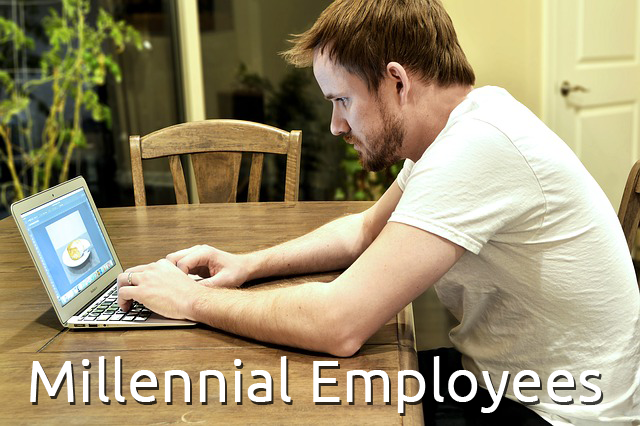
Managing Millennials
Read moreHow do front-line managers deal with millennial employees, who have a much different outlook on business+society than previous generations. Ray Zinn, who has led employees from boomers to millennials has some thoughts.
Guy Smith: Hello once again, and welcome to the next episode of the Tough Things First podcast, where we get to chat with Ray Zinn, the longest serving CEO in all of Silicon Valley. And today we get to talk about managing and leading millennials. I am on the tail end of the Baby Boomer generation, I’m looking at the millennial generation and I’m grappling with how I would lead, manage them on a day to day basis. And Ray has spent 50 years in Silicon Valley, 37 years leading his own company, he has managed everyone from grandparents to young interns who are still wet behind the ears, so let’s dive right in, and talk about millennials who now make up 30% of the population, and you lead and manage them.
Good morning, Ray, I trust everything is well with you today.
Ray Zinn: It is, Guy, and I hope you’re having a wonderful New Year.
Guy Smith: Oh man, everything looks … looks bright and optimistic from this side.
Ray Zinn: Well that’s great.
Guy Smith: Let’s talk about millennials, they’re different than their parents are, that’s for sure. And a leader is going to have to deal with the Boomers, the Generation Z that’s coming up, but the millennials seem to be intrinsically different than what we’ve had before. So from an employee standpoint, what’s particularly different about people who were born in the 80s and the early 90s, in terms of how you lead them, how you manage them, what their expectations are?
Ray Zinn: Well as we’re seeing, they’re socially more active. In other words, they tend to have a different view of life, and what it’s all about. My granddaughter came over for Christmas, and she’s 17, and she was wearing these jeans that had these holes in them. And I said, “Kirsten, I mean, can’t your parents afford to buy you nicer clothes?” And she says, “Grandpa, this is a fashion.” And I says, “Fashion with holes in them?” And she says, “Yeah,” she says, “This is the fashion.” So I said, “Well why do you wear them with the holes in them? Why is that the fashion?” She says, “I don’t know. It’s just that that’s what my friends are doing, and that’s what they wear.” (more…)
- Jan302019

Finding Startup Partners
Read moreThere are good partners, and the other kind. Pick your startup partner well and your odds of success skyrocket. Here is how.
Guy Smith: Hello, everybody, and welcome to another episode of the Tough Things First podcast where we get to have a conversation with Silicon Valley’s longest serving CEO, Mr Ray Zinn. And I’m going to find this one interesting, because I’ve got a little insight into the story and I’ve seen so many startups in Silicon Valley that come and go, and some interesting tensions that can exist, and it’s all because most startups happen through a simple partnership. In Silicon Valley, the traditional story is that one business oriented person teams up with one techie. They go into their garage and they try to invent something slick. That’s the partnership and it happens all the time in Silicon Valley. And so, choosing your partner, whether you’re the techie looking for the business guy or the business guy looking for the techie, or something more complex than that arrangement, you need to pick a good partner because if you don’t it probably won’t last.
So Ray, good morning to you. I’m anxious to talk to you about this. How are you today, sir?
Ray Zinn: Doing well. Thanks, Guy. Hopefully I’m over my cold by now and be able to move right along. So interesting subject you’ve pick today, Guy.
Guy Smith: Yeah, and I’m gonna start off just really personal. Tell us about Warren, your partner. You guys were, well, not to put too fine of a point on it, you guys were kind of different.
Ray Zinn: We were called the odd couple. We were totally different in every respect. I was more of a business person and Warren was a very tech guy, techie guy. He dressed like a techie guy. He never wore the same pair of shoes to work. He’d have a different pair of shoes on every day, not even the same matching shoes I should say. And I ask him why he didn’t at least have matching pairs of shoes and he said, “Well,” he says, “I lose one, so I just couldn’t find it and I just put on whatever was there.” He says, “All I need is [inaudible 00:02:55] to cover my feet.” So he didn’t care whether the shoes the matched, or what …
In fact, it was really funny. I gave him a watch one time, a digital watch. And so, I noticed that after about a year the watch quit working. And I said, “Why don’t you get a new … put a battery in that watch.” He says, “Why?” I said, “Well, because it’s not working. You wear it like a watch but you don’t … it’s not functioning as a watch.” He says, “Well, it’s correct twice a day.” And I said, “Well, yeah. Okay, fine. But why do you wear it if it’s not working?” And he says, “Oh, well, at least it looks like a watch.” So, I mean, he was just different that way. And we got along very well because he didn’t jump in my arena and I didn’t jump in his arena, so we didn’t argue. We didn’t have different points of view about how to run the company and that really helped out. (more…)
- Jan232019

Entrepreneur Decisions
Read moreHow should entrepreneurs make decisions? Ray Zinn, the epitome of Silicon Valley entrepreneurship discusses the rigors of starts decisions.
Guy Smith: Hello again, and welcome to another episode of the Tough Things First podcast, where we engage Ray Zinn, the longest serving CEO in Silicon Valley. And we talk about entrepreneurship, leadership, executive management, and a little bit about society and how we all get along in life.
But today we’re going to have, I think one of the more interesting topics for my mind, and that’s the art of decision making for entrepreneurs. Because in my time in Silicon Valley, and nurturing a lot of startups myself, I have seen entrepreneurs absolutely lock their brains in trying to make some fundamental decisions and Ray, he doesn’t seem to have a lot of problems with making quality decisions quickly. So, we’re going to figure out how he does it.
So Good Morning Ray. Welcome again. Thank you so much for taking time with us.
Ray Zinn: Well, thank you guys. Good to be back with you today.
Guy Smith: An entrepreneur or somebody launching their own business, they have to make thousands of decisions. I mean, that’s pretty much their job is to make a lot of decisions, make them quickly, make them with a certain amount of quality. And yet a lot of guys and a lot of women, they kind of freeze up, especially on some of the big decisions. What is it that causes people to freeze, and not make the decisions that they need to make?
Ray Zinn: Well, Tom Peters in his book, In the Pursuit of Excellence, talks about ready, aim, aim, aim, aim, aim, and never fire. What we need to do, as Tom says in his book, is ready, fire, aim. That seems kind of counterintuitive, but back in the days when we had the battleships and destroyers, they would fire for effect. In other words, you would shoot a round off and see where it went, high or low. (more…)
- Jan162019

China and Intellectual Property
Read moreRelations between China and the United States is fractured by theft of intellectual property. Ray Zinn, the longest serving CEO in Silicon Valley discusses the what and hows of the dispute and options for dealing with it.
Guy Smith: Welcome again to another episode of the Tough Things First podcast. I’m your guest host today, Guy Smith and as always, we’re chatting with Ray Zinn, the longest serving CEO in Silicon Valley and the founder of Micrel semiconductor. One of the things I want to talk with Ray about, very important subject, is the interaction of the world economy, especially the United States and the technology industry with China. China has a long reputation for, how shall we say this? Misappropriating intellectual property and specifically that being a problem with their long term mission of basically taking over electronic manufacturing from the ground up. First things first. Hello Ray. How are you today?
Ray Zinn: Doing fine. Appreciate you being with me today Guy. Thanks.
Guy Smith: I always enjoy having these chats with you. First, let me find out. What have you witnessed? You founded and ran Micrel for 37 years. You were in the semiconductor industry even before then. What have you witnessed about China and their process for acquiring intellectual property from other countries, especially within sight of semis?
Ray Zinn: Okay. Let me get a little history here. Back in 1975 when I was at Electromask, I invented the wafer stepper which is a piece of equipment to allow semiconductors to be photolithographically imaged on a wafer providing a much higher resolution and much more accuracy and allow the geometries to go to much, much smaller by using the wafer stepper, which is, by the way, the most dominate piece of equipment to … Used in the industry today, to manufacture semiconductors. Back in, oh, I’m going to say, mid 80s, late 80s, I hired a fellow who used to work in Hungary, back when it was part of the Soviet Union, and he told me, I’m hearing this directly just from him, that Russia had secured a piece of that semiconductor equipment they called the wafer stepper, through Austria and they just began to copy it and replicate that piece of equipment. (more…)
- Jan092019

Entrepreneur Resolutions
Read moreRay Zinn, Silicon Valley’s entrepreneurship godfather, covers some New Year resolutions entrepreneurs should make and keep.
Guy Smith: Hello everyone, and welcome to another episode of the Tough Things First podcast, where we pick the brains of Ray Zinn, the longest serving CEO in Silicon Valley, and the epitome of entrepreneurship with insight of the Valley. Good morning Ray, how are you doing today?
Ray Zinn: Doing great Guy. Thank you again for putting on this podcast with me.
Guy Smith: Oh man, I always love doing this, and I think today’s going to be special. We’re timing this particularly for the New Year, because we want to encourage all the entrepreneurs in our audience to make some resolutions. Entrepreneurs probably should make resolutions for themselves, for their company in the new year. And just like personal resolutions, it’s something that you need to focus on for the entire year, and to stick to it. So let’s jump right into that. Why should an entrepreneur make New Year’s resolutions for their company?
Ray Zinn: Well, I don’t think the problem is making the resolution, I think the problem is executing on that resolution. So that seems to be the trick, is not just making a resolution, because we can all say, “Oh, I’m going to lose ten pounds, or I’m going to do this or that, do more exercising, or whatever.” But, until you actually have an execution program to go along with your resolutions, they’re for naught. That’s not my feeling anyway.
Guy Smith: Well, it’s funny you mentioned it that way, because statistically most gymnasium memberships are sold in January, and people are really gung-ho about their New Year’s resolution, and most people who buy a new gym membership, are never seen again after January 31st.
Ray Zinn: Well, I’ve even heard that even … that if you even keep 10% of the resolutions you make, you’re at 90% level of the population. So at least 10% of them are not even keeping any of it, so just 90% only keep about 10% of their resolutions. So the key is, not just to make the resolution, it’s to also execute on it. And I think that’s the key thing, Guy. I know that you want to talk about some of the various resolutions that we should make, but I’d like to talk about executing, and there’s actually having a program to execute on your resolution. (more…)
- Dec192018

Employee Fear
Read moreHard times are bound to come for any company and that uncertainty can be a real struggle for employees.
Ray Zinn has employed thousands over his career, and in this edition of the Tough Things First podcast, he talks about having the courage to meet that challenge honestly.
Rob Artigo: I’m Rob Artigo, your guest host for this edition of the Tough Things First podcast. Hi, Ray, it’s good to be back.
Ray Zinn: Thank you, Rob. Good to have you with me today.
Rob Artigo: Well, Ray, the changing workforce picture can almost always be expected to lead some employees to exist in a kind of state of fear: fear of losing a job, getting passed over for a raise, not getting a promotion, that kind of thing. What is the main problem here as an employee manager when dealing with this problem?
Ray Zinn: Yes, good point because GM just announced they’re going to lay off thousands of people as they restructure their company and focus more on hybrids. Any time you announce that there’s going to be a restructuring or that the employees sense business is not so good, they’re going to fear losing their job. Fear is probably one of the most important and most fundamental issues that managers face with their employees because it’s frightening. Fear is something that we all dread, and we have a difficult time dealing with, so it is a concern.
I remember at Micrel, we had probably five different times that we had to cut back. We had to go to shorter work weeks, or we had to reduce salaries for a period of time. And of course, that freaks out everybody because their livelihood is being impacted. And I know you went through that same thing a few years ago when your company was sold.
And so, it is a fearful thing. Bad health is fearful also, or a family member that’s got health issues, and it’s very, very disruptive. So to deal with fear, of course, whether it be health or family problems or financial issues or losing your job or potentially losing your job, or getting passed over, you just have to keep a proper perspective. And so as they say, for every dark cloud, there’s a silver lining, so you just have to kind of weather the storm as they say. You know, there are the bright sunny days, and then there are days that are cloudy and full of doom and gloom. As the saying goes, these things too shall pass. So you have to have a perspective that things work out for the better. That’s the optimist, right? (more…)
- Dec122018

Writing the Check
Read moreIt is not always easy to decide when to authorize big company purchases, but you can take steps to ensure when you do it’s for all the right reasons.
In this edition of the Tough Things First podcast, Ray Zinn discusses his personal experience with due diligence.
Rob Artigo: Welcome back to another edition of the Tough Things First podcast. I’m your guest host, Rob Artigo. I’m a writer and entrepreneur in California. Hi Ray.
Ray Zinn: Hi Rob. Good to be with you again.
Rob Artigo: Well no matter the size of the company, purchases are part of just doing business. Companies always end up having to buy something, and it could be pens or it could be machinery. Sometimes those checks could be pretty big, and I understand the way you operated as CEO of Micrel for 37 years was that you were considered a penny-pincher, weren’t you?
Ray Zinn: Well, I don’t know if a penny-pincher was right, but I guess somebody thought … I guess depending on who you talk to, they thought I was maybe a little bit of a Scrooge.
Rob Artigo: Yeah. But you had a reason for that. You didn’t think of yourself as being a Scrooge. From what I hear you saying is, you would deny the label … if anybody said to you you were a penny-pincher, you would say no. You had some other … what would you call yourself?
Ray Zinn: I’d say I’m just a frugal person. I’m careful about how I spend the company’s money. It’s not that I’m being a penny pincher or Scrooge, it’s just I wanted to make sure that they had an equal number of pros and cons. In other words, when I get a request for purchase, oftentimes, all it has on it is the item name and the amount of the purchase, but there’s no justification with both equal number of pros and cons. If you have pros, I want five cons. In other words, there’s got to be an equal number of reasons why you don’t think it’s a good idea, and then let me decide. Don’t you decide for me, worried that I’m going to figure out, “Oh, if he sends me 10 pros and two cons that someone out there sent you a fantastic deal.” (more…)
- Dec052018

Holiday Productivity
Read moreThere is no time like the holidays when employees and management alike tend to think about anything but work. In this Tough Things First podcast, Ray Zinn is quizzed on dealing with employee seasonal distractions. The give and take of making it through the holiday hump.
Rob Artigo: Rob Artigo here, your guest host for another edition of the Tough Things First podcast with Ray Zinn. I’m a writer and entrepreneur in California. Well, being invited back is always a pleasure, Ray. How you doing?
Ray Zinn: I’m doing fine. I hope you’re enjoying your day today. And it’s always good to have you, Rob.
Rob Artigo: I found a column on US News and World Report online. It was actually a column that was originally published by Associated Press and picked up by the paper. So this is the way it goes. “The holiday season can be a motivation and productivity killer at some small businesses,” it says. “Staffers may spend time chatting or shopping online, ask to leave early for children’s holiday events, or just not be in the mood to work.”
It also says, “The companies with the most holiday problems are likely to be the ones where November and December aren’t a particularly busy period,” and so we’re not talking about that retailers, and the restaurants, and the caterers, and other companies like that where staffers understand when they’re hired that this is a prime time for the type of work they’re going to be doing.
At any company though, if employees are distracted, the owners of course find it, it’s difficult to be flexible with the employees when you got to accommodate everything. I suppose, Ray, in your many years of experience, 37 years at Micrel, that you had to deal with, well if it was 37 years, it was likely to have been something like 37 Christmas/holiday cycles. So you’ve dealt with this a lot. Is this something, in your experience, that has been a problem historically?
Ray Zinn: Well, it’s only been a problem, I think, in the last 20 some years. That wasn’t really a problem before that, but in the last 20 something years, it has become more of a problem, especially as people expect more and they expect, by the way, to have time off during the holidays. It used to be the employee worked around the problem and now they’re expecting the employer to work around the problem. (more…)
- Nov282018

Organizational Frugality
Read moreRay and his former CFO Robert Barker discuss the value of rational corporate frugality and how to achieve it.
Ray Zinn: Hello, everyone. It’s sure good to be with you this beautiful day here in California. With me today, I have my ex-CFO and good friend, Robert Barker, who has decided that he could like to join me in this podcast to talk about organization frugality and just how you keep your company running and fine-tuning as you would. This is a special podcast, I think, for Tough Things First, and it’s just a delight to have Robert with me this morning. Thanks for coming, Robert.
Robert Barker: Thank you, Ray. Thank you for having me. It’s always good to work with you. I’ve always said that you were the easiest boss that I ever had, and as a CFO, we need to watch spending, and that’s one of the things that can really stress out a CFO, and you would say, but when we were together, the six years that we worked together and when I was a CFO, we grew the company 10X to 200 million dollars, and during that time, we spent a lot of money, but I was always comfortable with the way we did it, and maybe you could start by just talking about your definition of organizational frugality.
Ray Zinn: Thanks, Robert. Well, there’s a funny story told about me that I would have a shoebox in my drawer and that I’d hand out the money one dollar at a time because I was considered to be so cheap, but I don’t think it’s cheap. I think it’s just being frugal. Right, Robert?
Robert Barker: Yeah, exactly. (more…)
- Nov142018

Is Entrepreneurship for You?
Read moreEntrepreneurship isn’t for everyone, but it is possible for anybody.
Ray Zinn, Silicon Valley’s longest serving CEO and the model for entrepreneurship, discusses why you might – or might not – want to be an entrepreneur.
Guy Smith: Well, welcome to another episode of the Tough Things First Podcast and it’s no surprise to our loyal audience that there are a lot of entrepreneurs or entrepreneurial wannabes in the crowd. That’s what we’re going to talk about today, is entrepreneurship right for you? It’s not for everybody, but anyone can be an entrepreneur providing that they have the right mindsets and basic skills and whatnot. Ray Zinn, our perennial star of this show is a Silicon Valley’s longest serving CEO and probably an icon entrepreneur in the valley. Hello Ray. How are you today?
Ray Zinn: Doing great, Guy. Thank you.
Guy Smith: Yeah, well thank you for being here again. My father was kind of like a serial sideline entrepreneur. He started everything from a cattle ranch, to a photography studio, to a advertising agency. Can’t say many of them were profitable, but he had no fear about starting a business. So what really makes people want to start a business? What makes them so different that they’re willing to go out there and take those kind of risks?
Ray Zinn: It varies again, from person to person and situation to situation. Now my father was a cattle rancher and not very successful, but he provided a living for his family and a lot of difficulties and so forth that came along, which is classic with being your own boss as you would, but he stuck with it. I mean, no matter what problem came up, he seemed to have a good solution. So being an entrepreneur is kind of a wannabe thing. Some people, like I’m talking to a fellow who’s going into dentistry and he wants to join his father in his dental practice and then ultimately take over the practice himself.
So whether you work for somebody else or whether you are working for yourself, being an entrepreneur is pretty much an individual thing. So whether you’re a housewife, or you’re an executive, or an employee of a company, you can still be an entrepreneur. Entrepreneurs (more…)
- Nov072018

Getting Fired
Read moreUnexpectedly losing one’s job can be an opportunity.
Ray Zinn talks about how getting firsted led to being the longest serving CEO in Silicon Valley, and how it works for people in more common situation.
Guy Smith: Hello welcome to another episode of the Tough Things First podcast and I’ve got a question for the audience right off the bat. Have you ever been fired? I know I have. Never a pleasant experience and believe it or not, the longest serving CEO in Silicon Valley got canned once and that really set his career in an entirely new direction and that’s what we’re going to be talking about today is, a traumatic event like this, is getting fired and the opportunity for people in general and entrepreneurs in particular. And so welcome back Ray Zinn, the longest serving CEO in Silicon Valley. Howdy Ray.
Ray Zinn: Hey Guy. How you doing?
Guy Smith: Oh man, it’s a fantastic day here. I hope everything’s well with you.
Ray Zinn: It is. It is. But let me correct something actually. You said I was only fired once. Actually I was fired many times, four, five times. As Tom Peters says in his book, Pursuit of Excellence, “If you’re to getting fired, you’re just not trying hard enough.” That’s something that has caused me problems over the years is that pushing hard on getting things done sometimes ruffles feathers and so I ended up getting terminated quite a few times. But the one you’re referring to is when I left my prior company just before forming Micrel, I had just invented the wafer stepper and caused a lot of problems within the company and they said that to me, “You don’t belong in a company. You need to go start your own company.” I remember going home and telling my wife. I said, “That’s it. I’m had it. I’m not going to work for anybody ever again. I’m going to start my own company.” She said, “Well, what kind of company’s that going to be?” And I said, “I don’t know yet. We’ll figure it out.” Anyway, since July of 1976, I never worked for anybody again except for myself. (more…)
- Oct312018

Rational Frugality
Read moreIn business, survivability matters as much as profitability. Nobody ever went out of business with cash in the bank.
In this Tough Things First episode, Ray Zinn, the longest serving CEO in Silicon Valley, talks about rational frugality and making it a part of corporate culture.
Guy Smith: Hello again, and welcome to another episode of the Tough Things First podcast where we pick the brain of Silicon Valley’s longest-serving CEO, Mr. Ray Zinn. Hello, Ray. How are you?
Ray Zinn: I’m doing good, Guy. Thanks for being with me again today.
Guy Smith: Oh, man. I love doing these podcasts with you. They are educational for me, and that’s a blessing for sure. I wanted to talk to you about what I like to call rational frugality. When I read your book Tough Things First, one of the stories that popped out of there was somebody who claimed that, during the Micrel days, the company that you founded and led for 37 years, that you practically handed the budget out from a cigar box, I think was the phrase that he used. I know it was a joke, but it was enlightening to see that and some of the other things you said in Tough Things First about how an organization, from end to end, needs to be what I call rationally frugal. What inspired you to carry around this metaphorical cigar box and not spend money in a wasteful, Silicon Valley type of way?
Ray Zinn: Well, it goes to the way I was raised. I was the oldest of 11 children, and we lived in a very small home. In fact, most two to three-children families lived in a home that was probably three times the size of the home I grew up in. We used hand-me-down clothing, and we just made do. We ate a lot of Spam. That’s, by the way, a ham-type can you can buy that is inexpensive. I think frugality is living below your means, and so this joke that went around was because I was so stingy with our spending and our money that they said, “Well, you must have a cigar box in your drawer, and you’re handing out the money one dollar at a time,” and that was pretty true.
I mean I questioned every single PO. I made them justify all their purchases. It wasn’t just on the big items. It was on the small items too because I wanted them to have the habit and the culture of honoring and recognizing the importance of the dollar. I said, “Money doesn’t grow on trees,” and, “Do you really need that? Do you have to have it?” They would say, “Well, look at all the money we have in the bank,” and I says, “Yeah, isn’t that great?” “Yeah, but why don’t you let us spend some of it?” I says, “Because then the more we spend, the more we want to spend.” Any company that is not frugal in the way they manage their financial resources is going to go out of business. (more…)
- Oct242018
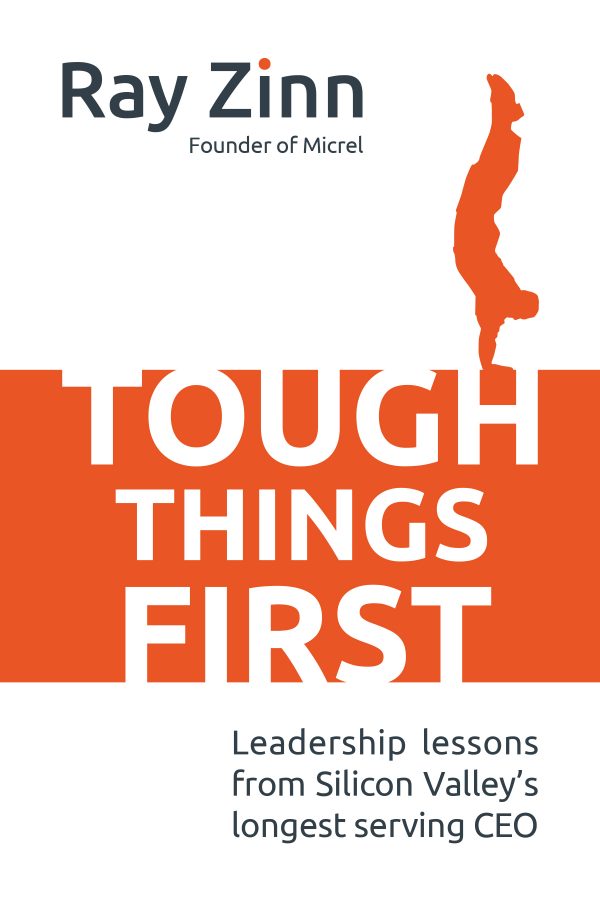
Writing Books
Read moreAny challenge you face that can take years, with hours upon hours of thought and work, can seem like an insurmountable challenge. In his latest podcast, Ray Zinn talks about writing books, and how met the challenges by doing the Tough Things First.
Rob Artigo: I’m Rob Artigo, back again, your guest host for another edition of Tough Things First, with Ray Zinn. I’m a writer and entrepreneur. Being invited back is always a pleasure, Ray.
Ray Zinn: It’s always, good to have you, Rob. You’re always so energetic and enthusiastic.
Rob Artigo: Congratulations on the new book, The Zen of Zinn.
Ray Zinn: Thank you.
Rob Artigo: In short, I don’t want to say Reader’s Digest version, but here briefly, a little bit about what the readers will get where they pick up a copy of The Zen of Zinn.
Ray Zinn: The Zen of Zinn is a collection of thoughts that I have written over the years, going back to when I started my coral. I just would have these thoughts, these motivational thoughts that I would give my staff and the operations people, just food for thought as they say, you know, Chicken Soup For The Soul. That’s what the compilation is, these little snippets, very short little blurbs on many, many, many subjects. That’s what The Zen Of Zinn’s about. (more…)
- Oct172018

When to Quit
Read moreIf your boss ends up in the headlines should you take upon yourself to quit? In this edition of the Tough Things First podcast, Ray Zinn says there is a lot to consider first.
Rob Artigo: I’m Rob Artigo, guest host for this edition of the Tough Things First podcast with Ray Zinn. I’m a writer and entrepreneur in California. Happy to be back again, Ray.
Ray Zinn: Thanks again, Rob. I’m glad to be with you.
Rob Artigo: Well, CEOs, business leaders and politicians, I guess politicians can’t really help it because they’re involved in politics all the time. I guess maybe more from a business standpoint, people have been known to wade into controversial waters now and again. Sometimes it has led to disaster or embarrassment at best.
If you find yourself at odds with your boss, if you’re an employee and you find yourself at odds with your boss for any reason, and it could be because the person was caught having some unethical practices, when we talk about Wells Fargo situation or somebody who is caught having an affair with an employee, that kind of thing. Should you just stand up and as a matter of protest just quit the company and say, “I don’t want to be a part of this person’s business anymore.”?
Ray Zinn: We have to be careful, Rob, because you’re innocent until proven guilty. So a lot of accusations are made about a person. Depending upon where your stance is, for example, Intel’s CEO, recent CEO, was having an affair with an employee. Now that’s against company policy but I doubt seriously that his managers … Well, I shouldn’t say, doubt seriously. It’d be hard to believe that his managers care less about who he’s sleeping with. (more…)
- Oct102018

Under Pressure
Read morePressure is everywhere in the business world, but it doesn’t have to cause you grief. In this Tough Things First podcast, Ray Zinn talks about handling pressure from the boardroom to the interview chair.
Rob Artigo: I’m Rob Artigo, your guest host for this edition of the Tough Things First podcast, with Ray Zinn. As you heard there, on the intro, the longest serving CEO in Silicone Valley. Hello again, Ray.
Ray Zinn: Hi, Rob. So good to hear from you again.
Rob Artigo: Well, you’re an expert in so many areas and I know you’re going to enjoy talking about this. We’re gonna talk a little bit about pressure and how it effects results when we are trying to get something done. Job interviews, sales pitches, even tests put us under pressure, of course, everybody knows. There’s test anxiety out. I know, for example, I’ve heard anyway the Bar Exam is famous for wiping out test takers before they even get started. Some cases where people have such extreme anxiety over it, they get sick during the test.
So, how can … Let’s talk about some of the ways we can cope with pressure so that it doesn’t negatively effect the results. But it can, pressure can dictate the results, agreed?
Ray Zinn: Right. So, let’s talk about pressure for a minute. And so, because that’s the key to this whole thing about stress. Yeah, stress is something we bring on ourselves. Now granted, there are issues like illness, and loss of a loved one, or problems at work, or … that can induce it, but it’s something that we have to cause in order for us to get stress. (more…)
- Oct032018

Communication, Creativity, Innovation
Read moreCommunication technology has become a blessing and a curse for American companies. In this Tough Things First podcast, Ray Zinn discusses the potential impact on creativity and innovation.
Rob Artigo: And welcome back to The Tough Things First podcast. I’m Rob Artigo. I’m a writer and business owner in California. Thanks for having me back Ray.
Ray Zinn: All right Rob, so good to have you back.
Rob Artigo: Ray, the dangers of isolation. I’m sure we’ve touched on this in many ways when we’ve discussed social media and texting and our faces down in phones. Get that crook in your neck from looking down at your phone all the time. Technology’s empowered us to communicate with everyone we work with, virtually at the same time. When we can send out a blast email, we can send out blast texts. Without even getting dressed in the morning I can telecommute for some of the work that do including doing this podcast and I am dressed but I don’t have to get dressed to do this. Despite FaceTime, we know that we get less face time usually with real people these days. Are we in danger of isolating ourselves in our business environments to the detriment of our creativity and innovation?
Ray Zinn: Sure. I have a number of examples. I have a friend here who recently quit his company because his boss never communicated with him except vis a vis email or texting. What was the straw that broke the camel’s back is that my friend had sent an important email off to his boss and never heard anything back. He pinged him on text and never heard anything back so then when the boss finally got back to him, it was for they wanted him to go to be trained in Cincinnati and for a particular new product they wanted to sell. My friend said, “No, no thanks.” And so he quit because the communication was so one way, as you would. When your head is in Facebook or in other social media, it’s one sided. It’s like watching TV. It’s not two sided. Sure, you could take pictures and videos and you can go back and forth but it’s not very personal. (more…)
- Sep192018

Paying Talent
Read moreIt is a constant struggle for balance between what employers can pay and the burdens of cost of living for employees. This is now especially critical in the ever more expensive Silicon Valley.
In this Tough Things First podcast, Ray Zinn discusses the dynamics of supply and demand driving both sides of the question.
Rob Artigo: Thank you for listening to another edition of the Tough Things First Podcast. I’m Rod Artigo, writer and business owner. Hello, Mr. Zinn, ready for another big topic?
Ray Zinn: Let’s do it, Rob.
Rob Artigo: A CNBC.com column said this. It said “Tech workers are the envy of the labor market. They earn some of the highest starting salaries and often command top-notch benefits, but the money doesn’t always buy satisfaction,” it goes on to say. Entrepreneur reports that tech workers in major American cities earn an average of $135,000 a year and yet a survey of 6,000 tech workers conducted by a workplace app called Blind and reported by Quartz found that over 60% feel they aren’t being paid enough. Let’s talk about salaries and cost of living. Employees are bound to feel underpaid even if they’re making six figures, if they can’t buy a house. I know how it felt when I lived in the Bay Area and I couldn’t afford a house and my rent just kept going up.
What’s more at play here in your mind just as a starting off point? Are we talking about runaway inflation or cost of living in key markets or is it over expectations for what people should actually be able to earn in most of these tech jobs?
Ray Zinn: It could be a combination. I know that in the Bay Area where I live and it’s very expensive and it keeps getting more expensive. I’ve also heard talking to a number of people that I know very well who work in these tech companies, because they’re getting paid a big salary, the expectations are higher. In other words, the company wants more out of you. There’s a lot of dissatisfaction with the fact that you’re having to give up your family time as you would or your personal time to satisfy this big salary you’re getting. The big salary is not always what it’s cracked up to be. In Helena, Montana, where I also live, the people are paid 1/3 less than the average in the Bay Area for the same position. Even though the housing and the cost of living may be 1/3 less of even less than, they’re happier because the companies don’t demand as much from you in the way of your personal time with your family or individually. (more…)
- Sep122018

Immigration
Read moreAs we approach the midterm elections there’re no shortage of issues, but few have had the staying power like the question of immigration. In the latest Tough Things First podcast, Ray Zinn talks border protection and protecting immigrants from abuse.
Rob Artigo: Welcome back to another edition of the Tough Things First Podcast. I’m your guest host, Rob Artigo. I’m a writer and entrepreneur in California. Hi Ray.
Ray Zinn: Hello, Rob. Good to be with you again.
Rob Artigo: It’s great to be back. For decades it seems we’ve been talking about this big deal of immigration reform in this country and it has certainly been more political football, I think, and probably more like political theater, than a matter of action for politicians in this country. So today, we have a president trying to do something and if you listen to the news, you’d think immigration was never an issue before today, particularly what’s going on on the border, as if the president had invented the problems of immigration in this country. So let’s talk about immigration in general. Do we need immigration at all? I think we do.
Ray Zinn: I do. I believe that. So let me give you a quick story. So a few weeks ago, my neighbor called and said that there are some cattle on my property up at North hills here in Montana, and there’s discourse, there’s no buildings on it. It’s a large ranch. I said, “Well, how’d they get in?”
He says, “Well, apparently somebody opened the gate and just let them in.”
I said, “Was there any chance at all that the animals opened it themselves?”
He says, “No way, because the gate is tied securely to the fence,” and that really irritated me.
So I called the sheriff and I said, “Hey, I’ve got somebody’s cattle on my ranch and they’ve opened the gate up and letting them feed on my property.”
Then the sheriff says, “Well, do you know who they are?”
I says, “No.” (more…)
- Sep052018

North Korea Nukes
Read moreIt didn’t take long for the leader of North Korea to upset plans for denuclearization. Can the effort be saved? Ray Zinn wades into international waters in this Tough Things First podcast with guest host Rob Artigo.
Rob Artigo: That’s me, Rob Artigo, your guest host for this edition of the Tough Things First podcast. I’m a writer and an expert researcher/investigator being invited back. It’s always a pleasure. Hi Ray.
Ray Zinn: Hello Rob. Good to have you here.
Rob Artigo: The hopes of the President Trump meeting with Kim Jong-un regarding an end to North Korea’s nuclear program quickly went from what seemed like a victory to now apparently North Korea expanding its nuclear program. Why is nuclear non-proliferation which is obviously what they’re trying to accomplish with North Korea, why is nuclear non-proliferation in the world important when we already have so many countries that have a massive nuclear arsenal?
Ray Zinn: Nuclear weapons are the issue of course. Using nuclear power or using nuclear energy for peaceful things are okay. It’s just when they decide to start using them for weapons and by the way, it’s not just nuclear. It’s also these weapons of mass destruction, chemical, nerve, other types of weapons. The fact that we’re talking about nuclear, denuclearization, bombs, nuclear bomb [inaudible 00:01:49], we’re also talking about weapons that have been outlawed since the Second World War or actually First World War using mushroom gas and so forth. It’s not just nuclear. Any time people use weapons which have the potential of mass destruction, whether it be through biological, chemical, whatever, that’s what Trump was trying to work out with Kim Jong-un and so let’s don’t confuse what he was trying to do vis a vis this meeting compared to what you hear on the radio or the news about denuclearization as being the only issue. That’s not correct. (more…)
- Aug292018

Tariffs
Read moreIs it a trade war or simply leveling the playing field? President Trump’s tariffs have been applauded and criticized, but where’s it all headed. In this Tough Things First podcast, Ray Zinn explains the purpose of placing fees on imports and why other countries do it to American goods.
Rob Artigo: I’m Rob Artigo, your guest host for this edition of the Tough Things First podcast. Hi, Ray. It’s good to be back.
Ray Zinn: Well, listen, it’s always good to have you. Rob, you’re always ready and eager to do these things.
Rob Artigo: And I have a lot of fun for sure.
Ray Zinn: Let’s get going.
Rob Artigo: Well, President Trump is at once being praised and also vilified for recent tariffs put in place to combat trade imbalances across the globe. So first of all, Ray, in layman’s terms, try to help us out here and explain to us what is a tariff in this context?
Ray Zinn: Okay. So, that’s like a value-added tax. Almost every country has them. For example, one tactic that was used in France, for imported cars, rather than calling … putting a tax on it, what they would do is they had this import point when the ships would come into harbor that it would take you hours to get to this little tiny, it’s up a windy road, little tiny shack up in the mountains in France. And then you would stand in line and there’s no cover for you, if it was raining or if it’s bad weather, you were just standing out there.
- Aug222018

Facebook Missteps
Read moreFacebook appears to be sliding backwards because of recent missteps. Will it become a cautionary tale for start-ups in the future? In another Tough Things First podcast, Ray Zinn is asked about what Facebook’s struggles may mean going forward.
Rob Artigo: Welcome back. I’m Rob Artigo, entrepreneur and writer. Happy to be back for another edition of the Tough Things First podcast. Hi, Ray.
Ray Zinn: Hey, hey, Rob. Good to be with you today.
Rob Artigo: Facebook’s slide that we’ve recently, some are calling it an implosion. We don’t know if there’s ominous signs on the horizon for Facebook. I looked at some numbers that I found on the internet today. It shows Facebook’s traffic in the past two years has gone down from 8.5 billion visits per month to 4.7 billion visits per month. 4.7 billion visits per month is still huge, but that’s a drop of 3.8 billion. The stock had a big dive in late July, early August, went down significantly from its high. You deal with entrepreneurs and investors all the time. In the shadow of Facebook’s troubles, view it in terms of what has happened to other companies as well, do you think there’s in impact here for startups going forward?
Ray Zinn: Don’t know. It depends upon how many of them are using their website as data mining. The big bucks are in data mining. Google not withstanding, all of them do data mining, insurance companies, banks. That’s the problem that Wells Fargo got into. Whenever you start using your base, as you would, your customer base for data mining, that really upsets the customer because he’s not getting paid for that. In other words, they’re gathering information from you or me, but we’re not getting paid for giving out that information. We think it’s private. We think it should be proprietary and not something that they just freely give away. The big money, just like people who sell their mailing lists, which has now gone down the tube but people used to sell their mailing lists, that’s how they made their money. That’s data mining.
Rob Artigo: I think it might be one of those things that is behind what’s turning people off on a lot of these, Facebook, social networks, and that sort of thing. If a startup thinks they’re going to rely on data mining going forward, is there a danger that they’ll run into a problem with pushback from users and maybe even governmental intervention to prevent people from overusing the data that you’re giving them when they’re data mining?
Ray Zinn: Absolutely. That’s the big rub is that we all like our privacy. We like that protected. As soon as you start using that for your own exploitation, then you’re upsetting the customer. If you’re going to be a company that’s using your customer base for data mining and selling it off that way, you’re going to have a problem.
Rob Artigo: This is something that you’re seeing actually occur. Have there been other fields that you’ve seen this occur in where there’s, let’s put it this way, a discussion among investors and the high end crowds where you’ve got people that are a lot of guys like you who are CEOs and former CEOs who do a lot of investing in the tech field? Are you hearing people talk about this as being a potential major problem going forward?
Ray Zinn: Not a lot, but if you look at a hospital or a medical firm who collects a lot of private data, proprietary data, they’d love to be able to sell that. They figure out ways that they can close the information in a non-nefarious way so they can get that information to insurance companies, to medical firms, to pharmaceutical companies because they would love to have that data available for their own use. My brother who works for UC Davis in California, he actually makes more money from the medical companies by doing medical research than he does from donations to doing research. In other words, he makes money selling information. His information is off the cattle and on animals, and that’s different than human beings because most people don’t care if their animal information gets put out or gets data mined. There’s a lot of money out there for companies that are getting information. As my brother does at UC Davis, he data mines or he gathers information for companies. These are medical companies, but they’re using animals for research as opposed to human beings.
Rob Artigo: Is there a cottage industry that may spring up, one that fights this for the end user, say a person who wants to make sure that they have a phone cover or something that protects the information that the microphone setups on their phones, or that controls what’s being seen through the camera, or other aspects of using your social media so that when you’re using the internet or using Facebook, or using Twitter or something like that, that it’s unable to gather a lot of information on you? In other words, it has to deal with just bare bones info.
Ray Zinn: You’re dealing with companies that you have to divulge information, whether it be credit report, whether it be a bank, your banking data, what you have in savings or checking. You can protect that because that’s something that you input to them, and they have that available. They’re not supposed to use that data without your permission, but they do somehow or another and in some superfluous way been able to …
Rob Artigo: Yeah, right.
Ray Zinn: … get around that and be able to supply that data to people who want it and who need it. It may not have your name on it, but it has maybe your age, your area of where you live. It knows, for example, your address. Instead of giving the specific address, they might say, “In the general area of,” and then Sacramento, or Sunnyvale, or Menlo Park, or something. Then they say, “Okay.” If they know the demographics of that area, they can draw a lot of conclusions just from your data.
Rob Artigo: We could wrap this up by talking a little bit about a recent development where Facebook is talking to banks. They’d like to partner with banks and have a payment service that they start to provide on Facebook. They already sell stuff on Facebook. You can already pay for things through Facebook including advertising, but you can also buy gifts and what not. Recently they’ve said, “No, we’re going to go to banks, and we’re going to have a partnership with banks, and we’re going to have a payment.” I was listening to a talk show host yesterday, national syndicated talk show host, who said that he saw it as a step towards essentially eventually becoming a bank itself, Facebook. I was reading it as not a matter of making money off of being the payment provider but be able, again, to get more data, to have access to the bank’s data and everything else, and just become even more of a behemoth in data mining. Have you heard this, and what’s your reaction to it?
Ray Zinn: Certainly eBay does that with PayPal and these other forms of banking. Any time you use something like a PayPal, or in the case of Facebook a Facebook Pal or whatever, then you’re going to have to give credit information. Once you do, that’s all available now to Facebook like it is to eBay. They can draw all kinds of conclusions from that because there’s no way they can issue payment if you’re not a good credit. It’s like a credit card. To use any of these non-banking services, they’re going to have to get crediting information from you, your Social Security numbers, your financial statement in some cases. Yes, you’re going to be opening up Pandora’s box when you do this. Credit card companies do it already.
Rob Artigo: Right, because they’re looking at buying habits. They’re looking at where you’re going. They’re looking at trends. What they’re doing, and I’ll tell you a little experience with the Facebook deal is when you’re trying to advertise to somebody, and this whole controversy about the targeted ads used by the Russian organizations and these other so called bad actors out there is they take the data that Facebook has available to them, and they can use so much of that mined data to figure out people’s emotional states, and their attitudes, and what they need to move them and motivate them to take action of some sort. I think that as more of that becomes available, it gets out there as public knowledge, people will start to push back and say, “You know what?” For example, I never use Facebook Messenger. I would never put it on my phone. I would never use it on my computer. It’s just too intrusive. I’m giving up some info because I still use Facebook and I have Twitter. Who knows how long that’ll last? I think that as time goes by, people are going to start getting more upset with this kind of stuff. Facebook will continue to have a problem, but so will other companies that are delving so deeply into your life with their data mining.
Ray Zinn: Just today I got a Facebook message came through about this woman dressed provocatively. She wanted to be friends. She’s poking at me, which is another term they use. If you answer that, then now she now has access to your account, to your friends. There’s all kinds of unscrupulous things that are taking place using Facebook as a medium.
Rob Artigo: I think we’ve pretty much determined the fact that some of Facebook’s troubles might be related to people burning out on the social media platforms based on worries about privacy, and it’s legitimate.
Ray Zinn: Yup.
Rob Artigo: All right, Ray. You can visit Ray Zinn at toughthingsfirst.com. While you’re there, you can subscribe to the podcast, Tough Things First, but also you can rate it and share it on any of the platforms where you find your podcasts. Don’t forget Ray’s new book, The Zen of Zen, is available now. Thank you, Ray.
Ray Zinn: Thanks again, Rob. Sure good talking to you.
- Aug152018

CEO Misconduct
Read moreHigh profile resignations and terminations of CEOs continue to rock the business world. In this Tough Things First podcast, Ray Zinn talks about CEO misconduct and seeking higher personal standards as a chief executive.
Rob Artigo: I’m back. Rob Artigo here. Your guest host for another Tough Things First Podcast with are always thoughtful author and successful entrepreneur, the man who coined the term, “do the Tough Things First,” Ray Zinn. Hi, Ray.
Ray Zinn: Hello Rob. So glad to be with you today.
Rob Artigo: Our topic today is one of those things which I’m sure Tough Things First, the book, covers many times and that’s just about character and leading a company to the best of your ability with the highest ethical standards that one can produce. These are tough headlines here that have come up in recent months, in recent weeks.
Intel CEO Brian Krzanich, he’s resigned after an alleged relationship with an employee. Intel cited company standards, which include a prohibition on fraternization. Ron Black has been fired from his position over at Rambis as CEO. That tech licensing company said the CEO was fired, effective immediately, over behavior, the company said, “Fell short of company standards.” And just recently we hear about Texas Instruments CEO Brian Crutcher resigning because of personal behavior that violated the company’s code of conduct.
Now obviously, we’re talking here and these men aren’t here to give their sides of the story or defend themselves in any way. So without talking about each one of those cases individually, let’s examine the set of circumstances, the situations that CEOs find themselves in nowadays and go from there. How’s that sound, Ray?
Ray Zinn: Let’s do it.
Rob Artigo: So you ran Micrel for nearly four decades. You are a CEO in Silicon Valley. We have talked many times on this podcast about what kinds of standards you have to have as a CEO to be effective. Let’s just start there a little bit. Jumping off point is, what is a realistic standard for a modern technology CEO?
Ray Zinn: Okay. So let’s first of all talk about why we have these headlines. In other words, what precipitates these guys focusing on, the media focusing on these individuals? Anytime you’re in a prominent position, and certainly a CEO is prominent, you’re going to get higher scrutiny. In other words, you’re going to be looked at a little more closely. I doubt seriously there’s anybody listening to this podcast that hasn’t had some problem or difficulty in their life, and they’re just glad that there’s no spotlight put on them. It’s not a matter of what they did. It’s is how they rectified it or how they got themselves into this situation to begin with.
As a CEO of Micrel for 37 years and as a manager of departments for probably another 20 years beyond that, you have to have a set of standards that you set up in advance. For example, when I just got married and it was when I was 23 at the time, I made a commitment to my wife that I would never be alone with another woman. And I’ve been criticized for that because they say, “Well, how can you have a one-on-one conversation with a woman and not be alone? Of course, we have to define what does it mean to be alone?
What I mean by that is that there’s no one else around. In other words, if I did have a meeting with a female employee, I would make sure that there was somebody there close by at the door, around the door, near there during this time, having this meeting. So the whole concept of not being alone with another woman or female was an important one for me when I decided back when I was 23 years old.
And I’ve never violated that standard. So that’s, those are the kinds of things you have to commit to when you decide to be at least a high profile manager or leader. And it’s not just that. There’s a number of them. We had a policy at Micrel of honesty and integrity, dignity of all individuals, and doing whatever it takes. Those are the four cultures. And I had to set the example and live with those cultures.
So when I talk about dignity of every individual, again, I don’t know those situations between those other companies that we just talked about, but I do know that using condescending or vulgar language is not within the purview or what a good leader should have. So anyway, those are some of my thoughts, Rob.
Rob Artigo: And you mentioned those companies. And it’s recent that we’ve heard this, but I think there were several that were big high profile resignations last year. And that has been talked about. Do you think it’s the scrutiny that, going beyond the actions of the CEOs, but do you think it’s the scrutiny of the companies and their leadership now bringing this to the forefront? Has this always been happening like this and we just didn’t know about it?
Ray Zinn: Well, it’s certainly been happening. We may have even known about it. I mean, there’s been like Ted Kennedy and has situation with that woman. There’s been Bill Clinton and a number of others have had similar issues, not just recently. I mean, we’re talking about going back during the time of FDR and John Kennedy. All of them have had difficulties in one fashion or another. So this is not recent.
I was listening to the news the other night, and they were talking about a president Donald Trump. They said that Donald Trump is no, and they use this as a quote, “Donald Trump is no Mormon Provo boy,” which I thought was kind of interesting. Which kind of sets the standard, I guess, for the opposite of what Donald Trump has lived his life like.
So, you know, there are people who have very high standards with regard to morality and others have more loose standards. It seems to me that people at very high levels tend to think they’re above those standards or at least they don’t seem to care. So I think that’s precipitated a lot of the problems that we’re now seeing is that, whether they’re sports athletes, or politicians, or corporate executives, they tend to think that they’re above that, that people will overlook their shortcomings, which is totally wrong, of course.
Rob Artigo: Yeah, that’s exactly where I was going, was the question about the position of power can lead to various temptations because it’s an extraordinary position. It’s not the, I was in the military. It’s not the squad leader in the army position. It’s not the manager at Safeway. Although I guess to some degree, any position of leadership can lead to this, but if you’re Tiger Woods, if you’re the president of the United States, if you’re the the CEO of a major company, there’s money, there’s prestige, there’s admiration for you in that role, and it can be tempting.
I’m not excusing the behavior because I think what we’re doing in this podcast here is showing you are a CEO who faced those types of circumstances, or at least knew you were going to face them, so therefore you set certain standards for yourself and limitations so that there will be no lines that would be crossed or blurred because it protected you as a person, it protected your wife and your family. Somebody might say it’s an extreme thing to do, I’m going to have somebody stand outside the door while I’m having this private conversation with a female because it’s the commitment I made, but it does prevent there from being any accusations of wrongdoing, and it just seems like a prudent thing to do when you’re in one of these positions of power. Right?
Ray Zinn: Exactly. So again, we’re not trying to pass judgment on these people who have been recently called out for their behavior, but it is something that, as a CEO or a leader, that you need to be especially careful of because you can hurt your company’s image and reputation. And I think that having the proper moral character and the proper standards is going to not only enhance your company but also enhance your family relations and your personal relations. So again, I’m not here trying to preach like a reverend or something like that, but I do believe that we could use a little higher code of conduct in our leadership, both inside the country as well as our companies.
Rob Artigo: Yeah. It is a tough role to be in when you know that people do look up to you. And it doesn’t have to be a question of sexual misconduct. It could be just other kinds of moral conduct.
Ray Zinn: Well, you know, recently one of President Trump’s cabinet members is under scrutiny for using expensive hotel rooms and expensive condominiums or private airplanes for personal use. Then of course, the people say, “Hey man, we’re paying taxes. Why should we for your travel and for your room and lodge?” So there’s a lot of scrutiny on that. As you said, it’s not all sexual. It’s your use of foul language, it might be the way you treat a women on your staff or other employees that may be using perks that are not paid for by you personally, but are paid for by others.
I know executives personally that have had extremely expensive lifestyles that they charge the company with, to the tune of $900,000 a month, which is ridiculous. But they somehow or another, they’ve gotten away with it and they think because of who they are, they can do things that other people can’t do.
Rob Artigo: Let’s wrap it up with this. Are you disappointed in what’s happening here with … Obviously, it’s tough to see industries battle with these kinds of circumstances, but are you concerned about the frequency of it?
Ray Zinn: I’m concerned. I’m a realist. I know that human nature as it is, as it would be, is going to have these challenges. And so I think that we could use a little more higher dose of morality and respect and dignity for the way we treat others and the way that we treat ourselves, actually. So yes, I am disappointed, but again, we all make mistakes and it’s just our nature to make mistakes. But we should correct them, and we should correct them with dignity and with honor rather than try to hide or sweep under the carpet, these things. We should just come out, admit them, and then change and correct it.
Rob Artigo: Then the examples we gave, Intel, Rambis, and Texas Instruments, each one of the explanations as to why there was this departure, this ending of this relationship between the CEO and the companies dealt with the fact that they are violations of company codes of conduct, or prohibitions against fraternization, or other company standards. So bringing that out seems like a positive example. In other words, like you did at Micrel, they had some standards in place that people understood to be important and that eventually, unfortunately, ensnared those folks with the mistakes that they made. The companies had those policies there, right? I mean, that’s got to be a positive.
Ray Zinn: Well, I had let a number of people go over the years for not following company policy, whether it be their way they treated others, whether it be sexual in nature, any violation of the corporate culture and policy, they were dealt with and dealt with sincerely. What I’ve noticed over the years is that people try to hide or try to explain away their shortcomings. I think if those three men that we mentioned earlier were to be more upfront, they were to be more contrite rather than being caught, if they would just own up to it before being caught, that would have probably saved their jobs. So I think it’s more of the fact that they didn’t act very contrite as why they were let go.
Rob Artigo: Alright, Ray. Thank you again. Great conversation, I think it’s an important subject, and I doubt this will be the last time we talk about it here on the Tough Things First Podcast. So you can find out more at toughthingsfirst.com. Tough Things First is on Facebook and LinkedIn. Go there and get more information. Twitter is also available. Tough Things First, more information from Ray throughout the day, throughout the week to help you get by, answer some questions, or just to find food for thought. His new book, The Zen of Zen is out there, fresh in print, and you can pick that up at a bookstore or Amazon. Thanks again, Ray.
Ray Zinn: Thank you very much, Rob. Enjoyed being with you today.
- Aug082018

Skin Deep
Read moreIt has been said beauty is only skin deep, but in our ever changing world, beauty is a growing priority and infinitely more possible with the right amount of money. In this edition of the Tough Things First podcast. Ray Zinn discusses the growing trend of paying for it, the virtue of aging gracefully, and should government be involved?
Rob Artigo: I’m Rob Artigo, entrepreneur and screenwriter. I am the guest host again for another Tough Things First podcast. Hi, Ray.
Ray Zinn: Hey, Rob.
Rob Artigo: And it’s good to be back. I read a stunning opinion article recently that was in Newsweek, and follow me on this. In Brazil, people are thought of as having a right, like we have a right to free speech in this country. In Brazil they have a right to beauty. So, in public hospitals, plastic surgeries are free or low-cost, and the government subsidizes nearly a half million surgeries every year. That just blew my mind. So, listen to this quote, from Alvaro Jarrin, he is the writer of this opinion piece. It says, “Plastic surgery can be a risky venture, yet these patients, most of whom were women, also told me that living without beauty in Brazil was to take an even bigger risk. Beauty is perceived as being so central for the job market, so crucial for finding a spouse, and so essential for any changes at upward mobility that many can’t say no to these surgeries.”
Ray, what is the danger of a society that begins to place such a high level of importance on appearance? What if this concept spreads, where you have the government going all right, we have to pay for plastic surgeries, so that you can look beautiful. And then what’s the ideal of beauty? To me, it’s so open ended that this one thing itself could bring down the economy of Brazil.
Ray Zinn: Well, Australia has the same philosophy-
Rob Artigo: Really?
Ray Zinn: -so it’s not just — yeah. So it’s not just Brazil. There’s other countries, Sweden. I can probably name five or six countries that have this similar philosophy. So the statement that beauty is only skin deep has a lot of meaning, because what’s inward is more important than what’s outward. Unfortunately, as they say, you can’t tell a book by its cover. But we do. We do make judgements based on what we see. If a person is not dressed coordinated or properly, if their hair is not cut or coiffured correctly, or if they’re wearing loose clothing that makes them look like a gang member or something. We do judge people.
And so, when people go to apply for a job, they’re always told to dress up. Okay, you know, look your best. And maybe that’s not true at all companies, but by and large the view still is that when you go to apply for a job you want to look your best. I know that recently, my wife and I were at the store picking up some stuff and we noticed a couple of these young teenagers that were, girls, that were getting ready for the prom. And they spent — I couldn’t believe it, we were at the cash register, they were spending $200 on stuff for cosmetics, and stuff they wanted to prepare themselves for the prom.
Rob Artigo: Wow, yeah.
Ray Zinn: And I had to ask one of them, “How much do you think you’ll have spent going to the prom?” She says, “Well, with the dress, I’m probably personally close to a thousand dollars.”
Rob Artigo: Wow. Oh, wow.
Ray Zinn: You know, when we got married, my wife — I don’t think she spent $200 getting ready for the reception, for our marriage. And these kids are spending close to a thousand just to go to a prom! So, you go to the beauty parlor, or the girls do, and they’ll spend a $100, $150. Get your nails done, cost you $40. And people are spending money on how they look. Just go down to the shopping centers and look at these kids and the money they’re spending for their clothes.
Rob Artigo: Well, what happens when the government gets involved and says, you have a right to that? So now everybody in the school, the government pays the thousand dollars for the prom dress and all the stuff they want, so they get that stipend. And now everybody’s equal because they get to have — what happens when the government starts paying for that stuff? How do you afford that?
Ray Zinn: Well, let me give you a little different bit.
Rob Artigo: Okay.
Ray Zinn: Recently I heard about, in New Jersey, there’s a mother complaining to the school that her daughter couldn’t make the cheerleading squad. And so the school board decided to make it available so that anybody who wanted to be on the cheerleading squad could be on the cheerleading squad. So, you didn’t have to have any particular training, you didn’t have to look any particular way. If you want to be on the cheerleading squad, you could be on the cheerleading squad. Of course, then the ones that were prepared and trained and did all that were upset because, we put all this money and time to win a position on a cheerleading squad, and now you’re letting anybody be on the cheerleading squad! It’s kind of like giving a college degree to somebody just because they asked for it. So the government is getting involved, whether it be in our country or other countries. And our country pays for abortions. So where do you draw the line? Brazil’s not the only country, as I mentioned.
Rob Artigo: Yeah. I mean, I’m not surprised that there are other countries that do this, I’m surprised by Australia. I’m sure I’d be surprised to see the list of the countries that do that, where they say — because, look. The government, the US government or your insurance carrier, will pay for your reconstructive surgery for after breast cancer. So they fix that, and that might involve implants. But it’s important reconstruction. This is stuff that’s part of a medically necessarily alteration, or fix, if you will. You know, if you got a burn and you need a skin graft, or your nose has been broken, they fix your nose so it’s not bent. Those are medically necessary, whereas these elective surgeries, just because you feel like you’re not attractive enough, to me it’s alarming because it makes me think of a future where we can decide — you mentioned the subject of abortion.
Let’s say, it’s not abortion, it’s aborting the children who aren’t gonna be perfect. So you abort the children that aren’t gonna be perfect, and then if you can select, I want the lighter skinned one, or the darker skinned one. I want somebody with straight hair, or I want blue eyes, or I want brown eyes, whatever the case may be. I think about where this mentality, beauty at all costs. Here’s an example: life, liberty, and the pursuit of beauty for my personal success, or personal happiness. Right. So, let’s change it so it’s in the pursuit of beauty, in the pursuit of my personal success. I think that it doesn’t bode well for the future.
Ray Zinn: Well, you know, remember back in the second World War, Hitler tried to have his own society called the Aryan society-
Rob Artigo: Yeah, master race.
Ray Zinn: -and, yeah, tried to breed the looks and so forth into these people. So this has been something that’s been ongoing for a long time, and when you selected your spouse, you looked at certain things, her beauty or her looks, her height, whatever. And you made a decision whether you wanted to marry her. And so, maybe in Brazil, they’re trying to give the girls more of a chance, as opposed to having some of these girls that because of their lack of beauty, at least in the eyes of the resilient mass. Wouldn’t marry them. And so, I don’t see anything wrong with that. If you’re gonna focus only on beauty, then of course you’re missing the better part of the light, because as you get older — and I’m definitely older — you start losing that tight skin and that suave look.
I mean, your hair turns gray and you get wrinkled, and you’re gonna be pretty sad in the future as you get older. By the time you hit 50, you’re gonna start aging pretty dramatically, and all that sculpting and cosmetic surgery you’ve done is really not gonna help you. And so, the best way to stay healthy and beautiful is just to take care of your physical body. Keep your weight down, take care of yourself with your vitamins and good night’s sleep, and having a good exercise program. That’s the way to really enhance your beauty.
Rob Artigo: I agree. The people that we’ve seen who are, oftentimes famous people, we see their faces all the time. And over the years as they get older, we start seeing them stretch out and start to look awkward. I think that the trouble that people have at any age when it comes to trying to correct their own personal perceived defects because they think it’s not beautiful, is they can’t fully understand what people see in them because they can be too critical of themselves. Human beings are, I know I am. I can be too critical of myself when I look myself in the mirror, and I don’t know. For example, I thought I was the ugliest teenager, and that nobody wanted to hang out with me. And I look back at the picture of me when I was a teenager and I go, wow, I was a pretty good looking kid. I wasn’t super popular and I didn’t have lots of girlfriends or whatever, but at the same time, I just didn’t have any confidence that I looked good. The thing is, who sets the ideal? And so what you’d be chasing is probably a distorted view of what you think beauty is.
Ray Zinn: Well again, the saying, beauty is in the eye of the beholder. So we all look at beauty in a different way. I mean, the Polynesian people, some of the Polynesian people, believe that heavy women are beautiful.
Rob Artigo: Sure, yeah.
Ray Zinn: And then there’s some African tribes that put those big plates in their lips and they say that looks beautiful.
Rob Artigo: Right.
Ray Zinn: There’s some of the Asian culture that put those rings around their neck to stretch their neck out because they think that looks beautiful, or the tiny feet. The Chinese many years ago used to bind the children’s feet to make them tiny.
Rob Artigo: Ouch.
Ray Zinn: So anyway, beauty is in the eye of the beholder, and you just have to … mainly, as we talked about, have a good healthy diet. Get a good night’s sleep, exercise regularly. And just keep yourself as beautiful as you can without having to go for this cosmetic reconstruction.
Rob Artigo: Yeah. And people do age more gracefully when they don’t try to chase it with surgeries. I’ve seen some very beautiful people who you could tell over the years just didn’t get anything and they look great still.
Ray Zinn: Keep yourself healthy. Keep a good mental attitude. Your best solution for friends is just to be a kind, happy person.
Rob Artigo: Great advice, Ray. Thanks again.
Ray Zinn: Thank you.
Rob Artigo: Make sure you subscribe to Ray’s podcast, the Tough Things First podcast. And if you want to, you can contact Ray at ToughThingsFirst.com. You can also offer yourself as a host. We’ll set you up, we’ll take care of everything, we’ll make sure that you can hook up with a microphone and connect through our various methods for doing the communications. Pitch us a topic, and Ray goes through those. He reads those messages, and he’ll even answer your questions through email if you want to. So visit Ray at ToughThingsFirst.com, and you may also visit Ray at Facebook and LinkedIn, and follow him on Twitter. Also check out Ray’s new book, “Zen of Zinn”. Thanks again, Ray.
Ray Zinn: Thank you, Rob.
- Aug012018

God Talk
Read moreAs with politics, you’ve probably been told, the subject of God is forbidden in some circles. But does that also mean God is forbidden in the public square? Ray Zinn answers this delicate question in the latest Tough Things First podcast.
Rob Artigo: I’m Rob Artigo. Guest host for this edition of The Tough Things First Podcast with Ray Zinn, the longest serving CEO in Silicon Valley. I am a writer, and a California entrepreneur. Happy to be back again, Ray?
Ray Zinn: Rob, it’s always a thrill to be with you.
Rob Artigo: On a previous podcast we talked about the question of whether, or not God is dead, and it was of course a rhetorical question. You know? If God’s there, he was there before, and he will always be there. I wasn’t surprised by your answer, you said, “No. God is not dead.” The question is, is the topic of God or religion in the public square dead? Let’s just talk about religion in general, is religion important in modern society, here in 2018?
Ray Zinn: Well, I believe it is, because as we talked about in a previous pod, is God dead? I think that people who have a religious focus and bent in their lives are more honest, and they have higher morals, and they’re more faithful in their marriages, and they tend to treat each other more kindly, and more respectfully. Having a religious bent in your society I think is good, and it’s important. In those societies that don’t have that same religious strength in their society tend to be less caring, less loving, less giving, not willing to be of service to others. I think that is an issue.
I know in the scout oath, “On my honor I’ll do my best to do my duty to God and my country, and to obey the scout law. To help other people at all times, to keep myself physically strong, mentally awake, and morally straight.” That oath has been around for over a century. That scout oath is an indication of your moral belief, and how you view others. Again, helping other people at all times, I think that’s important. The more religious you are the more apt you are to help, to love your neighbors yourself, so to speak.
Rob Artigo: There is another way of looking at this, too, because there is a part of society, a point of view in society where there are people out there who think religion is not important to society and it has no place in the public square, and I’ve always felt that, that position itself is a religion of sorts, in other words, the idea that I’m completely dismissing God, and Jesus, and any other type of faith that you want to think of, I’m dismissing it outright, because it’s not scientific, it’s not good for society, so we prefer if that wasn’t there. I’ve seen people cling to that position of not wanting religion in society to the point of making it a religion themselves. The non religion, religion. Does that make sense?
Ray Zinn: Yeah. It’s not a religion because religion is a faith based statement-
Rob Artigo: Doesn’t it take faith, though, Ray, to-
Ray Zinn: Yeah.
Rob Artigo: Say, you have to take, make a leap of faith saying, “I know God doesn’t exist.”
Ray Zinn: Yeah. [crosstalk 00:04:06]-
Rob Artigo: And that requires a leap of faith-
Ray Zinn: Okay, but again, religion tends to be in the dictionary, it tends to be a belief in a higher deity, or being-
Rob Artigo: Yeah. Right.
Ray Zinn: And more of a faith-based subject as opposed to being this is my opinion.
Rob Artigo: Mm-hmm (affirmative).
Ray Zinn: But, to say that boxing is your religion, or car driving, car races are your religion, tennis is your religion. Yeah. That’s a stretch. I mean, people say that-
Rob Artigo: Right.
Ray Zinn: Whatever your hobby is, that’s my religion, but that’s more just a cliché, it’s not a real honest English version of the definition of religion. In this podcast, we’re talking about is religion in a faith based, belief in a higher being is that important for a society, and the answer is flat out, yes. Now, not everybody that listens to this podcast are going to agree, because that’s the problem we have is that some people don’t agree that you need a religion based society to be successful. I do. I mean this country was founded on that. There’s no other country, by the way, that I know of that has a statement made that, “One Nation Under God,” is in their pledge of allegiance. To me, that’s a statement, or on their coins that says, “In God We Trust.” These are very emphatic statements about, here’s how we believe, and that’s very important.
Rob Artigo: Conversations that I’ve had with some people who are adamantly against religion, they think it’s not necessary, let’s put it that way, for society, because they say, “It’s not necessary because all I have to do is act right, be good to other people, and that’s how society works, so do the right thing.” I look at them and go, “But who decides what the right thing is?” What’s morally right to somebody who has no religious background, or religion they’re making up their own rules as they go along as to what is morally right.
I bet Adolph Hitler, who was operating in his own world thought that it was morally right to commit the holocaust, because he thought he was doing the right thing. It’s like, he thought, I’m doing the right thing, and who sets the rule for the right thing in a society that has a religious basis particularly, and I’m biased in the sense that I have Christian faith, so society with a Christian faith is going to be a forgiving society, and an excepting society, and one that people foster good, as you said, morals, that are based on basic principles that people share, but if you-
Ray Zinn: Right.
Rob Artigo: Have a society where people are just operating based on the rules that they make up, then it’s a wild, wild west.
Ray Zinn: Again, can you be a kind, loving, and forgiving person and not be religious? Yes. The question, not everybody that’s religious is honest, and not everybody that’s not religious is dishonest.
Rob Artigo: True.
Ray Zinn: We’re just talking about now a basis for society in other words does religion have a basis for a society? And I say, yes, because not everybody has the same view of being honest, and forthright in treating their fellow man properly. I think religion helps it, because it teaches it. Does everybody have to go to college? No. Does everybody have to be from a specific area of the country to be successful? No. We’re talking about, now, what would enhance, what would give society the best chance of success? And that’s what the subject of this podcast is about.
I think religion does train, get people the training and the help that they need, I think, to be a kinder, more understanding society, and then our country is becoming less religious, and that’s why you’re seeing so much animosity, and so much hatred amongst the different political groups, is because they don’t respect each other, and how do we get back to that? We have to go back to church, as you would, go back to being a more willing to listen to our faith leaders as you would. That’s the bottom line in this conversation is this is a podcast, this is to urge people to join a religious group, and help develop that faith based society that we need.
Rob Artigo: Good advice, Ray. We are done with another Tough Things First Podcast. Please follow the podcast everywhere podcasts are available. It’s out there on Stitcher, as well as all those other platforms. Go out there, click like, and make sure you leave a comment, and also share this podcast with other folks that we’ve done many, many podcasts, I’m not the only guest host. There have been a handful of really great guest hosts, and if you go back and look at the archive you can see all the previous podcasts, listen to them, and get some great advice from Ray Zinn, the longest serving CEO in Silicon Valley.
Ray has two books, Tough Things First is his first book, which is really great if you’re an entrepreneur and you want to learn a whole bunch of stuff. How to start your day, I mean, hey, it’s called, Tough Things First for a reason all the way to more problematic things that you face as a business person. Find that information there, but also get your daily dose by picking up the book, The Zen of Zinn, Ray Zinn’s new book. Thank you, Ray, I really appreciate it.
Ray Zinn: Thank you, Rob. Good being with you again.
- Jul252018

Personal Trainer
Read moreYou’ve probably considered a personal trainer for your physical health, but what about your mind? In this new Tough Things First podcast, Ray Zinn and guest host Rob Artigo weigh the pros and cons of letting someone else inside your head.
Rob Artigo: Welcome back to Tough Things First, the podcast. I’m Rob Artigo, I’m a writer and a business owner in Northern California. Thanks for having me back again, Ray.
Ray Zinn: It’s always good to have you on the program, Rob, you always ask good questions.
Rob Artigo: Ray, I know from listening to you over the years that, as we’ve been doing these podcasts, you advocate fitness, physical fitness as well as mental fitness and I know you do your workout first thing in the morning, it’s your number one way of starting your day. We all know there are personal trainers out there in gyms, even some who do house calls, that come over and they’ll work out with you in the garage, or in the living room or something.
I saw one guy in Silicone Valley, he was a business start up owner, he had a truck that would drive up and park in front of your house, not a big rig, but a large transport truck so it would have an area in the back, you roll up the door and he had all the gym equipment in there. So the person would come out front and he would do the workout with them right there in the back of the truck and I thought that was a pretty clever idea.
So you’ve got those people out there that do the kind of fitness training. Do you think when it comes to personal growth, and we can talk mental fitness, but also just personal growth in general, does it make sense to have somebody you would consider a personal trainer for personal growth?
Ray Zinn: Having a mentor is always a good thing. Now, do you need to have somebody come and help you exercise? It depends. If you’re a highly disciplined person, then you could probably have your own exercise regimen and you wouldn’t need a personal trainer. But if you’re not a highly regimented and disciplined person and exercise is important, then certainly, have somebody come and work with you, whether it be a friend, a spouse, a professional trainer, it’s all a matter of what does it take for you to get to the place you need to be? So that’s the key, doing whatever it takes, no excuses.
Rob Artigo: Can you make a mistake in who you ask advice in that sense? So if you want to consider the person who’s doing the personal growth training would be a mentor, so can you make a mistake in choosing the wrong mentor?
Ray Zinn: Sure. You have to have somebody you can trust. This is a side note, it’s not exactly on topic, but my wife was telling me about this Pilates wheel thing that’s been mentioned on Facebook and she says, “I ought to get one of those, they’re really good and it will help me exercise.” And I said, “You already have all this exercise equipment, just use what you have.” So it’s a marketing tool these guys use to get you to buy their particular fitness program, but you can exercise without even having any equipment. Just pushing your two hands together and pushing away and doing push ups and calisthenics, I know, you’ve been in the military, you know that in the military when you do calisthenics, push ups and jumping jacks and sit ups and stuff, you don’t have any equipment-
Rob Artigo: No, none.
Ray Zinn: You’re not using any equipment, but yet the military are very fit, well most of the military are very fit, but you’re not using any equipment whatsoever. You can tuck your feet underneath your pit frame and you can do sit ups, or your coach. There’s various ways you can restrain your feet to do sit ups, or have a friend sit on your feet and do sit ups. When I grew up, I didn’t have any really equipment… exercise equipment, nothing like what they have today, they didn’t have any treadmills, didn’t have any [inaudible 00:04:32], didn’t have any weight hoist and Nautiluses and stuff like that, we just constructed our own. I used to do jumping jacks and deep knee bends and push ups and I did all those things and I was pretty physically fit.
So I don’t think you need to have all this fancy equipment to stay physically fit. Get up, walk with your dog, or go take a little jog around the block. Climb up and down your stairs, they call them hill repeats, if you have stairs, just run up and down the stairs 20 or 30 times, there’s a lot of things you could do just to stay physically fit. The main thing is, watch your diet.
Rob Artigo: And I think that watching your diet also works on the mental fitness side. It’s kind of easy if you compare the idea … or it’s easier to tell if you’re not physically fit. Maybe you get tired easy, maybe you’re heavy, your blood pressure’s high, there’s all kinds of indicators that you’re not physically fit, but it’s harder to tell when you are not necessarily mentally fit, really handling challenges of the day, and fit for having some personal growth. How do you know when you need to reach out to somebody, somebody who can help you get on track when you’re not mentally fit, when you’re not experiencing quality personal growth?
Ray Zinn: That’s an interesting one because I just heard this story, I was talking to a friend of mine about this fella who was coming in, applying for a job at his company and the fella is a young man, probably in his early 20s or late teens or something, but he couldn’t even fill their application out. So my friend said, “Well I’m not going to fill your application out for you.” He said, “You want to take it home and have your wife fill it out or your parents?” The guy says, “Well I kind of have learned the ability to read and write.” And I says, “Well that’s the problem these kids have now coming out of school,” because they’re so focused on their electronic devices that they’ve forgotten how to write by hand and how to read, because they listen instead of they don’t read it, they don’t see it and read it, they just listen, so they’ve lost the ability to read and write and that’s a real concern in colleges today. These kids are going into college, hardly can read and write.
So if you have a difficulty reading and writing, yes, you need to bone up on that. You should be reading regularly, not just watching TV, or listening to an audiobook, you need to pick up a book and read it and study it. If you’re not doing that, you’re not going to stay mentally fit. Another way to stay mentally fit is engaging in conversations with other people, just getting together and having a good old debate. Doesn’t matter the subject, just have a good old debate and you should be studying on a regular basis. Just like exercising your physical body, you need to exercise your mind. You should be avidly studying and trying to gain more knowledge in a particular area.
Rob Artigo: I think you’ve done it many times, you have learned other languages and I think that even if somebody is not necessarily working towards fluency, working on learning another language will help fire some of those synapses in your brain that can get lazy over time. I think learning a new language is a great way of doing that. You don’t just have to do puzzles, and … crossword puzzles I find pretty fascinating, and Sudoku too, but those kinds of things can work your brain, but really learning something at any age. I remember my mom when she was in her 70s, still had her little learning Spanish. She would learn … she had her audiotapes and things that she would just sit there and practice her Spanish. Lot to be said about working that brain if you want personal growth and being really mentally fit.
Ray Zinn: Yeah, they say, “Use it or lose it.” So your mind is the same way. If you don’t use your mind, you’re going to lose it. So work Sudoku, that’s a good one, working mathematical problems, I know it’s a chore, but exercise, physical exercise is a chore. But you need to exercise your mind and not just sitting and watching the boob tube, you need to actually get a book, pick it up.
Rob Artigo: Right now, more important than ever, particularly for the younger generations because like you said, the way that they’re communicating more often through Snapchat and other methods, whereas … I talked to my wife about this just yesterday, the idea that they can have whole conversations using emoji, just pictures of something-
Ray Zinn: I know.
Rob Artigo: … instead, now they’re looking the just pictures of something, that’s what primitive humans used to do-
Ray Zinn: I know.
Rob Artigo: … they would write stuff on the walls using pictures, they would have the tiger and they would add the spear, the guy chasing the tiger with the spear and the wooly mammoth coming up and you’d have a story there. Now, modern human is going back to the most primitive, basic communication levels, that they can’t write in cursive and they have a hard time writing in complete sentences.
Ray Zinn: That’s because we’re lazy, we’ve become a lazy people.
Rob Artigo: The last writing class I went to at a college, we would share our writing. I would get something from some younger people and I would look at it and go, “Why aren’t you putting capitals at the beginning of the sentences?” They’re not capitalizing at the beginning of the sentence, you have written something that you are submitting to the whole class and you’re not capitalizing the beginning of a sentence. It’s the most basic element of writing in complete sentences, starting with for example, Ray, capital R.
Ray Zinn: Again, mental fitness is just as important as physical fitness. You take that person that just passed away, the …
Rob Artigo: Hawking.
Ray Zinn: … physically he was a wreck but mentally he was a genius, so he was handicapped because of his physical problem but his mind, he was just an absolute genius. So I recommend becoming a genius, physical and mental. Go to it, learn it. Do the Tough Things First, it’s one of my books I wrote.
Rob Artigo: And as always, you can find Ray Zinn on Facebook and LinkedIn and … where else can we find you? On the internet, you can just go to toughthingsfirst.com, all the stuff’s there too, right?
Ray Zinn: It’s on there on LinkedIn and over on Twitter and you can find all kinds of stuff.
Rob Artigo: Do you tweet ever day? You try to tweet something every day?
Ray Zinn: Oh yeah, twice a day.
Rob Artigo: Oh wow, okay. Well look for those. When you find this podcast and you have chosen to follow it, also go in there and click your … give it your star rating or whatever the format happens to be, and then put a comment there and invite people, many of your friends to come out and check it out because there’s lots of good information. Check out the past podcasts, go in there and look at the different subjects that are available to … If you pick out the ones that most interest you and listen, and you’ll find that Ray is offering some really great advice to entrepreneurs everywhere. Also, be on the lookout for Ray’s new book, the Zen of Zinn. Thanks again, Ray.
Ray Zinn: Thanks, Rob.
- Jul182018

Opinions
Read moreEveryone seems to have them, but are all opinions relevant or worthwhile? Ray Zinn, the longest serving CEO in the history of Silicon Valley, opines about whose opinion should really count, whether in the boardroom or a bookstore.
Rob Artigo: I’m Rob Artigo, guest host for this edition of another Tough Things First podcast. I’m a writer and entrepreneur in California. And I’m happy to be back again. Ray, hi.
Ray Zinn: How you doing, Rob? Good to have you with us.
Rob Artigo: Thanks a lot. Sometimes when we’ve wrapped up our podcast sessions, we’ve exchanged some emails and thoughts about what we can do to improve the topics, and maybe the delivery, or simply just how can we make it more interesting for the listeners. And I offer my opinion, you have yours, and in some environments, in business and in life, opinions can be stifled or they can be overbearing even.
So Ray, should we consider opinions important?
Ray Zinn: Absolutely. What’s interesting here is, is that opinions are unsubstantiated facts. So you know, when you express an opinion, you have to look at it as, it’s not substantiated, I don’t have any facts to base it, but I’m saying here’s my opinion. Now, if you say red is red and blue is blue, and the sky is blue, and so forth. Then you’re stating facts. And those aren’t opinions, because they don’t, they’re not based on speculation, they’re based actually on hard data.
So, when one gives their opinion, at least you understand where they stand. And I always invite people to express their opinion. The hard thing though Rob is whether or not, how we respond to those opinions if we disagree with them. But if we’re careful, and remember that an opinion is not substantiated fact, it is just our view.
Rob Artigo: Right, and I think that when you’re in a group for example, a session, where you’re talking design, or product, or a direction for the company, you may have people in the room who have, who state an opinion, because they and they have an established credibility in the area. Maybe it’s the person who is the money guy. And or they woman who heads up sales. Or the person who does personnel, you know?
Is there, and maybe they have specific credibility on a thing. So, when they give an opinion within the group structure, they have a credibility. And the people who don’t necessarily have that credibility, maybe it’s the person who works in the front office, with the CEO, giving an opinion, about something in personnel where they don’t have the personnel credibility.
But they might have an interesting idea, or something to input, that will help improve the situation. I suppose the credibility is important, but at the same time, do you think we should gloss over or dismiss people just because they lack the credibility in their opinion?
Ray Zinn: Not if you wanna get along with people and understand their viewpoint, you have to let them express their opinion. Often times when someone’s expressing an opinion on a particular subject, I can tell that they don’t understand what they’re talking about. And so, I’ll take the time to explain to them, or maybe it’s my fault. Maybe I’m the one that doesn’t really have the knowledge and the understanding on a particular subject.
And I need to be educated. So, when we listen more than we talk, then we learn. You know, Judge Judy says, “You know, you have two ears and one month for a reason.”
Rob Artigo: Mm-hmm (affirmative).
Ray Zinn: And so, we don’t do a very good job at listening. But we learn when we listen. We can’t learn while we’re talking. And so, taking the time to let someone express their views, we’ll learn something. And because we’re not all knowing, not everybody has all knowledge. And so, we don’t wanna just push them aside because we think we’re the expert and they’re not.
Rob Artigo: In the business environment, one thing that I find very interesting is, that some businesses, and I don’t know if you did this at Micrel, but they have a comment box. Like an employee comment box, where you walk by and you just drop in a note that says, that anybody in the whole company from the guy emptying out the garbage or sweeping the floor, to the CEO, if they wanted to. Could drop in anonymously a note that says, “This is an issue I’ve seen, I’d like to see it addressed in some way.”
And they’re, you know those things always have opinion in them. They have opinion about the direction of the company, or about the dynamics of personnel, or they have an opinion about, I don’t know, the coffee machine. Or the espresso machine, or something in the break room, or having to pay for coffee, or something like that. But do you find that a company benefits from having the, from taking the opinions of all those employees together, and analyzing them and taking them seriously?
Ray Zinn: Well for example, we had a no swearing policy at my Micrel. Meaning you couldn’t use condescending or foul language.
Rob Artigo: Mm-hmm (affirmative).
Ray Zinn: And we’d get comments back from certain people saying, “Well, but you know you’re not allowing me expressing my freedom of right to express myself by the language I wanna use.” And we say, “Well, but you can’t, just because you have this right, freedom of speech so to speak, as they would. Doesn’t, you don’t have the right to offend other people. And if your language is offensive, then you can’t just, because you have the freedom of speech, offend somebody.”
That’s the key here, in that one policy we had, which is no foul, no condescending or foul language. But I had people comment that they disagreed. I said, “Well, maybe you need to find a company that allows you to express yourself in whatever form you want.” But, we have to have some control over the kind of opinions and statements that people make.
So, if you can express your opinion as long as it’s, it doesn’t hurt another person. So, we gotta keep that in mind too. If, let’s go back to the issue of pro choice, or pro life-
Rob Artigo: Right.
Ray Zinn: You can express your opinion on pro life, but the pro choice people might be offended because of their belief in allowing the woman to have her, make the decision.
Rob Artigo: Yeah.
Ray Zinn: So, we just have to be concerned and if, for example, if religion’s an issue, and somebody doesn’t wanna have you express your opinion about religion, then you have to be careful about that. So the bottom line is, is to get along with each other, we have to recognize people’s feelings on a particular subject, whether it be political, or socio economical, or whatever it is.
We have to be careful. I mean, I can remember offending someone and I didn’t even realize I was offending them. I-
Rob Artigo: Yeah.
Ray Zinn: Like to shoot guns, and they were asking me, “What do you, what’s one of your hobbies?” And I told them I like to shoot, and not necessarily kill an animal, but I like to shoot targets.
Rob Artigo: Yup.
Ray Zinn: And this person, once they found that out, wouldn’t shake my hand because they said, “I’m not gonna shake the hand of anybody that’s handled a gun.”
Rob Artigo: Oh jeez.
Ray Zinn: And so, I didn’t even realize that I had offended them. And so, but once I knew, I apologized. I said, “Well, I’m sorry, I didn’t realize you didn’t like that.” I mean, I don’t start out by saying, “Well, let’s talk about everything that offends you, so that we stay off those subjects.”
But that’s sometimes the way it ends up. I’ve offended people and didn’t even know it.
Rob Artigo: Yeah.
Ray Zinn: Some people get offended awfully easy. Let’s go back to the people who are getting offended easily, and you need to look at yourself and say, “Why can’t I allow people to express their opinion without me becoming offended?” Because you’re not going to get along, become offended or feel attacked because if somebody differs from you and your particular area of interest.
Rob Artigo: Mm-hmm (affirmative).
Ray Zinn: So, anyway, it’s a two way street. We gotta be careful about offending people, but we also gotta be careful about being offended.
Rob Artigo: I was in the military for a long time, in the army, and I was a non-commissioned officer. I made the, up to the rank of Staff Sargent. I was a Staff Sargent for a really long time, which is, it’s a mid-level leadership position as a non-commissioned officer. And of course, a lot of the roles that I had were sort of above my rank. In one case, I was an Operation Sargent, so I was the senior NCO in the operations section.
And my counterpart was the Operations Officer, and he was a Major. So, what I would do is go into these battle update briefings, and I would have to present information. And then, we would be talking around the table as to what’s going on in personnel. What we’re doing. I had to reserve what I was, most of what I was thinking, in order main, I couldn’t just blurt things out because I couldn’t in that room, impose myself in the conversation.
Because I didn’t have the rank to do it. So, I see that as we wrap this up here, let’s talk a little bit about those times when it’s right to hold back your opinion. And I know that, if I’m in a board room meeting, with everybody’s got staff there, and we’ve got you there, and your staff can be advising you, but you don’t expect your staff to speak for you. So, there are times when you’re supposed to hold back, right?
Ray Zinn: In Micrel, I had an open door policy, you could express your opinion, you could, I didn’t say, “Well, because you’re not an executive, or one of the top lines managers, you can’t express your opinion.” I never said that. I opened, the meeting was always open. Every Friday we had our operations meeting, where the various departments would come and we would discuss how we did for the week, and so forth.
And we didn’t look at it by rank, we didn’t say, “Oh, you’re not high enough level, you can’t express that opinion, or that view.” We accepted all views and opinions. As I mentioned earlier about we had this policy of no swearing, and but we still allowed them to express their opinion about well, they objected to it, and if they object to it, then so be it.
Ray Zinn: We still allowed them to express their opinion. I’m sorry that your situation in the military, that you weren’t allowed to speak your opinion, because you would, didn’t have a high enough rank.
Rob Artigo: Right.
Ray Zinn: That’s a shame. And I don’t agree with that philosophy.
Rob Artigo: Have you seen that in the business world? Where other companies have taken that approach? Where, I’ve seen around Silicone Valley, in some places, where underlings, I would think of them as underlings, because they’re the rank and file of the company. Are afraid to do anything, do anything or say anything, because they might end up stepping on the toes of the boss. And getting fired.
I mean, it’s that kind of military inversion, you know the structure is so intense for them, that they are afraid to do anything like that.
Ray Zinn: Okay so, if you’re in an environment where you’re not allowed to speak your mind, and as long as you’re doing it in a polite way, I wouldn’t want to work for a company like that. I wouldn’t want to be in an organization where my comments and my opinions didn’t matter. Because of my rank, or my position within the company. You don’t wanna work for a company like that.
Rob Artigo: It’s not a supportive environment. I mean, I agree. It’s not a supportive environment, it doesn’t feel like as an employee, if you feel like you’re lesser than, because your opinion doesn’t matter, even if its not necessarily your opinion is not gonna help the situation, because maybe they take it as, well, it’s alright. Thank you for your opinion on that, and they move along.
Maybe it’s not the thing that’s gonna turn things around, or really help them out, but if they’re not shutting you down, and they’re letting you give out an opinion, you feel like your part of the process. And you feel like you’re part of the team. Rather than feeling like shut up, you don’t deserve to have an opinion in this room.
Ray Zinn: Right. You don’t wanna work for a company where there’s this hierarchy of, you’re, you don’t have the position or the authority to express yourself.
Rob Artigo: I’ll have one last question for you on this subject. If I’m in an interview, or I’m considering taking a job with a company, how do I find out if that’s the kind of environment that it is? Whether it’s, if it’s an open environment for opinions, or if it’s a closed environment, like a military thing.
Ray Zinn: Well, you just answered it. I mean, you just ask the question. What kind of environment do we, is it? Within this company. Is it one where it’s opened, people can express their opinion or views? Or is there kind of a rank and file, like the military, where you have to be an equal level in order to express yourself? How open do you see this company?
And just ask the question. And if you’re interviewing with say several people, you can get a consensus by asking each one of them about that. I think it’s a very important question.
Rob Artigo: Well, you can visit Ray Zinn at Tough Things First dot com. You can find him on Facebook as well, and Linkedin, may the connection. You can ask questions, you can pitch an idea that perhaps you’d like to come on this podcast, and host the show for a whole podcast, or at least a, or maybe a handful of podcasts.
And ask Ray a bunch of questions, and dig into the subject matter that you find interesting. Also, be on the look out for Ray’s new book, The Zen of Zinn. Thank you very much Ray, appreciate it.
Ray Zinn: You’re welcome, thank you Rob for joining us.
- Jul112018

Silicon Valley Sexual Harassment
Read moreEthan Baron works as a business reporter with The Mercury News, and a native of Silicon Valley before it was ever known as Silicon Valley. Most recently, he’s been covering the very volatile topic of sexual harassment which is why he is with us today.
Ethan sits down with Silicon Valley’s longest serving CEO Ray Zinn and Ray’s wife Delona to discuss sexual harassment in the work place and in Silicon Valley.
Ray Zinn: Welcome to the ‘Tough Things First’ podcast. We’re excited to day to talk about this very special topic, sexual harassment. And to that end, we have a very special guest. My name is Ray Zinn.
Delona Zinn: And I’m Delona Zinn. And I’d like to introduce our very special guest for today’s podcast, who is Ethan Baron from the San Jose Mercury News. A little background on Ethan, he is a business reporter with the Mercury News and a native of Silicon Valley before it was ever known as Silicon Valley. He has worked as a reporter, a columnist, editor and photographer in the newspapers and magazines for over 25 years, covering business, politics, social issues, crime, the environment, outdoor sports, war, and humanitarian crisis. Most recently though, he’s been covering a very volatile topic of sexual harassment, which is why he is with us today. So welcome Ethan.
Ray Zinn: Just love to get your take on this whole topic of sexual harassment. You know I ran a company, my company, Micrel Semiconductor, for 37 years. And of course, during the 37 years, we had a number of sexual harassment issues that we had to deal with. And it’s a painful topic that always concerned us, but for some reason or other, that we want to get your take on, it has taken a different [inaudible 00:02:09] now. I’m sure that companies like Micrel, the one I ran, had this problem for years, but why now, what has now caused this topic to come to the forefront? So could you help us with that Ethan?
Ethan Baron: Yeah, you’re exactly right I think, that this has been a problem that has been in existence for as long as the technology industry has been here in Silicon Valley, and probably in the defense industry before that. It was largely unseen except by the direct participants because in a lot of cases, they weren’t talking about it. I have a friend who worked for a major tech company 30 years ago here in Silicon Valley, who was pushed up against a wall in the middle of the work day in the office by a superior, and she just managed to struggle her way away from the guy, but was too afraid to say anything about it because of the consequences she could face in her career. I think that’s been one of the biggest obstacles to women actually revealing when they’ve been mistreated by men and when they’ve been victimized by sexual misconduct. And so the big difference now is that we’re all looking at it and we’re all looking at it because women have spoken out about it.
You can trace it back and look at the tech industry in particular as something that’s got its unique qualities that perhaps have fostered environments that allowed this to go on for a long time without people pushing back as much. It’s Silicon Valley; the tech industry is overwhelmingly male. When you get large groups of men, whether it’s sports teams or militaries, the police departments, fire departments, you tend to get pushback against women when they start to make inroads into those fields. And so it’s the boys’ club that being invaded by the girls and some of the boys aren’t so happy about that. Then you also have the power dynamics that lead men in positions of advantage to take advantage of women for sexual purposes. It’s a very ugly look that nobody wants to be associated with, especially today when this is a big topic. I think the media attention has probably led to considerable changes in the way people think about it and also in policy changes. It’s just hard to say how effective those new policies or evolved policies will be in tamping down the problem.
Delona Zinn: Women are more willing to speak up. Do you think that the social media is also playing a bigger role in enabling women to speak up?
Ethan Baron: Yeah, I think it does. I think women can find support on social media. They can find information on social media. It can be an outlet for them to make allegations, as Susan Fowler did on Medium. And it’s also … social media is being used to organize events around ‘Me Too’ and the Women’s March. So you have an amplification. You also have the ability of women to network on these issues. And there’s a huge amount of that that goes on. And it’s also the attention that this issue has lead to development of all of these groups that are ‘Women in Tech’ groups of one sort or another. And most of them are dealing with these issues of harassment or mistreatment in one way or another. And so social media has helped foster the growth of all those kinds of organizations and the connections of women, and really allowed women to understand the issue better and organize with each other and support each other in pushing back against what’s been decades of male-dominated treatment or male-dominated policies in the workplace, just the male-centered workplaces that so many women felt foreign in.
One of the biggest things that women complain about, the women in tech that I speak to about this, is the harassment is common enough, but what’s even more common are things like being talked over in meetings or just not being listened to, or having your ideas ignored or diminished because they come from a woman, as the every day things. And so you see a lot of talk about those every day problems, gender related problems for women. There’s a lot of that on social media, a lot of women sharing stories and talking about how to respond to it. It’s really playing a big role in that, and how much that’s encouraging women to speak up, I don’t know. I would suspect that it does.
There also is the potential of legal liability. That’s an issue that women are just gonna … You look at Morgan Freeman, who’s been the focus of [crosstalk 00:08:12] misconduct allegations, and he’s demanding a retraction from the New York Times from their reporting on this. This is the way things could go for women if they … If a woman publicly comes out and points her finger at a company or at a particular person in that company and says this happened to me, this person did it, this company failed to respond, the same thing could happen, theoretically. If the company is willing to take the risk of fighting back, the woman could be destroyed. She could be hit with a massive penalty and a lawsuit. She could have her reputation destroyed, if she’s not able to prove her case, which is pretty hard when it’s a ‘he said, she said’ situation.
Ray Zinn: But you know this podcast is gonna go to people who are running companies, and I think that with the intense coverage and the highlighting and spotlighting of the issue may have false accusations or at least not important accusations coming out on this, so what can companies do to protect themselves, from your experience, Ethan, in this?
Ethan Baron: That’s an excellent question because there will undoubtedly be cases and there undoubtedly are cases where, as you referred to before, there could just be workplace animosity that leads to false claims that are just intended to harm a man, who may have not done anything improper at all.
Ray Zinn: Or the company. It could be to harm the company.
Ethan Baron: Exactly. If someone makes a false claim, and then says, “And the company failed to respond to my allegations”, well the company shouldn’t be responding against someone as a response to false claims. What you were talking about, with the HR investigation, I think it’s really important for companies, if they’re charging their HR department with investigating these kinds of claims, they need to really make sure that their HR department knows that they need to be essentially impartial about that because the perception out there is, among workers, that if you go the HR, HR is on the side of the company, and they’re gonna do everything they can to protect the company, essentially at your expense. And that can turn out badly.
A lot of these cases where it ultimately comes out where there was some problem at the company and the company failed to address it properly when it was happening, a lot of times the HR department is implicated in that. The women say, “I went to HR about that and they said, Oh, that’s just the way he is, or, you’ve gotta develop a thicker skin, or yeah, well we’ve talked to people and there’s really not a problem so you really need to quiet down about this.” I think it’s really important that companies take these kind of allegations seriously from the start-
Ray Zinn: Absolutely.
Ethan Baron: – as you were speaking of, with what your HR department did at Micrel, and then you can have some confidence that, if you’ve got the right people doing it, and they know that their job is to find out what really happened, and report on that, then you’ve got the system in place, that you’re doing what you can for this. And the other side of it is having really clear policies on what’s acceptable and what’s not.
Ray Zinn: Yep.
We had a video. We actually had to watch a training session on that. And what we also told them, told HR to tell the person who’s bringing the charges, that if they didn’t like the way that their case was being handled, they could always kick it upstairs. And so we did have that open door policy that if you didn’t like the outcome, you could still kick it upstairs, and ultimately it might come to me as the CEO. And then I’d have to then deal with it, so that is another way that the employee can feel comfortable. Again they have to feel comfortable with the CEO too, but that’s another way to ensure, is give that employee a chance to kick it upstairs, as they say.
And with all the spotlighting on sexual harassment in the media, do you see it increasing or decreasing? Is this gonna kinda be a fad that’s just gonna go away after people are tired of hearing about it? What’s the thinking of the media and industry on this one?
Ethan Baron: That’s a really important question. We track our reader/viewer numbers on every story here, and I can say that when all the stories on sexual harassment in the venture capital industry started coming out, about VCs here in Silicon Valley, there was a lot of interest at the start in that, among the readers, and then the more cases that came out, the interest sort of waned. That’s normal. When an issue first breaks into the news, lots of people are like, “Wow, this is new. That’s very interesting” and they’re gonna read about it. And then it becomes sort of a routine thing, and so there is the likelihood that there’s been some sort of reduction in interest in the issue. The women’s march and the ‘Me Too’ movement have really created this national and even global environment where the issue is at the forefront of a lot of people’s minds as one of the profound problems affecting workplaces and social dynamics and women’s lives and women’s work.
And then you have Susan Fowler, who very courageously put herself out there with a blog post about sexual harassment at Uber. And that ratcheted up all the attention on this issue, and made people have to concede, even if they were reluctant to see this as a problem, to say “Wow, this is pretty serious graphic stuff that’s being alleged here.” And it essentially turned out to, if you look at what happened within the company, it appears that her allegations were probably on target to a large extent. It was probably Fowler’s blog post that opened the floodgates to a lot more allegations and you had women coming forward and saying they’d been sexually harassed by venture capitalists, who had developed this ‘funding couch’ approach to investing in female founder led companies and basically using their position of power in the purse strings to create sexual opportunities for themselves. So you had a whole bunch of tech people that then were being called out for misconduct, even sexual assault, inappropriate relationships with subordinates. This hit VC firms. It hit Google. It hit a major start-up incubator, with the CEO of one calling himself a creep, and prostrating himself, admitting to his multiple inappropriate advances toward woman.
I think that’s how we’ve gotten here. It’s sort of remarkable to me too, because the women take a considerable risk in making public allegations-
Ray Zinn: Yeah.
Ethan Baron: -serious public allegations that can destroy people’s careers. And it seems that’s what’s happened is that the men who have been the focus of these allegations have probably realized that A, if they fight back, it’s gonna look bad, no matter what, unless they can come up with some pretty compelling evidence that they’re guilt-free. And on the other side of it, it may well be that a lot of these men saw that they were in fact guilty as charged, and that there were other women that would come forward and support these women. So there would be a body of evidence against them if they were to push back too much. And I think the potential push back and legal liability, career liability, those are things that are probably deterring women every day here in Silicon Valley, from actually taking that step and going public with ill treatment at the hands of male colleagues and superiors.
Ray Zinn: Well, you know at Micrel, Ethan, we had come people come forward with charges, sexual harassment charges, and we dealt with them pretty harshly. We had a zero tolerance for it. I know a couple of our supervisors got canned over it, so we took action. A few cases, they were, to me at least, when we looked into it … We would always have HR investigate it and we typically would put a female HR person in charge, rather than a male, just to give the female, the person charging sexual harassment, make them feel more at ease, with talking with a female representative rather than a male. So we had them investigate it. Sometimes, where there were legitimate ones, we took action.
But do you see now, because of the focus and the highlight that the media’s putting on, the spotlight I mean, on the sexual harassment, that more companies are taking a more proactive stance, or not? What’s your feeling on that?
Ethan Baron: It looks to me as if they are, that they’re doing training and they are creating policies that lay out what’s proper and what’s not, and what the consequences are for improper behavior. The degree of commitment to those policies and consequences is hard to assess, because when it comes down to it … When you were at Micrel, if you’re gonna come down on a male employee as a result of that person’s treatment of a female employee, you have the potential to lose a talented man. It can do some damage to the company in that way. What made it worth it for you to take those kind of actions, because it seems a lot of companies, until this became a visible issue, a lot of companies were doing their best to not take action. And it was often the women would often end up either sometimes they’d get canned, sometimes they would just leave, and sometimes leave the industry altogether. What was your rationale for taking the risk of taking action against this stuff?
Ray Zinn: Well it was no issue. As I said, we had a zero tolerance for sexual harassment. Two of the cases were brought against us after the women had actually left the company. I wasn’t even aware of their charge of sexual harassment until we got notification of it through the court. So obviously they were willing to come forward because we had them, I can’t tell you how many we had. We had more than one, several of these cases. They apparently didn’t feel ill at ease talking about it. I know because we had to deal with them. Maybe it was because we did have a zero tolerance, and they just felt that they would be protected. We had one of the lowest turnovers with our employees in the industry, half what the industry suffered. So, I think they felt more at home, they felt safer at Micrel. I’m speaking now from me being the CEO, so you have to take that into consideration, but certainly we did deal with it and we had no problem. I value women. I’ve been married 57 years and so my relationship with my family and my wife are extremely important.
Well, that being said-
Ethan Baron: Let me just answer your other question there, about the media attention. I think that that’s done a couple of things. One is just informed people that this is an issue, because if it’s invisible, even if people aren’t talking about, people within a company, women within the company, aren’t raising this issue, or men within the company raising it as an issue … There are a lot of people in tech here who five years ago probably didn’t really know how much sexual harassment and sexual misconduct was going on in the industry. So the media attention informed people about this. Then you have people being receptive to these arguments and this research that says, “Well, look, if you keep women happy and you make a hospitable working environment for women, then you’re gonna attract female employees and you’re gonna retain them.”
And that is good business because most markets are half or more women, and women do a lot of the purchasing. So if you don’t have women in leadership positions, you don’t have very many women in general in your workforce, you’re probably not gonna have the kind of perspectives that are gonna help you maximize your reaching that market. So I think that’s a growing recognition that’s come about because the media has made an issue about it, and that’s come about because these women have made an issue of it. You have that, and then you also have probably just the prospect of having your company’s name all over the papers. [crosstalk 00:23:12]
You have these other kind of things happening nationally, like Harvey Weinstein, Cosby, and the issues of sexual harassment, sexual abuse by powerful men.
Ray Zinn: The Missouri governor is another one, you know?
Ethan Baron: Yeah, exactly. So these things happen, and that keeps the problem in front of mind for people. And then when a story comes up here, there’s that base level of interest, where people are, “Oh, so there’s more sexual harassment going on here again? Yup.” I don’t think interest is gonna go away in this. It does trend up and down and up in particular when it first becomes a known issue, and then sometimes those things fall away completely. But I think you also have women who are really fed up with being treated badly in the workplace. And so women are going to continue to speak out about this too. And media will continue to report on it. I don’t think this issue, for the public, is gonna become not important. I think people may spend less time consuming news about it as time goes on, but I think there’ll be considerable interest in it, particularly here, because it’s so important to the industry. And the industry is generally recognizing the importance of creating workplaces that are happy and productive for everybody.
Ray Zinn: Well I think that’s a good place to end this podcast, on that note. We want to make women be treated fairly, honestly. We understand and believe that women have a major role and a place and companies, and they deserve to be treated fairly and honestly. I would encourage our listeners to heed those words and listen to what we’ve said here today. Ethan has a wealth of knowledge in this area, having reported on it for quite a bit of time now. So thank you for taking the time today, Ethan, to join us on this podcast, and hopefully it will be of benefit to our listeners. We’d like to subscribe to our ‘Tough Things First’ website podcasts, and also pick up our new book, from Amazon or other major sources for books, called The Zen of Zen. It’s a new book that I recently released and would invite you to get a copy of it.
Anyway, thanks again, Ethan, for being with us, and talk to you again.
Delona Zinn: Thanks Ethan.
Ethan Baron: Thanks Ray and Delona. It’s been a pleasure and I really appreciate your bringing attention to this topic. It’s an important one.
Delona Zinn: It is.
Ray Zinn: Thanks again.
Delona Zinn: Thank you.
- Jul032018

God is Not Dead
Read moreIs God dead or simply passé? In this Tough Things First podcast, Ray Zinn draws on his ample life experience to answer these frequently pondered questions in his usual down-to-earth way.
Rob Artigo: I’m Rob Artigo, entrepreneur and writer, happy to be back for another addition of The Tough Things First Podcast. Hi Ray.
Ray Zinn: Hey Rob. How you doing buddy?
Rob Artigo: I’m doing great. Congratulations of completing the new book Zen of Zinn.
Ray Zinn: Well thank you.
Rob Artigo: I know how hard it can be. I mean I completed a book myself, it’s going to be published. In a few months it’ll go to the print. So that’ll be really cool to have that happen. But I know how hard it is to do that. Getting through your second book must have been quite the adventure.
Ray Zinn: To say the least.
Rob Artigo: It’s no secret that you’ve had enormous success in the business world. Obviously you’ve had success in the book world, the publishing world. You were the longest serving CEO in Silicon Valley, the inventor of The Wafer Stepper, and that’s just two things, actually three if you consider the book. But it’s also no secret that you attribute some of that success to being an eagle scout and your lifelong faith in God. So would you agree with that?
Ray Zinn: I would. Now of course, I never made eagle scout myself, because they didn’t have the program in the area where I grew up.
Rob Artigo: Oh.
Ray Zinn: But I’m very familiar with the scouting program because I served as a commissioner on the local county scouting level, so I’m a trained scouter as they call us.
Rob Artigo: Okay.
Ray Zinn: Both my boys are eagle scouts.
Rob Artigo: I stand corrected. But I knew that you were involved with the scouting program and I guess I made an assumption based on previous conversations ’cause you’re so familiar with how that works. But certainly your faith in God has been a big deal in your success, right?
Ray Zinn: Absolutely, no question.
Rob Artigo: I’m starting to see regular media attention for stories that suggest millennials and other people are fleeing organized religions, or faith structures that they were raised with. Some of those reports have pointed to polls and general sentiment. So Ray, you may have heard of this popular movie, God’s Not Dead. But I want to ask you the question, do you think God’s dead?
Ray Zinn: Obviously not. No, in fact the recent studies that have been done over the past few years have shown that people who have a religious bet, as they say, are far more honest, or as a magnitude more honest than those who don’t have a religious background.
So it’s a shame in a way, that for whatever reason honesty seems to be a religious thing. Meaning that people who are religious tend to be more honest than those who do not have a religious affiliation. That’s a crying shame.
Rob Artigo: What do you attribute this perception that people are turning away from maybe the faith in God of their youth as they get older?
Ray Zinn: Well, I think it has to do with the lack of attention to moral standards. It seems that society has less interest in being moral. So if you don’t have a moral upbringing and if morality is not a strong attitude in your life, then of course you don’t want to go to church because you’ll feel guilty.
So not going to church, or not having a religious affiliation allows you to get away with your attitude of, “Well I really don’t need to be moral or honest because it’s not required by my faith, because I have no faith.” As they say. So it’s just unfortunate that it’s the whole morality aspect of life seems to be taking a back seat in the last several years.
Rob Artigo: I also think, and you tell me if you think I’m right or wrong here. But also in the social construct, what I’ve seen is a dynamic where people with stronger faith have a tendency to keep that to themselves because there is a, I think, unfair stigma.
Whereas, if you’re a Christian for example, and people say you have a strong moral foundation in your religion, but also in your family life and that sort of thing, they may feel an indictment of their behavior, just because you’re around them and don’t necessarily believe what they’re doing is right. Even though you may not be telling them, it may not be a big thing where you’re trying to tell somebody, “Hey, what you do is not in line with my faith, or my religion.” [inaudible 00:05:34]
Ray Zinn: What we’re doing is we’re getting onto another subject which is called freedom of speech.
Rob Artigo: Yeah.
Ray Zinn: So for whatever reason, we believe in the freedom of speech. We say we do, but yet we don’t allow people to believe what or where, what they may. We tend to hold people at hostage, if you would, if they disagree with them. That’s been in the news media quite a bit lately that what happened to freedom of speech. So you’re changing subject a little bit, you’re getting off is God dead to, are we able to express our opinions openly?
Rob Artigo: Yeah, I think that the idea of is God dead is, it’s kind of a rhetorical question, in a sense that if you believe in God, as I do, and I believe you do, is that God’s omnipresent, he’s always there. And therefore, it’s a human question to say, “Is God dead?” In other words, is God dead among people and in conversations?
And I think that the freedom of speech question is, is the subject of God dead? So there is, I think, a unity there between the question, is God dead, and freedom of speech. Because we’re saying, is God dead in the social construct? Can we have conversations about God without having somebody say, “Well because you believe in God then you must hate me for some reason.”
I don’t believe that that’s the case, and it has to be part of the conversation. But I see people getting uptight and upset just because there’s this idea that, “Oh, there’s a Christian in the room.” Like there’s a problem there. I don’t understand that.
Ray Zinn: Well, we’re back to the situation where people don’t want to feel guilty. So the way they can overcome that guilt complex is by disagreeing, or basically saying, “Well you’re wrong.” They don’t want to acknowledge at all that you could be right or correct. This goes into the freedom of speech issue.
So if you disagree with them, and that’s been the hard ringer lately, they actually will be violent. They’ll actually almost become physical because they don’t want you to disagree with them because then they’re going to be, “Oh, maybe I’m wrong. Maybe I’m guilty.” They don’t want to feel that guilt. It’s a sad commentary on society today that people don’t want to feel this guilt.
And as I mentioned earlier, this telling the truth thing is a real issue. Honesty has become a serious problem in our society. That’s the reason why they’d rather not believe God is alive because they don’t want to feel guilty. They don’t want to have to repent, as they say.
Rob Artigo: Yeah, and I think the bottom line is that there are some people out there who even though they can’t wish God away, they would really prefer if God was dead, in the public square. In other words, it should be, “Anything you do behind closed doors, that’s your thing, you do that in church, but don’t bring God into the public square.”
Ray Zinn: Well we have societies that the communist society actually is atheistic, so they don’t believe in God. We know what happens to societies that have a godless view. They’re not as prosperous. I believe that their religion plays a very important part in the progressiveness of a society. I think if we move away from that, we’ll be less progressive, we’ll be less advanced, and this is a serious problem, I think that we will face.
Rob Artigo: I would venture to say that throughout history there are plenty of examples where societal horrors were ended because of the population’s shift towards faith in God, where they said, “God is … And of course the founding of this country is an example. Where they said, “No, your inalienable rights were derived from God. It’s not from man. The government didn’t give you those rights. These are your basic rights, your basic human rights that were derived from God.”
When you insert that into some things, and I would say slavery for example, is that when you see these horrors occurring, you start to … If you develop a faith in God, you begin to realize, this is bad, and you’re willing to, based on your faith, take action to end it. Throughout history there have been horrors that have been ended by populations that have shifted Christian, for example.
Ray Zinn: And, we’re seeing, I think, a turn in our country, back toward that, toward God and faith. I think that’s a big concern to some of the people who are seeing that as a danger, as actually a threat to their political environment.
So well anyway, I hope anyway that they turn back toward God is on its way, as you would, and that we will then have that protection, I believe, that we get through God by being a God-fearing people. On the coins that we have in our society is, “In God we trust.” So we need to get back to that point where we say, In God we trust.”
Rob Artigo: I hear you saying that you would see that as a good thing, and I certainly would agree with that if that shift does occur. In some places in this country, there are states and even communities that will, the leadership will espouse some sense of openness, and I’ll use the word progressive, and “I’m okay, you’re okay, what you do is okay with me, as long as it doesn’t interfere with me.” But then you drop in the subject of, “Can I be a Christian and have my strong Christian beliefs in this environment?” And you would find a place that is not friendly to your perspective and your point of view.
Ray Zinn: Well we have to make sure that we are tolerant, whether we are God-fearing or not. We have to be tolerant of other people. And it’s that intolerance, that I think causes these conflicts, especially in politics. We keep dragging these moral things into our conversations and if we are tend to be a moral person then we get angry if a person who is not as moral goes the other way and doesn’t feel the moral obligation to do, like for example, abortion, pro-life or pro-choice.
Rob Artigo: Yeah.
Ray Zinn: Or marijuana, or no marijuana. In any society there has to be tolerance. So whether you want to believe in God or not believe in God, we need to be tolerant of each other.
Rob Artigo: Great Ray, I appreciate it. So if you like what you hear, well you can make sure you subscribe to Ray’s podcast, Tough Things First, at toughthingsfirst.com and everywhere podcasts are available. Get the book Tough Things First, as well as Ray’s new book, The Zen of Zinn. If you haven’t already done that you might as well, because it’s that good. Thanks a lot Ray, I appreciate it.
Ray Zinn: Thanks Rob.
- Jun272018

Great CEOs
Read moreWhat makes a great CEO? Let’s ask one of the greatest, Ray Zinn, Silicon Valley’s longest serving CEO.
Guy Smith: Hello, everybody, and welcome to another edition of the Tough Things First Podcast. I’m your guest host for today, Guy Smith. As always, we have Silicon Valley’s longest serving CEO, Mr. Ray Zinn. Good morning to you, Ray.
Ray Zinn: Hey, guy. How’s it going, today?
Guy Smith: It is fantastic.
Ray Zinn: Great.
Guy Smith: It couldn’t be better. We’re in Silicon Valley, the sun is shining.
Ray Zinn: Right.
Guy Smith: The birds are singing, spring is here. I couldn’t be doing better. But I want to talk to you today about was great CEOs. I’m a fan of reading CEO books. I’ve read your book. There’s some really spectacular people who have had the top job. There have been some amazingly bad flame outs recently, here in Silicon Valley, some CEOs who have gone completely south on us. I’m intrigued by the idea of what actually makes a great CEO. Lou Gerstner, at IBM, he was a great CEO when he rescued IBM from near bankruptcy. Steve Jobs, always hailed as a great CEO. I’ve read the employee comments from Micrel, you’re credited as being a great CEO. What is it that really makes a great chief executive officer? What is the boundary between being merely competent and being really fantastic at the job?
Ray Zinn: I think it really boils down to how does the executive feel about his people, and his company. If he loves his people, and he loves his company, he’s got a good start at being a good CEO. If he’s more concerned about the investors, the shareholders, if he’s more concerned about his image, then he’s probably not going to be as good of a CEO. The key here is, if you want to be, have the backing and support of your people, you need to show a loving attitude, and an attitude of understanding, be willing to listen, and not be listened to, as you would. That’s been the key as I see it for the great CEOs. They say, “How can I help,” as opposed to, “Here’s what I want you to do.” There’s a big difference.
Guy Smith: Helping, and being a servant as opposed to being a commander, or a manipulator.
Ray Zinn: They call it being a servant leader.
Guy Smith: Maybe that explains what’s happening in the modern day Silicon Valley. I mean, you were very much a servant leadership. Bill and Dave at Hewlett-Packard, they were definitely servant leadership kind of people. What’s happening with modern Silicon Valley? Why are so many CEOs coming up short?
Ray Zinn: I think it’s a change in attitude. Back when I took my Micrel public, you had to be profitable for at least three quarters. Yeah. Something like that. Yeah, three quarters of profitability, before you could go public. Now, you don’t even have to be profitable, ever. You just decide to go public, and as long as you can pass the audit, and the legal entanglements, you can go public. Fewer companies are going public these days, too, because the companies evaluations are now not based on earnings it’s more based on revenue. With companies trying to grow fast, some of these CEOs are quite young, they’re under 40, and they just have not had enough time in the traces, as they say, to be seasoned.
To be a seasoned CEO, you can’t be a 25 year old, and they’re not trying to denigrate 25 year olds, I’m just saying you can’t be a seasoned CEO at 25, and yet somehow or another they think just because they graduated from college, or maybe not even that, or they’ve gotten to a certain age, and all of a sudden they think they can run a large organization. But they have not had the time and the traces, they’ve not learned how to be good leaders.
Guy Smith: Yeah. This goes to the whole Google thing when Brin and Page brought on an outside executive, because as they said publicly, they needed adult supervision. They saw that they weren’t quite ready for primetime, and brought in somebody to actually handle the top spot. Is this inexperience what’s causing things like Uber, and Theranos, all these companies that aspire to greatness, and then are flaming out in spectacular ways? Is this part of the problem, or the complete base of the problem that they’re having?
Ray Zinn: A lot of its ego, when your younger, and we see this with professional athletes. They get caught up in their own greatness, as you would. As Orson Wells says, “No wine before its time,” in other words, they’re getting a head of themselves, and their ego drives their decisions in how they interact with others. Rather than just picking out a particular company, and saying, “Well, that guys got this problem or that problem,” you find that true even with older folks like, Bill Cosby.
I mean, they get caught up in their, and he’s older, obviously, he’s older than I am, but he got caught up in just your ego. Your ego then says, “Well, I’m invincible.” There’s the whole thing about Chappaquiddick, and Ted Kennedy, and you think you’re pervious, you think that you can do no wrong. The higher you get as a CEO of a company, you feel, hey, look where I am, and what I can get away with now, because of who I am. I think that’s been the challenge for the CEOs is to remain humble. I absolutely believe that if those other folks that you mentioned were more humble, than they wouldn’t have had the difficulties, and problems that they have. I think the key ingredient is missing with some of these CEOs is humility.
Guy Smith: You know, I can’t help but believe that the Silicon Valley venture capital community is contributory to this. They get young pups with a good product idea, they feed them money, they keep getting them to run the rat race of the next round of funding, but by building that top line revenue, regardless of lack of profitability, and keep escalating these people up the financial ladders with the dreams of that IPO, and the big hit, then maybe that the investors are stoking this lack of humility, and this ego.
Ray Zinn: They’re pushing them to get the revenues, so they can bail themselves. They push them too hard, and too fast. I think that’s the shame of it, especially in today’s market. They’re just so eager to make that return, so they can move onto the next round, or their next fund, that they push these CEOs to do things that they really shouldn’t, or not really capable of doing. I go back to the comment I made earlier about humility, humility, and honesty, and integrity will really drive you to make the right decisions, and not get carried away with yourself, as you would.
Guy Smith: By the way, for the audience, if you want more insight into servant leadership, the act of being humble within side of leadership roles, get Ray’s book, Tough Things First, and also his companion book, Zen of Zinn. Both of these are going to give you the guideposts, the mechanisms for understanding how to serve your employees, as well as your fellow man in order to make them more successful, and in that process if you’re heading up a company that makes that company more successful.
We’ve talked about humility, we’ve talked about serving people, but the CEOs job today seems more complicated than ever. The markets are moving faster. Technology is moving at blinding pace. Regulations are becoming more complex and stiff. Now, we’ve got this whole new social main that corporations must be public servants, and serve some sort of public good, as well as making a buck. How does a good CEO stay ahead of all this? How does he not only make all of that stuff work, but also keep it from becoming such a huge distraction that he quits paying attention to his people, and to his corporate culture?
Ray Zinn: We just wrote an article about that for Forbes, about how to deal with change. That’s the one thing that is going to be ever present is change. You have to adapt, but the thing you don’t want to forget is your people. No matter what the media does, no matter what demands are put on you, don’t forget your people. They’re going to be there, they’re the most important asset that you have, and if you treat them as they’re an important asset, then their more likely to stay with you. We had the lowest turnover in the industry, employee turnover. It was because we didn’t forget where our bread and butter comes from, and that’s from our people. That’s what I would recommend to those listeners who are CEOs, or want to be CEOs, is remember where your bread is buttered on, what side, it’s your people, and you treat them with dignity, and respect than they’re going to be better employees, and you’re going to do better as a company.
Guy Smith: You know, Fred Smith, the founder of FedEx, was always fond of saying that the typical corporate pyramid was upside down. It’s all the frontline people, the people who deal with the customer who should be up at the top, and the CEOs job down there at that little point at the very bottom of the org chart is basically just to keep that pyramid from falling over, and you do that by serving everyone up the chain, so that they can serve the customer.
Ray Zinn: That’s a good thought. Again, if you tend to look at your role as a supporting role and not as an overseer, as you would, you’re going to get more support from your people.
Guy Smith: Thanks again, Ray. For the audience, three favors, please. Go buy his books, Tough Things First, and Zen of Zinn. They are going to be your best education this month, once you finish reading them. Also, please write and review this podcast, that’s important as other people go searching for wisdom, they will understand that you found value in this. By all means, tell all of your friends to subscribe to the Tough Things First Podcast, so that they can get the same benefits every week that you are.
- Jun202018

Problem Solving
Read moreHow we solve problems defines our success. Ray Zinn discusses problem solving as a life and business skill.
Guy Smith: Hello everyone and welcome again to another edition of the Tough Things First podcast. My name is Guy Smith. I’m your guest host for today and this is going to be one of my favorite podcasts because not only do we have Ray Zinn who this podcast centers around but his delightful wife Delona is here with us as well and we are going to be talking about problem solving and as you know here in Silicon Valley we like trying to solve problems and Ray has cracked a few nuts in his career and his lifetime and Delona has also shared in the problem solving melee. So we’re going to jump right into it. First, good morning to everybody.
Delona Zinn: Good morning Guy.
Ray Zinn: Hi Guy. Glad to have you here with us.
Guy Smith: Hey. Glad to be here. Glad to be here in Silicon Valley. That’s one of the things that I like about this turf is that everyone seems to be interested in looking at problems and trying to find some solution to the big ones and the small ones alike. Ray, you have some interesting thoughts about the nature of problems themselves and what really is and isn’t a problem?
Ray Zinn: That’s the purpose of it is just to … You first of all have to say what is the problem? The problem is the problem, meaning that the problem that you’re trying to solve has to be one that’s gonna be actually realized as the one you’re gonna work on, not something you think is the problem when it really isn’t. I like that saying the problem is the problem, trying to come up with the right problem to solve and not trying to solve a problem that really isn’t a problem. Because we all like to solve problems and we think [inaudible 00:02:21], if we don’t have a problem to solve we’re not contributing to society as you would. We don’t want to create problems either. We want to be a problem solver, not a problem creator.
Delona Zinn: That brings me to mind an incident that we had one time. We have a place in Montana and we were in California at the time and we got a call from our daughter and she says, “Dad, we’ve got a great big limb that fell off the tree across the row from us. What am I gonna do about it? Who do I call?” My husband said, “Well, just treat it like it would be if it was your own property and go in and find somebody in the phone book or whatever. Just take care of it yourself. I can’t do anything from here. You have control of it there.”
I think she got the idea on that one because we haven’t heard back from her on other problems but it’s interesting how people kind of think that if they bring a problem to you that they could actually take care of themself that somehow it’s going to be not their problem.
Ray Zinn: They’re a problem creator, not a problem solver. In that case, you create a problem for us by saying, “Oh, what do we do? There’s a limb down in the yard.” That becomes a problem for me.
Delona Zinn: Exactly.
Ray Zinn: We were on the way to the airport and our driver … Our chauffeur was telling us that he ran into a situation where he picked up a client … In fact it was a client out of Facebook, and as soon as he started driving, she says, “Oh, I got this phone call.” So she took the call and it was one of her employees saying, “There’s a snake in the office. What do we do?” The client says, “I don’t know. I’m on my way to the airport.”
Delona Zinn: What do you want me to do?
Ray Zinn: [inaudible 00:04:15], right, so, anyway.
Guy Smith: It’s like the transference of the problem. In the case of your daughter, the limb was laying across the road, it was obviously going to be an obstruction for her but she didn’t handle the problem that was immediately her difficulty, she transferred it to somebody else. You ran your own company for 37 years, Ray. Did you see a lot of that [inaudible 00:04:43] work environment?
Ray Zinn: Sure. We often talked about being a problem solver, not a problem creator. I don’t want to be the problem. I want to be a problem solver. I even make the comment sometimes that pray for problems because that’s how we grow. Adversity is like manure. It stinks but it helps us grow. I don’t mind a problem. I enjoy them because it helps me grow but I want to solve it. I don’t want to just create it. So that’s the big difference and so my people would understand and know that what I expect them is to bring me solutions. I love solutions. So don’t bring me your problem, bring me a solution. They have this idea, this concept to fix this particular issue, that’s what I want to hear, not, “Oh, boss, we have this big problem we gotta handle.”
Guy Smith: Some people seem to be like automatic problem generation machines. They are the ones who view the world as a series of problems and keep spitting them out to their co-workers, their bosses. How does a good manager address somebody like that? How do you help them become a problem solver instead of a problem generator?
Ray Zinn: Well, like I talk about in my book Tough Things First, if you learn to take care of the difficult tasks, then those difficult tasks don’t become onerous to you. You get used to it because the first thing you want to do is deal with those … Eating that ugly frog as they say first and get rid of that problem first thing rather than wait and solve it later or pass it on to someone else. When we talk about delegation, we’re not talking about just delegating responsibility to manager to run a group. We’re talking about delegating them to solve problems. That’s what delegation is. It’s not just I’m gonna delegate authority to run a department because part of running a department is solving problems. That’s what we’re here for. That’s what happens every single day when I go into work is I have to solve some problems. I know that when I wake up in the morning and so I’m getting that mindset in my head that I’m a problem solver and so bring me your tired, your weary and whatever, I’ll solve it. That’s kinda what … If you teach the employees that, if you can get them to understand the concept, doing the tough things first, then they’ll love it. They’ll enjoy solving problems because that’s learning to love the things you hate as I mentioned also in the book.
Guy Smith: Speaking of the book, for those in the audience who have not read Tough Things First, you’ve been cheating yourself out of both an enjoyable read but also a manual for life almost. In this book Ray has basically distilled all of the wisdom that he achieved in not only his working career but 37 years of founding and running Micrel Corporation, the most consistently profitable semiconductor company in Silicon Valley as best as my recordkeeping can tell. So by all means drop by Amazon today, get yourself a copy of that book. Now Delona, you mentioned the ranch, and of course that captivates my attention given my history of having been on a little family ranch in my youth. A lot of situations come up on a ranch and I’ve got to imagine that you’ve seen people on the ranch handle and not handle problems effectively. What is the biggest problem generation or maybe the better question is what is the best thing you’ve seen people do on the ranch in terms of getting to the root of the problem and addressing it right away.
Delona Zinn: Well, we do have a little problem with that because we do have a lot of problems brought to us but luckily enough we do have a good caretaker that when we tell him that there is a problem or a lot of times he’ll jump on a problem himself. He’ll see a problem and he’ll go ahead and just take care of it. You really have to have a mentality of thinking how am I gonna take care of this situation and assume that responsibility yourself. Sometimes that works out good and sometimes it doesn’t work out good but for the most part it will work out good. If you just think in your head, “Okay, how can I do this without bothering somebody else?” We’ve been very fortunate with a good caretaker that is able to follow through on a lot of that stuff and take care of it for us.
Guy Smith: You’ve been married 57 years, at least this August you’ll be married 57 years. You have 22 grandchildren and 7 great-grandchildren and so I’m sure in that period of time you’ve dealt with a lot of issues. So to our listeners now who are listening to this podcast, they’d like to know how did you do that? How were you able to not just the problem off to someone else or to just ignore it. How did you manage to survive being married to only one person for 57 years and to handle your four children, your twenty-two grand children, your seven great-grandchildren. What’s your advice to them as to how they can more effectively deal with problems or be a problem solver?
Delona Zinn: I think you have to have a positive attitude.
Ray Zinn: [inaudible 00:10:24]
Delona Zinn: The way you do things. I’ve always tried to be a cheerful, positive person because I know that that solves a lot of problems within a marriage. If you can have one spouse that tries to be happy and positive all the time, then it kind of levels out any other feelings that … Because I know you would come home really stressed and tired and I wanted to make sure that I provided an environment that would counteract that particular problem that you were having because of the things that happened during the day. Most of the time you did come home very upbeat but there were times that you really needed to have that positive, happy atmosphere within the home. A lot of the things that I would do to make it more pleasant for you to come home was that I would make sure that … I knew that you were an orderly person and I am too to some degree but not quite as much as you, not to the point that you are.
I would make sure that there was an organized environment when you got home. It was close to dinnertime so we would have the kids get all of the stuff picked up that they’d been playing with, get it put back where it was supposed to be, and I always made sure that I provided a nice dinner for you to come home to because I knew that you needed to have that stress release. So when you came home, the kids had their stuff picked up and I always like to look nice myself anyway but I always felt that it was a key component to our marriage for me to look nice for you so I didn’t create a want for you to go outside the home and seek something better. I wasn’t gonna let anybody else take that advantage of you. I always made sure I looked the best I could when you came home. My hair was fixed, I had lipstick on, and I was dressed fairly decent. Again, I was doing work around the home but I still made myself look presentable and desirable to you. So those were some of the things that I found that I needed to create as I was raising the children and I’ve always tried to create a happy, positive environment.
Ray Zinn: Well again, I think what you’re talking about is that you didn’t want to become part of the problem.
Delona Zinn: Absolutely.
Ray Zinn: So you wanted to make sure that you minimized that and that’s the key for employees too is that they don’t want to be part of the problem. They want to be a problem solver and being kind and understanding and friendly will definitely help reduce the normal tension that exists in an office anyway. So I think that your point about the way you dealt with your marriage is that you wanted to make sure that you had a kind, loving home and that could be translated into the workplace. Have a kind, loving workplace and you will have fewer problems because what happens is unfriendly or unkind workplaces just create tension and that in itself creates problems and then the real problems don’t get solved because we’re working on those humanistic problems that are not fun to do nor are they something that need to be done if we have the right kind of environment that we’re in.
Guy Smith: Delona, you said something which triggered a thought because you were talking about positive outlook, positive nature. Negativity in and of itself is almost a problem because it presents to other people a wall, a barrier, a pushback or something like that. Is this one of the reasons Washington, D.C. is so lousy at solving problems? Because they seem to be a negativity generating city. There’s perpetual conflict, perpetual opposition. There is more negativity with inside of the Beltway than I see in the rest of the country. Is this possibly part of the overall political problem?
Delona Zinn: I think so and it’s a lot of selfishness too. It’s what I want and not being willing to work with the other person and see that person’s point of view. I think that a lot of that could be eliminated if people would just sit back and as my husband always says, you have two ears and one mouth for a reason. If you would just use them proportionately, then you could solve a lot of problems.
Ray Zinn: I think if there was a kinder, loving, gentler mentality in Washington, I think we’d get a whole lot more done and hopefully our listeners can understand that and support us in trying to have a kinder, gentler relationship with each other and also encourage our government officials to do the same.
Guy Smith: That’s an interesting observation, if we as citizens are kinder and gentler with one another, our disposition that we want our representatives kind of then has to follow suit. So the solution begin with us and then us presenting it to our elected officials. Well, Ray, Delona, thank you so very much. This has been enlightening, invigorating, and definitely positive and I appreciate you for taking the time and you guys have a wonderful day and for all of our listeners, make sure that you subscribe to the Tough Things First podcast. You can do that on iTunes, Stitcher, Podcast Attic, all the normal places where you like to obtain your podcast content and by all means, rate and review this podcast and tell all of your friends because they will benefit from it too.
- Jun132018

Obstreperousness
Read moreHow does one deal with obstreperous people and employees? Ray Zinn and his wife DeLona chat about how people who like breaking rules benefit companies and society, and how to keep them from running amok.
Guy Smith: Well, good morning everyone in podcast land. My name is Guy Smith, I’m your guest host for today’s episode of the ‘Tough Things First’ podcast. This is a special, special edition. Not only do we have our perpetual guest, Ray Zinn, with us, but we have his delightful wife Delona, as well. We’re going to be talking about obstreperous people, especially obstreperous employees. If you hear a little giggle in my voice, it’s because I spent most of my youth as an obstreperous person. My first promotion in life came from completely breaking the rules entirely, with inside of a work environment, and so I’ve seen it from both sides, having been the obstreperous employee, and also being a manager, and having obstreperous employees working for me.
I really want to pick Ray’s brain, and Delona’s brain, because they’ve probably seen many, many more obstreperous folks than I have and they probably have better ways of handling them than I do.
First thing, good morning to both of you, Ray and Delona.
Delona Zinn: Good morning, Guy!
Ray Zinn: Well thanks, Guy, for inviting us back.
Guy Smith: Hey, thank you for letting me be the guest host again. Let’s jump right into it. Before we talk about managing obstreperous people, what is it about their personality types that actually make them obstreperous?
Ray Zinn: Let’s talk about what the definition of obstreperous is.
Guy Smith: Well, obstreperous people are people who tend to buck the rules. They tend to want to do things their way. They tend to not see the sense behind the various rules, and thus are overtly willing to go around them.
Ray Zinn: But there’s another characteristic that they have, they tend to be loud, whining, okay, and difficult to manage because they want, they’re always out there in front. So it’s kind of like the guy that want to star on the basketball court. You know, you’ve seen those guys they’re on the football field or whatever. They’re the one that are doing the high fives and slamming the football down or doing the smack talk and stuff like that. And those individuals tend not to want to follow the rules. They will sneak around, they will try to take advantage every angle that they can. We call them bending the rules I guess is referred to it sometime. So when you’re obstreperous, you’re one that you want to be recognized, you’re the one that wants be out there, the star you would. Or you’re the whiner, you’re the one that complains a lot. So obstreperous means you’re loud, whiny, you’re out there trying to promote yourself. It’s not a matter of them it’s a matter of me. What do I want and how do I want to look at things. So and they just can’t play by the rules.
We have this recent thing with the issues with the ex-director of the FBI who’s published a book, or has recently published a book and he’s going after the president of the United States, the sitting president. He’s obstreperous, in other words he has his view of how he wants to see things and he wants to be out there in front. He wants to be, he’s trying to create an aura, so that’s the difficult one to manage and control.
Guy Smith: So, there is almost kind of two flavors of it. The common theme is that they want to do things their way, they would prefer to do that as opposed to any particular set of rules. Some of them are also then glory seekers on top of that, they like the attention. I know about being the former type and got way too many stories about that.
Delona, and you have had to have run into a couple of obstreperous people, especially up at the ranch. People who, you know despite the fact that there’s some mission with inside the family, inside the ranch, whatnot, they’re going to go off on their own vector. Are you seeing the same traits that Ray sees in them?
Delona Zinn: For the most part, yeah. We’ve even had it even within our own children as they were growing up. There was some that no matter what the rule was they always were willing to bend or break the rule and a lot of them, there was one that wanted to take it right to the very edge as far as he could go. But there was a certain point where he would not go beyond but he always stretched everything right to the very end as far as he could go and as a parent it was very frustrating to see that because we had others that were more willing to live by the rules and everything. But-
Ray Zinn: But he was the more creative one-
Delona Zinn: He was, he was more, [crosstalk 00:05:41] he had very smart-
Ray Zinn: -music and-
Delona Zinn: Very very smart, intelligent-wise and a quick learner, very quick learner-
Ray Zinn: Very articulate.
Delona Zinn: -was very bored with school because he was, they didn’t challenge him enough. There wasn’t enough challenge there.
Guy Smith: Are you sure you didn’t adopt my missing brother here? Because he sounds a lot like me.
Ray Zinn: Well the whole purpose of this podcast though is how do you deal with that obstreperous personality. Because on the one hand they’re very creative but on the other hand they like to bend the rules, they like to operate outside the box as you would and so they don’t like to be confined. In other words, don’t tell me what I can’t do, tell me what I can do. They just go beyond, which is good, I mean, we want to test the waters as you would, want to make sure that we have examined all aspects of it but not to the point where it’s deleterious, where it damages the company or damages the organization. As long as you, as you’re dealing with obstreperous people, employees or family or whatever, as long as you treat them with respect and show understanding and willingness to work with them you can keep them within the rules and the bounds of the family or the organization as long as you don’t become their enemy.
You recognize them for who they are, they tend to be quite creative, quite innovative, but again they’re gonna want to push the envelope, they’re gonna want to go outside the current rules that you have. And so what I tried to do when I was running Micrel for 37 years was make sure that the rules were flexible, that they were kind of more general as opposed to being so tight that you couldn’t maneuver within that. I found that people tend to bring the rules where they used to work back to their current company ’cause that’s what they’re used to. You have to make it flexible enough that allows their understanding and what makes sense to operate within the bounds that you want within your company.
I’d say that probably daily I was dealing with issues where people would come in and say, “well he, or he or she, is doing this or that you know and that’s not according to company policy” and so forth and I was always doing, well I said, “Well, what policy is it you’re referring to?” Well, they couldn’t re-tell me. They would just make up their own policy saying, “well I thought this was the policy” or “I thought that was the rule” and I say, “Well, show me.” Then they find out that they made up their own rule or policy that this person was violating or not following in their mind.
Guy Smith: And this gets to economic theory in kind of a way because these people are motivated by something that typical employees maybe even typical human beings aren’t, and as you say they are creative so you don’t want to de-motivate them. So what is their motivation for breaking the rules and how do you then allow them to stretch the boundaries to avoid becoming de-motivated, knowing that if you put the clamps on them too hard they will become de-motivated and leave and take their creativity with them?
Ray Zinn: That’s always the challenge because you want some structure, you don’t want to have an anarchist organization. So you have to have structure and as long as you give them the courtesy to allow them to be creative and innovative but yet let them operate within the bounds of the company, they’re motivated and they’ll stay productive. It’s when you start telling them no you can’t do that, or no you can’t do that, no you can’t do that, is when they’re either gonna leave or they’re gonna shut down. What you say, when someone does something that is not in accordance with company policy you just say, “Yes I agree with you but here’s what we need to do.” So it starts out with a yes not, “No you can’t do this.” Say, “Yes you can do that, but we need to do this in concert.” I was constantly dealing with people who were wanting to do something that from a policy point of view was not in accordance with what we has as a direction of the company.
And as they say, “Blessed are the flexible for they shall not get bent out of shape.” So what I try to do was be flexible so they didn’t bend everybody out of shape. What I try to do is make sure that the policies we had within the company were flexible.
Guy Smith: You know and occasionally putting the obstreperous person in charge of what they’re breaking works. My first promotion in life was when I worked for McDonnell Douglas in the Kennedy Space Center. I hacked a NASA computer, I reconfigured it to run faster and being of a boy scout mentality I went down the hall and told the NASA administrator what I had done to his computer. And two weeks later McDonnell Douglas sent me to the other side on the river to Canaveral Air Force station and put me in charge of a Tempest Computer [inaudible 00:11:26]. This is a computing facility where all the rooms are lead-lined, you cannot get RF signals in and out and they said, “Look, if this guy really wants to bend around security let’s put him in charge of security, ’cause he’s obviously a little bit interested in it.” And so tapping that creativity and re-channeling it I think is kind of what you just said, you can have the boundaries but if you can focus it then you get someplace else.
Delona Zinn: That’s true.
Guy Smith: Well, children and employees alike, one thing that I’m interested in is bringing up people’s creativity, letting people blossom. Is there value in taking people, encouraging them to be a little bit obstreperous when it’s maybe not their nature? Is that a good tool for expanding their horizons? Developing their personalities? Making them better children, better employees?
Delona Zinn: Well, you can’t make somebody into something that’s not part of them. You can encourage some creativity but each person is unique and individual and it’s like trying to force a left hand-er to write right-handed. You can try to make them do it and they might be a little bit successful at doing it but their handwriting might not be as clear and precise as it would if they had done it with their left hand. So we each have individual strengths and weaknesses and I don’t think you can try to make somebody something that they don’t have in them.
Ray Zinn: We got a son, our oldest son, he was one that tried not to push the envelope. He obeyed all the rules, he was someone who was just reluctant to try anything difficult or new. I’d work with him and try to get him to try different things, to try to break, as you would, break out of this mold of being too worried. He was more pessimistic that way. And now he’s one of the most creative children that we have, it’s because I kept encouraging to push himself, to go outside of his comfort zone. And that’s how I was able to develop his creativity is by getting him to try doing the tough things first, as you would. Trying to go beyond what’s easy and simple, and he did it. I encouraged him to get a double E and he was not, from a scholastic point of view, he was not good in physics or math or anything like that but I encouraged him to do it because I thought he could do it number one but also I felt that this would be good for him, and he did. He got his double E and now he’s extremely creative and innovative.
Guy Smith: So it does work in some regards to encourage people along that way. So I’m wondering if allowing small amounts of rule breaking helps kind of crack that nut, in other words to let people who are a little bit afraid to go out and try new things, gives them the permission then to explore that creativity.
Ray Zinn: I wasn’t encouraging them to break the rules though. I was just encouraging him to go outside of his comfort zone. Not just stick with what was easy and simple and straightforward. And that’s what I meant by getting them to actualize their capability. We’re far more capable that we think we are. I have people that work for me that will try something they have no knowledge or capability of and they screw it up good. But others that are afraid, by just getting the blossom as you said earlier they did try, “Oh yeah I can do that.” Then they become encouraged and they go ahead and succeed. But as Delona said, you can’t get a left-handed person to write right-handed. You gotta kind of work within the skill set that they have. If they don’t have that innate capability, in other words if they’re a lefty and you’re trying to make them throw right-handed you’re probably wasting your time. But for those who are left-handed and you get them to do better left-handed because they think, well lefties can’t do as well as righties, well if you can get them to overcome that fear then they will blossom.
Guy Smith: And I think that’s the message for the managers, the entrepreneurs, the executives listening in on today’s podcast is don’t fear the obstreperous employee, they add value to your organization, you got to accept the fact that they’re always going to challenge you, always gonna bend the rules a little bit. But if they weren’t that kind of personality they probably wouldn’t be bringing the creativity you need in your organization to find the next best thing, to find the new way of doing the process, to improve the entire overall product line or organization or whatever it is that drives your business.
And speaking of driving your business, if you have not read Ray’s first book ‘Tough Things First’ you need to do that right away. Drop what you’re doing, go to amazon.com, buy a copy. It’s Ray’s distillation of his 37 years of founding and leading Micrel, from infancy, through IPO, and creating the most consistently profitable semiconductor company is Silicon Valley. It is required reading not only for you, but it’s becoming require reading on college campuses around the country. Academia is picking up on this book and telling their students, “If you really want the lessons delivered to you fast and hard, this is the right book to be reading.”
So thanks again for tuning into the Tough Things First podcast and tune in next week, we’ve got even more content coming your way then.
- Jun062018

Constiution
Read moreThe American Constitution is an interesting document, and one that seems to be in disuse or abuse. Ray Zinn and his wife DeLona discuss why societal acceptance of the letter and intent of the constitution is important.
Guy Smith: Hello everyone, and welcome to another edition of the Tough Things First Podcast. My name is Guy Smith, I’m your guest host today, and we’re going to take a little bit of a different angle today. We’re going to be talking about the United States Constitution. You may have some quandary as to why we would be bringing this subject up, but when you think about it, the government is an organization.
Our perpetual guest managed the company he founded for 37 years, a large organization. There’s a lot to be learned about the way things do work and the way things don’t work, and with everyone believing that Washington is not working at the moment, some people are claiming that the Constitution itself is not working. So, I think it’s an interesting topic. For me, somebody who’s studied constitutional law on an amateur basis for longer than I care to admit, it’s always interesting to me.
So, we also have a special, special guest today. Not only do we have Ray Zinn, but we have his charming wife, Delona, with us. Good morning to the both of you.
Delona Zinn: Good morning, Guy.
Ray Zinn: Hi, Guy. Sure good to have you back with us again.
Guy Smith: Great to be here again. So, let’s jump right into this. I’m fascinated that we have people in this country who believe that the United States Constitution as a whole is obsolete, that it’s not functional. Let’s start with you, Ray. What is your take on that basic notion?
Ray Zinn: I agree with you. I think that far too many of our citizens believe the Constitution is obsolete because it doesn’t match their viewpoint. In other words, if something is not in accordance with their view, they’re going to object to it, whether it be a state law, or a federal law, or a community rule or whatever, homeowners association. If it’s something they don’t agree with, they’re going to say it’s obsolete or it’s obstructive.
I mean, you have multiple parties. You’ve got the Republicans, Democrats, you’ve got the environmentalists, you’ve got all these different … The Liberalist, as you [crosstalk 00:02:50]-
Delona Zinn: Libertarians.
Ray Zinn: Libertarian, yeah. Libertarians. You have all these different people with all these different viewpoints, and if the particular law or the particular Amendment doesn’t match their viewpoint, they’re going to think it’s obsolete.
Delona Zinn: Or it’s restricting their freedoms.
Ray Zinn: Yeah. Restricts your freedom, right.
Delona Zinn: Right.
Guy Smith: That angle I’ve always found interesting because the Constitution itself seems to be very wide open and put very few restrictions on anything. So, to my mind, somebody complaining that the Constitution is restricting freedom means that they haven’t actually read the document yet.
Ray Zinn: Or understand it.
Guy Smith: Or understand it. True. True.
Delona Zinn: Right. Or they’re just not thinking straight.
Guy Smith: Yeah.
Ray Zinn: Which is probably the case.
Guy Smith: Yeah. You know, with some of the recent past events, some people are not maybe beating up on the entire Constitution, but they’re looking at specific parts of it and complaining that this part is outdated or that part is outdated. But, we have the Amendment process. We’ve executed it 27 times. We even executed it once and then several years later said, “Oops, that was a mistake,” and backed that one out with yet another Amendment.
So, what are they missing? I mean, is the obstacle of doing an amendment to the Constitution so high that they automatically get frustrated and say it can’t be fixed ’cause I don’t have enough votes on my side to fix it?
Ray Zinn: It could be. I mean, our country is a democracy, at least speaking to the people who live in the United States. We have a democratic country, and that’s ruled by the majority. So, the majority defines whether or not there’s going to be a particular law or rule that we have to live by.
Delona Zinn: It’s interesting to me that you have all of these people from all of these other countries that have their eye on the United States, that want to come here because they like what we have, and yet when they get here, they seem to not want to uphold what we have, you know?
Ray Zinn: Well, that’s because, again, they’ve become now part of the country, if they’re here legally anyway.
Delona Zinn: Right.
Ray Zinn: They want to be part of the country, and so they want to modify it or move it to the area that they would like. So, again, it’s a me, me, me or selfish view. In other words, we’re not trying to get along in a democracy where the majority rules. It’s that I want my way, I don’t care what the majority says.
Guy Smith: Well, you know, it’s interesting, the immigrant experience. One of the happiest people I’ve ever met in my life was a taxi driver in San Diego, and I noticed that he had an accent I wasn’t quite familiar with. It was East African as opposed to West African. He had this perpetual smile on his face, and you could tell the song in his voice, he was very happy. So, I just said, “Whoa, you’re very happy,” and he said, “Oh, yes. I’m always very happy.” I said, “Well, where are you from?” And he said, “Oh, originally Somalia.” I went, “Ooh.” I said, “Which part of Somalia?” And he said, “Mogadishu.” I said, “Really?”
He told me the whole story about winning the immigration lottery, but he had to leave his mother and his sister back there, and he has never heard from them since. A lot of hardship and tragedy, but he had made it here and he figured that it doesn’t get any better than this.
Delona Zinn: I’ve run across many people like that too. I mean, they’re so grateful to be here and to have the ability to better themselves and to make something of their life, where in their own country, they never had that opportunity. I think it’s interesting. I think that you’re not hearing enough from these particular people because they’re so busy in their own life and making a living and providing for themselves. They don’t have time to go out and be a part of a group of people …
Ray Zinn: That are protesting.
Delona Zinn: … that are protesting against certain things within the Constitution. These people embrace it with their whole heart.
Ray Zinn: Let’s get back to the is Constitution dead. I mean, is it obsolete? I think with my 80 years of living here on this earth, and 80 years as a citizen of this country, and also going back to my ancestors who came over in 1690 as a pilgrim, it was eye opening to see how long my family’s been here in this country and how much we’ve appreciated what we have. I think that’s the key, is looking for the good as opposed to the bad. In other words, what is the good about it, not what is bad about it is where we have to start as we talk about is the Constitution still viable.
I live in this country for a reason, not because I was born here. It’s because this is the greatest country in the world. I’m sure those listeners who are living in their own countries will believe that their country is the greatest country in the world, which is great. I think that’s wonderful. Where you live has got to be the best because it’s your home, and your home is where you are established. I’m a [HAM 00:08:25] operator and I speak to people all over the world, and they’re very happy. Whether they’re in Romania or whether they’re in Malta or in Portugal, they’re all very, very happy. So, I’m sure that they, like me, appreciate their life and their family. They all talk about family. They like to talk about how important family is. I mean, all over the world, it’s the same. Family is what’s important.
Ray Zinn: This country has provided me and my family a legacy of advantages. So, I think the Constitution is very much alive because I have it alive in my heart. In other words, the Constitution lives within me. It was to protect our freedoms and not to restrict our freedoms. So, I look at it as a protection, not a restriction.
Delona Zinn: Exactly.
Guy Smith: Well, that definitely fits in with the general structure, it fits in with what the anti federalists were talking about when they insisted on the Bill of Rights and things like that. So, what I’m hearing around the table is that the Constitution is not broken, it’s actually working. It’s still fulfilling the basic premise that people should be free, and out of this freedom, they’re going to … Like the taxi driver from Mogadishu and whatnot, you still have this opportunity to not live with fear and dread all the time, and you have the possibility of lifting yourself up the various social and economic ladders and making it better for yourself and for the next generations.
Ray Zinn: Well, listening to the news broadcasts anyway, the media, there’s nobody seeking asylum outside the US. In other words, nobody’s leaving the US to seek asylum, and that’s, I think, a real telltale right there, is that they’re coming here to seek asylum, not that we’re leaving to go seek asylum. So, when people feel the need to seek asylum is because they lack the freedoms that we enjoy in this country.
So, I look at this Constitution as a protection of rights, not a restriction of rights. I’ve gone through every single one of the Amendments to the Constitution, and they’re all here to protect us. Every single one of them. Even the one that seems to be the hot issue, which is the Second Amendment, the right to bear arms. People look at that as it’s not protection because people are being killed with these guns, but we also have heard in England that they’re trying to restrict now the kind of knives you can have. Your knife can’t be one that you can kill somebody with, I guess. It can be a penknife or something, but not one that can kill someone. I mean, that’s restrictive to me.
Now, when we get on the airplane to fly, we can’t have any knives or anything sharp beyond two inches, or an inch and a half, whatever it is. That’s a restriction, but it’s only for temporary and to get off the airplane. So, the right to bear arms is, again, I think, one of protection, not a restriction. So, we have to use our common sense as to how we use those things that are arms, as you would, but, again, I look at that as a protection, not a restriction.
Guy Smith: You’re in very good company there. That’s been one of the fields of interest in constitutional law that I’ve always been intrigued in, and with the Heller decision of 2008, there was one curious byproduct of this that very few people noticed. That was a 5/4 decision, but when you read the written [descents 00:12:06] of the four opposing judges, none of them argue against the individual right theory. They couldn’t because the historical evidence was far against them. They argued all sorts of other things, like it should be a lesser right than free speech or whatnot, but no one actually argued against it being an individual right.
I always found that fascinating. You can look at Heller as being a 9/0 decision in terms of the individual right theory to owning arms.
Ray Zinn: But, let’s look at it for just a second, the first Amendment, which is Protection of Free Speech. We can also use that illegally or differentially, just like you can in using a firearm illegally or differentially. That wasn’t really its intended purpose. So, all these rights that we have are there to be used properly, not improperly, whether it be free speech or freedom of religion or freedom to bear arms, right to bear arms.
All of these come with the intent that they are to be used properly and within the law, not outside the law, and yet people still say … What they’ll do is, they’ll do something illegally and say, “Oh, but I’m protected because I have that right to bear arms,” or I have that right to freedom of speech or freedom of religion, I’m going to practice some Satanic thing or whatever. So, we’ve taken this protection and we’ve now turned it into a weapon, as you would. That’s not what was intended, was for these Amendments to be born as a weapon, but more as a protection.
Guy Smith: I’m glad you brought that up. There was a jurist once who was trying to explain First Amendment and said, “You can’t yell “fire” in a crowded theater.” But, I like to tell people, “Yes, you can.” If there’s a fire, you most definitely can say that.
If you’re an actor on the stage and the scene obviously calls for you to yell “fire”, you can still yell it. If you rent out the hall, invite people in and calmly explain to them that you’ve always just wanted to yell “fire” in a crowded theater and you’re now going to do it, you can still do it. It’s the endangering behavior is when it quits being a right.
Ray Zinn: Well, you know, and HAM, as a HAM operator, one of the FCC rules is, is that you can’t play music over the radio, over an amateur radio. Again, that’s not a restriction, that’s protection, because you’re trying to prevent, not violate somebody else’s rights through that activity. The music can be played if it’s incidental to the communication. In other words, if you’re talking to the space station or something and, incidentally, there’s music being played, that’s not in violation, it’s when you’re intentionally trying to play music over the air in violation of their rule.
So, again, the rules are here to protect us, not to restrict us. But, some people have looked at it as a restriction. Why can’t I just play this music? Well, because you can’t obstruct the rights of other people in that process.
Guy Smith: Well, it’s the copyright. I mean, we have many complicated international laws about preserving copyrighted songs, and one of the things that they came up with was as long as the radio signals don’t really leave a national scope, then we’re managing the copyrights inside the country, and the moment you play that on the HAM radio so that somebody on the other side of the planet’s picking it up, no one’s in control of that copyright, licensing and royalty payment anymore.
Ray Zinn: You’re back to that one Amendment that the Supreme Court changed on transportation across state lines.
Guy Smith: Mm-hmm (affirmative).
Ray Zinn: Holding what you can do with commerce, in other words. So, people tend to use that to their advantage too, and not as a way to protect, but to restrict. There’s all kinds of ways that we can view the Constitution if we look at it negatively, but if we look at it positively, that it’s here to protect us as opposed to restrict us, I think that all of these Amendments we have are here to help us.
That brings up the 28th Amendment. I’m going to pitch this at Delona first, ’cause being a mom, she probably had to manage a lot of sibling squabbles around what was equal and fair treatment. She’s giggling like she still has the scars to prove it.
So, being banded about in various circles is a proposal for the 28th Amendment, and it just simply says “Congress shall make no law that applies to the citizens of the United States that does not apply equally to the senators and/or representatives”. So, let’s talk about a broken Constitution and a fixed Constitution. Are we in a state of where the Constitution is not providing equality now because the senators and Congress people can carve our exceptions for themselves, and do we need a 28th Amendment?
Delona Zinn: You know, I think that’s been one of the biggest sticking points with … Like, the healthcare. The government was dictating that the citizens had to follow a certain program, and yet the President and the Congress, they were exempt from that same thing. So, that’s where the big up cry came within the United States, with the citizens, is that they did not think that that was fair. And it wasn’t fair. It’s not fair. I mean, if they’re going to carve out laws that are going to affect the citizens, then they should have to abide by the same laws. If they can’t, if they think it’s unfair, then they should re-look at the whole thing and see if maybe they’d better come up with something better.
Ray Zinn: That’s why the proposal, it’s a proposal, not an actual law.
Delona Zinn: Yeah.
Ray Zinn: Because, again, Congress cannot pass a law that they’re not willing to abide by themselves. So, this is a universal law around the world, in every country, is that the government shouldn’t be able to pass a law that only the others have to follow, but they don’t have to follow that law.
Delona Zinn: Yeah. You see that in a lot of the foreign countries that we have, in the third world countries, where the people have to abide by a very strict set of rules and yet the leaders of the government are so corrupt and it doesn’t matter.
Guy Smith: Mm-hmm (affirmative). I have a Muslim friend from the Middle East and he said it’s kind of interesting because if you’re Muslim and live in a Muslim country, you can’t buy a drink, but if you go to the palace, they’ll serve you up one right away.
Delona Zinn: I know that when the kids were growing up, there was this, “Well, that’s not fair. He got more than me,” or whatever. You know, sometimes things aren’t fair. Things aren’t always fair. We know that in society, and I think that that’s one of the big issues that the children need to learn in the home, is that things aren’t going to be fair, but you have to be able to not think of just yourself. There are other people you have to think of.
Guy Smith: One of my favorite episodes was the author [PJ O’Rourke 00:19:50]. One of his teenage daughters threw a tantrum one day and said, “Life isn’t fair,” and he said, “You’d better hope that it doesn’t get fair. You’re a white female in America, in an upper middle-class family. You got it good.”
Delona Zinn: Yeah. That’s true.
Ray Zinn: Well, again, the Constitution, in my mind, is not dead, is not obsolete, and I’d like everybody to leave their cotton picking fingers off of it.
Delona Zinn: Exactly.
Guy Smith: Well, I want to thank you both. This has been a fun discussion. It’s one of the topics which I thrive on. When my wife first met me, she came over to the house and she noticed this three inch thick book on my nightstand. She picked it up and she said, “Seriously? This is your light bedtime reading?” It was a book called “Constitutional Law and Politics, Volume Two”.
Delona Zinn: Oh, volume two.
Guy Smith: It was one of those thick, little tomes, which went through all the Supreme Court rulings and analyzed them down to a gnat’s eyelash, and she kidded me about that for years.
So, anyway, thanks again. This has been fun. For all the people in the audience, if you have not grabbed Ray’s books … I’m going to say plural “books”. There’s Tough Things First, that was his first book. That’s his management and leadership manifesto. Then the Zen of Zinn. This is Ray’s shorter, pithier 21st century [mean 00:21:16] driven book about what life, business, entrepreneurship, society is all about, and the ways that all those different parts are supposed to be working together.
- May302018

China Shift
Read moreEconomists now predict China’s economy will surpass the American economy in just a few years. In this edition of the Tough Things First podcast, guest host Rob Artigo asks Ray Zinn about that prediction and efforts on the home front to become more competitive.
- May232018

Grudges
Read moreWorkplace conflicts are as common as the sunrise, but lingering grudges over those conflicts can be even worse. In this Tough Things First podcast, Ray Zinn offers some thoughts on why grudges can be so disruptive.
Rob Artigo: Welcome back to another edition of the Tough Things First podcast. I’m your guest host, Rob Artigo. I am a writer and entrepreneur in California. Hi, Ray.
Ray Zinn: Hello, Rob. What a lovely day we have today.
Rob Artigo: Certainly is. Workplace conflicts are nothing new. I think many of us have experienced disagreeable coworkers, or can point to at least one or two experiences where a project was derailed or harmed by conflict within the team. But whatever the reason for the conflict, you say we should never hold a grudge. Why’s that?
Ray Zinn: Because a grudge is like a cancer. It really prevents us from seeing clearly the problem. It’s like a sliver in your finger can cause great pain, even though it’s very tiny. And really it can be just almost invisible to the naked eye. It can be a real thorn in our skin. And that’s the way a grudge is. A grudge, even though it can be a small one, or we think it’s small, is like a sliver. It works its way in, and pretty soon it’s causing an inflammation, an infection maybe. And maybe even irreparable damage. As they say, for the want of a nail a shoe is lost, and for the want of a shoe a horse is lost and so forth. You can refer to a grudge like a little nail. You mean, relax, it’s a small thing. It’s not something that I think is a big problem. But grudges are very damaging, because they have enmity embedded in that problem, enmity meaning that you have bad feelings of harm for that person with whom you hold a grudge. That’s what grudges, grudges are extremely, extremely dangerous.
Rob Artigo: I like how you described it before as a hand grenade, that you’re sitting there with the pin pulled in your hand, you’re holding that little spoon from the grenade in your hand, and it’s just sitting there, and a grudge helps it, it just festers, until you’ve gotta drop that grenade and it’ll go off. So the grenade’s gonna go off eventually, and that grudge is the grenade that’ll eventually go off. You can ignore it if you want, but you got a grudge there that’s somehow or another gonna impact you down the line, and maybe in a big way, the way a grenade would.
Ray Zinn: Exactly. As you pointed out, you can only hold onto that grenade so long before it blows up. So holding a grudge only gets worse. Your hand, when you hold the hand grenade, doesn’t feel stronger. Your hand feels weaker as you try to grip that spoon to keep that hammer from releasing that firing pin. The only way you can get rid of that grudge is to not let it fester in the first place; in other words, don’t let it become a hand grenade in your hand.
Rob Artigo: How do we deal with it, then? If we have a grudge, if I’m holding a grudge or you know somebody, you’re a manager and you’re trying to deal with somebody who appears to be holding a grudge, we wanna be the bigger person. But what do we do to help address that, so that, I don’t know, in a sense, put the pin back in?
Ray Zinn: Well, judge and grudge go together. What causes a grudge is you judge. In other words, you’re having a judgment, as you were, a grudge-ment, against some individual or some situation. And that’s what ends up being the damaging item. So don’t judge. In other words, don’t blame or don’t come to a judgment on something for which you don’t have the authority to do. Judge and grudge, as I said, go together. And if you judge, then you’re more likely to hold a grudge.
Now, how do you put the pin back in after you’ve pulled it? It’s not as easy. And I don’t know how many people out there listening to this podcast understand how …
Rob Artigo: The mechanism of a grenade.
Ray Zinn: Yeah, exactly. But that pin that has to be put back in is not easy to do. It’s not, ’cause you’ve gotta line up two opposite objects together exactly, and that pin fits exactly in that space. And so lining up that spoon to that hinge point where the pin goes in is very, very difficult to do. So best not to pull the pin, and best not to have that hand grenade with the pin pulled.
Rob Artigo: Does it require us to swallow our pride and just … because it’s multi-layered. If you’re gonna deal with a grudge, you’ve gotta come up with some sort of forgiveness, even if it’s not that word to the other person. Maybe it has to be, I don’t know, but you have to come up with some forgiveness. You gotta set aside your pride. You gotta do whatever it takes to make that grudge, nullify that grudge. If you’re gonna put the pin back, it takes work.
Ray Zinn: Yes. All those that are listening, think of, do you hold a grudge? In other words, if you hold a grudge, meaning if you hold enmity toward anyone, the one that’s being damaged is the one that’s holding that hand grenade or that grudge, not the person that you hold it against. The hand grenade example is strictly just to show how much damage the grudge does, not to the person you hold a grudge against, but to yourself. As I mentioned earlier, it’s like a cancer, and it begins to spread. And once it starts to spread, sometimes you just can’t get rid of that without some help from others. Because it becomes very festering. So the best time to get rid of a grudge is the very moment that it occurs. And so if you recognize your grudge like that hand grenade before you pull the pin, then you’re more likely to not be harmed by that grudge.
So a grudge doesn’t harm the person you hold the grudge against. A grudge harms you, that holds that grudge.
Rob Artigo: Thank you for your time, Ray.
Ray Zinn: Thanks, Rob.
Rob Artigo: Find out more at ToughThingsFirst.com, Tough Things First on Facebook, and Ray, your Twitter and LinkedIn. The book is available at major book retailers and Amazon. Tough Things First. Read it, improve your productivity, and also find out more about how you can do things like release the pressure of the spring-loaded thing that is your grudge.
Ray Zinn: And also, feel free to contact us if you agree or disagree with some things we might have said on the podcast. Or if you’d like to chime in with your own ideas, we’re open. And we’re open to discuss your concerns. So let us know, send us a note, either on LinkedIn, Twitter, or on our Facebook. And also directly into, email directly to me at ToughThingsFirst.com.
Rob Artigo: Thanks, Ray.
Ray Zinn: Thank you, Rob. Good to be with you.
- May162018

Pot Perils
Read moreThe liberalization of marijuana laws in some U.S. states is raising questions about investments in emerging industries. In this edition of the Tough Things First podcast, Ray Zinn talks ethics in investing. Is a return on your money the most important thing?
Rob Artigo: I’m Rob Artigo, your guest host for this edition of tough things first. The podcast with Ray Zinn, the longest serving CEO in silicon valley. Founded and helmed Micrel semiconductor for the better part of four decades. Hi Ray.
Ray Zinn: Hi Rob. Yeah you make me sound like an old man.
Rob Artigo: Well, you know with age comes a wealth of knowledge and wisdom. So we appreciate having you on the podcast. I enjoy the show, The Profit with investor Marcus Lemonis. Have you heard of it?
Ray Zinn: Yes I have.
Rob Artigo: Of course you have. He recently had a special on the business of marijuana in California which is impacting pretty much every corner of American society at this point. That meaning the marijuana industry, whether it’s legal or not across the rest of the country. We’re talking about it really does impact every corner of American society.
Humble county, the area that Marcus visited, for example, is considered the capital of marijuana production. Produces just absolutely massive amounts of Marijuana. More than Californians use every year they’re producing. So in that episode, I didn’t actually watch it but I gathered from reading on CNBC about the episode, that it was a fact finding mission for Marcus, not an investment. Which made me feel a little bit better about Marcus, because I was concerned he was going to do a show about investing in marijuana and that’s my personal take on it. But one of the reasons why I think this is an interesting subject, let’s suppose someone approaches you and suggests investing in some kind of legal pot start up.
So, meets all the requirements for California’s new laws and it’s a legal pot situation. What’s your answer?
Ray Zinn: Well, I of course I did not vote for the legalization of marijuana, nor would I. For medical or for other reasons. That’s just my personal belief. But there’s one or two states that have legalized prostitution. So I wouldn’t sustain or vote for that either. I don’t see the difference between the legality or the morality of using marijuana verses the legality or morality of prostitution. I know that we squint our eyes and we try to say what’s the comparison there?
Rob Artigo: Yeah.
Ray Zinn: Well, both of them are harmful, but in different ways of course. But they harm us as individuals and the family, both of them do. So, if there was a viable alternative for something, not referring to just marijuana or prostitution, we should use that. If it does not impact us or our families. So that’s what I look at as kind of an example in my setting. When I promote a particular product. I was glad to hear that Marcus was not considering investing in marijuana, but it was more of a fact finding mission.
Certainly, there are a lot of things in life that I wouldn’t get involved in because I just don’t believe in it. I don’t drink, so I would not invest in an alcohol generation business.
Rob Artigo: Right, I actually made a note about Kramer. He said you mentioned you wouldn’t invest in alcohol. Let me pose this to you, because I’m sure you know Kramer from CNBC as well. I recall in his stock show once somebody called in and wanted to know about Phillip Morris. Up or down and Phillip Morris. He said, look I don’t even want to talk about Phillip Morris because I don’t follow it because it’s not in my portfolio and I don’t support tobacco products. He said, a man’s got to have ethical standards. That’s always stuck out to me because there are investments that I won’t participate in.
I have to admit that one of those things I wouldn’t invest in marijuana industry business either. Or support in a material way a marijuana business. So, is it fair to say that a prudent investor, and you just said alcohol and I’m sure marijuana falls in that same category of things you just don’t want to support. But any prudent investor should consider more than just a return on an investment.
Ray Zinn: Absolutely. I mean, Phillip Morris just announced that they’re going to get out of the tobacco and not be in the tobacco industry. Why? Because there’s been no demand for it. Now, I’m not sure it’s an ethical thing. I think it’s an economical reason why they’re going to abandon the tobacco industry. I can go back 50 years and would not have invested in tobacco. That’s true for a lot types of products. I remember Mike Corral, we were looking at manufacturing these sensors for e-cigarettes and I just went ballistic over that because I don’t believe in … E-cigarettes are still nicotine. Even though they’re not tobacco, they’re still, you’re allowing nicotine to enter your body.
Rob Artigo: Right.
Ray Zinn: It’s just another form of injecting a drug. I just went crazy over that one. I wasn’t supportive at all of that. Anyway, there’s a lot products that are out there that I wouldn’t support because I don’t believe they’re good for us. So you have to be who you are in your personal life and your business life. You can’t bifurcate the two and say this is business, this is personal. That’s what they call an amoral view. Amoral meaning that you let society dictate your morality. I don’t believe in being amoral.
I think that the way you believe is the way you ought to vote and the way you ought to live your life.
Rob Artigo: An argument comes back sometimes when I’ve had these discussions is that, well hey look it’s legal. They voted for it, it’s legal, it’s no big deal. It’s not a big problem. To me, it is. It is a problem. So I have to take that into consideration. I don’t necessarily need to look down on the other guy who’s invested in it or is the one promoting it or whatever. But I don’t have to be associated with that, I don’t. So because I don’t as a business person, those are my ethical standards and I’m just not going to do it, there should be nothing wrong with that position. I mean, if you ask many people would you invest in company that’s got a tractor out and mowing down the rainforest and the amazon?
They would say no, I wouldn’t vote for that because that’s my standard.
Ray Zinn: Let me give you a perfect example. I mean this is something that’s near and dear to my heart because I am Mormon. Back in the 1800s the government of, citizens of Illinois made it legal to kill Mormons. So would you, just because it’s legal, would you then say okay I can go kill a Mormon? The answer is, I don’t think any should be no just because it’s legal. Now they’ve subsequently eliminated that but just because something is made legal doesn’t mean it’s right. I use this example of the legalization of killing Mormons in Illinois in the 1850s.
So, there may be a lot of laws that come out legalizing this or legalizing that, that are not really morally good for our society. So, bear that in mind just because it’s legal doesn’t mean it’s right.
Rob Artigo: It doesn’t mean it’s healthy or good for you. It just means that’s what they’ve decided to do and you have to live with … If it were young people or underage things become available to us, alcohol, just because it’s there doesn’t mean you should take advantage of it. Doesn’t mean you need to. You have to look at what’s good for you personally, your health, your family, the community and then make a decision from there.
Ray Zinn: I’ve talked to a lot of people that have voted in favor of legalizing marijuana and they say, oh I would never use it myself, but I don’t want to keep somebody else who needs it and who wants it to use it. That’s called being amoral, A-M-O-R-A-L, amoral. Not immoral. Amoral. Meaning that it’s not … Just because you won’t use it or do it, you don’t want to deny somebody else the opportunity to use it. That’s the part where I disagree. I mean the amoral view is the issue. You ought to vote the way you believe personally that you would it. If you believe in smoking marijuana and you would smoke marijuana, that’s fine go ahead and vote for it. But if you don’t smoke it and never intend to smoke it but you vote for it.
That to me is the problem.
Rob Artigo: Well thank you again Ray. Great conversation, I appreciate it. I’m Robb Artigo and he’s Ray Zinn. Of course Ray invites you back to check out toughthingsfirst.com, you’ll find there links to his Facebook and LinkedIn and Twitter pages. Also, join the conversation you can ask questions you can send in requests. You can also ask Ray if you could guest host this very show, it would be a good thing, right Ray?
Ray Zinn: Absolutely. We’d love to have guest speakers on our podcast.
Rob Artigo: Thanks again Ray.
Ray Zinn: Thank you Robb. Always enjoy being with you.
- May092018

American Work
Read moreSome CEOs are celebrating the sudden growth spurt in the American economy while worrying there aren’t enough skilled workers to meet the coming demand. Ray Zinn explains the reasons for the worry and what might help, in this edition of the Tough Things First podcast.
Rob Artigo: I’m Rob Artigo, your guest host for this edition of the “Tough Things First” podcast. Hi, Ray, it’s good to be back.
Ray Zinn: Well, thanks, Rob. Good to be with you again.
Rob Artigo: The Commerce Department recently noted that US construction spending rose to an all-time high of 1.257 trillion dollars, which is massive, in November, of 2017, just months ago. As the construction sector overall gears up for a boom in 2018, here we are in 2018, but CEOs are saying in this particular story they’re hiring but they can’t find a lot of workers. Fifty percent of the companies reported having a difficult time filling both craft and salaried work positions. That seemed like a lot.
Ray, I know that you do tech, but you’re a master of business. Given what I’ve just described, where is America falling short?
Ray Zinn: Anytime you have this sharp of an upturn, it’s gonna ’cause it, so it’s kind of like, you know, if you’ve ever been caught in a traffic jam, you know the cars all come to a screeching stop because of an accident or some other … a lot of cars coming off the off ramp. Then it clears up once the jam is cleared. So, what we have right now is we have a logjam.
You know, things took off very rapidly. In fact, it took off more rapidly that I thought. So, I would have been caught by surprise. I figured it would take about a year, year and a half, but it happened much quicker. I think it happened in six or seven months or something like that, I think, if we go back and look at the record of how quickly this thing reversed itself. I think there was a lot of pent up demand, we had really low inventory, especially in housing. Construction had a very low inventory. We let it get to low.
The reason people let it get too low, let inventories drop low, is because they have a poor outlook for the future. They don’t see, they don’t envision things getting better. If you read the media, you know, there was little hope that Trump was gonna pull off getting this economy turned around. But he gave so much hope and so much enthusiasm that the market just took right off. I mean, the market just started to scream.
In November after he was elected, the market just took off. Why? Because they thought there was gonna be less regulation. They thought it was gonna be a more favorable climate for business. So, the market looks ahead six months, and that’s what happened. We saw the market take off, and now here we are a year later, and it’s all a reality.
Unfortunately, we weren’t ready for it. We were not ready for this level of success. So, a lot of the growth that we’re seeing is pent up. We haven’t realized it yet. So, if we can turn around and we can get people back focused again and get these inventories starting back up again, then we should see the economy growing even faster. Now, it will peak out. It’s gonna level off, because we’ll get too much inventory built. We tend to overdo and underdo things. So, the issue that I’m concerned about is we may overdo it. We may get too much inventory built back in, because that’s a sure sign that there could be a downturn.
I’m predicting that there’s going to be a slowdown in August of this year, 2018. We’ve got to be careful about that. Nothing we can do about it other than be careful, be aware that things could slow down. I’m predicting probably August. That’s a consequence of all this enthusiasm and all this building and construction and optimism is gonna force inventory overbuild.
Rob Artigo: Let’s think about what the CEOs, though, these construction CEOs, are talking about. When they said, when at least half of the companies were saying that they’re having a difficult time filling those jobs for the craft and salaried positions. I think about the craft positions, and I think that there is a lack of skilled workers because we don’t have the people who have the skills now to take the jobs. Or maybe we do. Maybe we need to get the workers to the places where the construction is actually happening. Is that one of the problems, is a locational issue where many of the skilled workers are in a place that has a slowdown, but in another part of the country they’re building like crazy and they don’t have the workers?
Ray Zinn: Let’s liken it to a drought. You know, during the drought the municipalities will charge you for overuse. In other words, there’s an escalating cost for the use of that utility when you use too much. So, they penalize you. What happens is you learn to cut back. You put in turf grass, you know, the artificial grass. You’ll cut back on the kind of shrubs that need water. Now your yard is established with these very drought resistant plants. Then when the water level, the inventory, gets up and we have lots of water, we find that people are still using less water. Then the municipality is saying, oh, no, now we’ve got all this water and nobody’s using it because they’ve cut back. So, they lose.
You know, it’s that sort of thing. People get used to not having this construction and these projects, and these people go off and find other things to do. They become skilled in software. They may be skilled in some other trade. It’s hard to pull those people back as skilled workers again when they’re off, having gone for a few years, in this case eight years, doing other things. Sometimes they are willing to come back, but they have to be retrained again. They’ve got to develop their skills again. Others don’t want to come back because they have found other jobs, and they just didn’t like the ups and downs of the construction industry. You know, we could see a real problem in the construction trades, especially, because of the lack of available manpower to do that.
Rob Artigo: You know, I think about the trainings, and I believe you were talking about what happens through the course of a construction worker’s life, for example. They have the ups and downs. You know, they go to work and start out as a helper or whatever, but they have a job. Then they don’t have a job. So, they get some more training or they find another job. If they find another job, they end up sliding away from the construction industry. If they find training, they start guiding back into the construction industry because they have new skills. As they go through their lives, this is what happens to them. It’s in and out of the job, and so it’s either find something else or get some more training. So, again, you have a diverging path each time as they go through.
What about just simple foundations getting people into trades in general? For example, trade schools. Do we need more? Do we need to incorporate those into high schools now, where we used to have stuff where you learned trades in high school, but you don’t have that anymore.
Ray Zinn: It’s naturally happen. When the demand gets good enough and people feel comfortable about going into those trades, they will. It’s kind of like the aerospace and military companies, Rockwell, and Boeing, and Grumman, and people like that. There was a big cutback because the demand for space and military dropped off tremendously over the last eight years. So, those people found other occupations. Maybe they didn’t study at school, didn’t study aerospace engineering or whatever. So, if there is a pickup in space, and that’s what Trump’s talking about now, is increasing that activity. There’s just gonna be a lack of people with those skills.
That happens in any case, whether it be a dentist, whether you’re a construction worker, whether you’re an engineer. If your demand falls off, you’re gonna go off and find some other way to provide for your family.
Rob Artigo: As always, you can reach out to Ray Zinn with your questions at toughthingsfirst.com. Continue your education and the conversation with all the podcasts, Ray’s musings, and the blogs, and links to information about the book, “Tough Things First”.
Thanks again, Ray.
Ray Zinn: Hey, Rob. Good to be with you.
- May022018

Scary
Read moreYou may have been told you need to do something scary every day, if you want to be successful, but does that mean bungee jumping or something else? Ray Zinn returns for another addition of the Tough Things First podcast, with guest host Rob Artigo, to discuss the difference between scary and reckless.
Rob Artigo: Welcome back to another edition of the Tough Things First podcast. I’m your guest host, Rob Artigo. I’m a writer, and an entrepreneur in California. Hi, Ray.
Ray Zinn: Hey, Rob. So good to be with you again today.
Rob Artigo: And it’s a new year, 2018. The start of a new year tends to plant. I know it does for me, and I think it does for a lot of people. It tends to plant adventurous, if not grandiose thoughts in our heads. Do you buy into the notion that to achieve big things, you must do something scary?
Ray Zinn: That’s a good way to put it. You know, I think life is scary in and of itself. I mean, if you’re really wanting to improve, nothing in life worth having comes free, and so as they say, no pain, no gain, and so if pain is scary to you, then you’ve gotta learn to deal with pain, and I know I ran my crawl for 37 years, and it is scary. It’s scary every day you come to work. One thing you can’t control is the future, and so you can control the present. You can control what you do that day, but some of the things, the decisions you make that day, will impact the future of your company, or others may affect the future of your company.
And so I come white-knuckled to work every day, and like flying a plane, I’ve got a lot of people onboard and I’m responsible for their safety, and as the CEO of a company, I’m responsible for the safety of my employees, and I don’t take it lightly, and so that’s scary.
Rob Artigo: I think sometimes, when particularly younger people hear somebody giving them the recommendation, “Do something scary every day, that’ll help you succeed. Do something that scares you every day.”, they start think literally do something scary. What am I gonna do, jump in front of a bus then dive out of the way when it gets close? That’s doing something scary, but it’s not particularly healthy. What is a healthy scary versus a not healthy scary, and obviously another way that, in a business sense, we’re talking about the word “risk”, what is a healthy risk versus a not healthy risk?
Ray Zinn: Put yourself at risk. In other words, you can’t win a race you don’t enter, and I remember when I ran some track in school, and especially if somebody I, running up against somebody I didn’t know, it was scary, because I said earlier, you can’t control the future. You can only control the present [inaudible 00:03:25] where you are. So when I got off the starting line and got into the blocks and ready to take off, it was scary, and I could choose not to enter the race. I could say, “Well, I don’t like this scary stuff and so I won’t be an athlete.” I don’t care whether you’re a football, basketball, baseball, track, soccer, whatever it is your sport is. Those are risk-takers, people who are willing to put themselves at risk. Now what is risk? Risk is personal.
You can’t put somebody else at risk unless you’re being stupid, but you can, when I talk about doing something scary, I’m talking about scaring myself, not scaring my family or scaring my neighbors or my workers. Push yourself. In other words, get outside the box. In other words, don’t stay inside the box. Go from the known into the unknown, and then a little bit further even. Push yourself. This is what we mean by doing stuff that’s scary. So anyway, that’s my view on that.
Rob Artigo: And we, the way I look at it, particularly the beginning of a new year is if you feel like, one thing I used to do, and I’m just gonna kinda backtrack here, is when it came to a new year, I would evaluate where I’m at, and I would say, “Am I going to be happy if I’m doing this same thing on January 1st, 2019? Will I be content with that?” If the answer is no, I can look at what I would have to do to change that trajectory. And sometimes, that move is risky. It’s scary, and that’s where I define risk and scary healthy, versus not healthy, as you’ve made a careful analysis of your present situation, what your goals are, what you wanna achieve, and if you have to take that giant leap of faith to get there, yeah, it’s scary.
But if you have to make the leap to change the trajectory, then why not? Go ahead and do it, and that’s a healthy kind of scary.
Ray Zinn: Well, let’s go back to what I said. The known is the box, whereas if you’re staying within the box, your cocoon, your comfort zone. That’s the box, and that’s not scary because you know everything. You can predict it. So that’s where I said, you can predict what’s gonna happen because it’s known. It’s like multiplying two times two is four. It’s predictable. It’s in the box, and that’s not scary. So to be scary, you gotta go outside the box. That means go outside your cocoon, go outside your comfort zone, and that’s where you test yourself. That’s where you find the real metal in your capability, but don’t just go outside a little bit. Go what we call the unknown. So don’t just climb out of the box, go to the unknown, and the unknown is now, where it gets really scary because now you can’t predict it. You can’t predict the outcome. But I don’t even stop there. I don’t even go just to the unknown. I go beyond the unknown. I look out beyond what would be scary.
Rob Artigo: Beyond the beyond.
Ray Zinn: I’m beyond the scary part, and when I invented the Wafer Stepper, it didn’t become a reality for 11 years, and my company said, “Gee whiz, you really got us in trouble because we expected to have value two or three years after introduction,” and that’s normal. But to do think of a product that’s out 11 years, that’s really scary because how do you see out that far? How do you see out past a year or two? And that’s the challenge. So the people who can see, have that ability that their vision can go beyond two or three years, those are visionaries.
Rob Artigo: It’s funny that the idea of the visionary in this sense is somebody who sees an end without actually seeing that path, because they’re looking into a murky, or you’re looking into the scary nothingness, and you’re gonna get beyond that, and at the other side is where you’re gonna get your reward, the product, for example, the Wafer Stepper, will be done, but you don’t know how that’s all gonna shake out. You don’t know. Oftentimes, you don’t know it’s gonna take three years, four years, five years.
Ray Zinn: Right, exactly. It was crystal clear to me the value of the stepper. It was, it was crystal clear. I could see its value. Now my management didn’t see its value, but I can see its value. The problem was I didn’t know how long before it would become value, and that’s the scary part. The unknown part is, “Okay, we can see the value in it, but when is it gonna become valuable?” And it’s kinda like, seeing a newborn baby and trying to envision it being the CEO or a president of the United States or whatever. That’s the part that’s difficult, is to see this newborn and being able to see how it’s gonna turn out before it’s hardly taken its first breath, and so when you think of a product that hasn’t even gotten its first breath, and you’re trying to say, “Okay, this thing’s gonna take off,” and then it doesn’t take off in a year or two or three or whatever, that’s the challenge because you have to have enough runway in your financing to allow you to get that product developed and then introduced and then developing revenue.
You have to have enough runway to do that, and some companies don’t. They absolutely run out of money because they’re all excited and all hyped up on the idea of the product, and underestimate how long it’s gonna take it to get it to market and actually accept in the market. So that’s the scary part. The scary part is predicting accurately enough when it’s gonna become a reality. I know for a fact that on the Wafer Stepper, that had my company known it was gonna take 11 years before that thing would get adopted, they would never let me develop it. And so thank goodness they didn’t know that. It’s kinda like if you knew you’re gonna die in an operation, you wouldn’t take the operation. And so even though that Stepper was extremely valuable, and it’s probably the most valuable piece of equipment in our industry, it didn’t become a reality for 11 years.
Rob Artigo: I know from experience that the risk that when I’ve done something, or specific thing that was a scary step, there had been times where I thought, had I known that it was gonna be this hard, would I had still taken that step? Oftentimes, my answer is yes because I don’t know yet what the outcome is.
Ray Zinn: Well, my company, when I developed the Stepper, they didn’t hold it. They didn’t have a runway. They didn’t stick with it, and so they lost out on what has now become the most important piece of equipment in our industry, and yet they held in there for a few years, maybe three years, and that’s about right. Typically, if you can’t get it out and revenue-generating in three years, you know you’re in trouble, because I don’t know how many companies can fund it all the way for 11 years, but that did happen, and if I had to do it over again, I thought it would take off too. I was all energetic about it, but as it turned out, it didn’t turn out well in the few years.
I could see that my company wasn’t behind it, and so I left and I started Micrel, actually, and I left, the one where I did the Stepper left in ’76, and started Micrel in ’78. I left because I was concerned about their commitment to the product. So pretty scary, started Micrel, pretty scary.
Rob Artigo: Wow, big things came out of that leap.
Ray Zinn: Well, I’d like to think so, anyway.
Rob Artigo: A few years, a few years of success at Silicon Valley, as CEO of [inaudible 00:12:40] company, and that leap again, it all began with the Wafer Stepper, and you didn’t know that it would turn into Micrel.
Ray Zinn: No, actually. And another thing too, when I started Micrel, because I couldn’t do this venture funding, and I didn’t want to do venture funding, everybody told me it’d fail. They’d say “You are not gonna succeed, your company’s gonna go belly-up in a year or two.” And here are 37 years later, I recently sold the company, but it was very successful. 36 out of 37 years of profitability. So yes, that one was very scary because I started with my own money, but very successful company.
Rob Artigo: Really, really good subject, Ray. So find out more at ToughThingsFirst.com, Tough Things First on Facebook, and the book Tough Things First is available at major book retailers, or just Amazon. Thanks again, Ray.
Ray Zinn: You’re welcome, Rob.
- Apr252018

Boundaries
Read moreModern companies, some tech some not, have boasted about flexible work schedules, telecommuting, or other work from home opportunities, but are there pitfalls from relying on such schedules, and is abuse likely to emerge? This Tough Things First podcast poses those questions to Ray Zinn, who understands sides of this so-called benefit that most people don’t know until it’s too late.
Rob Artigo: I’m Rob Artigo, your guest host for this edition of the Tough Things First podcast with Ray Zinn, the longest-serving CEO in Silicon Valley. Good to be back, Ray.
Ray Zinn: Hi, Rob. Good to have you with me today.
Rob Artigo: We’ve talked a lot about, at least on Tough Things First, the podcast, about work-life balance. In some cases, as managers, we may encourage that behavior by occasionally allowing employees to work from home or flex out their hours so they can accommodate certain family activities. Have you experienced any situations where an employee abused those privileges and became less productive or less available?
Ray Zinn: Yes, I have. I mean, this is a case where the employee has either requested more flex hours. When I interview them, or I should say when my staff interviews them, because we don’t just automatically allow them to have flex hours, we want to know why. We want to dig into the purpose of it. Because generally, you can uncover problems with flex hours if a person has family problems or other issues that are not work related that is promoting them to have flex hours, because then they’re going to spend their time on their family issues and not on their business at hand. That’s what I have seen. (more…)

